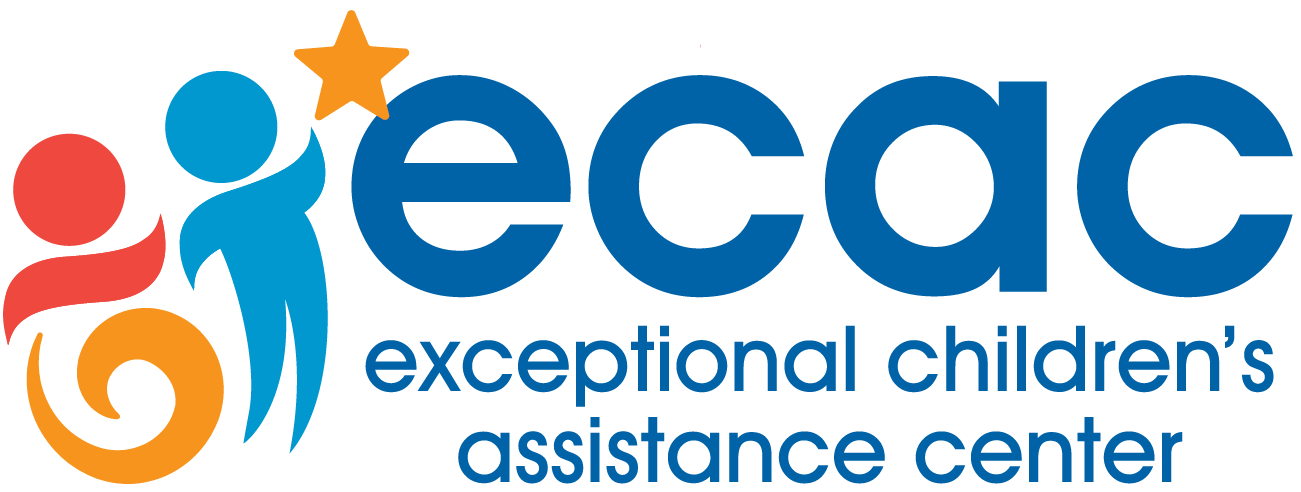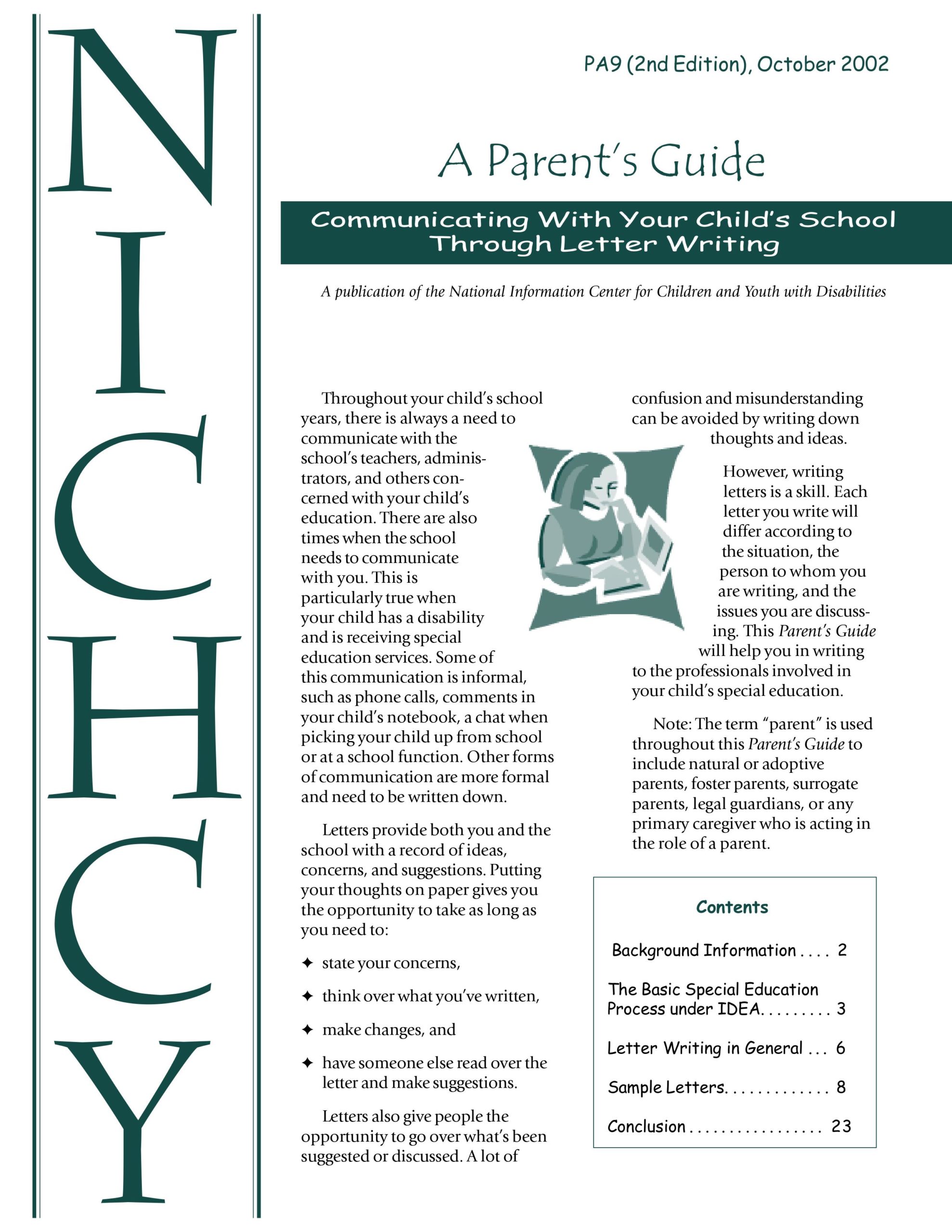
A Parent's Guide: Communicating With Your Child's School Through Letter Writing
Resource document by the National Information Center for Children and Youth with Disabilities that provides special education basics, tips for letter writing and sample letters to help parent's better communicate with their child's school.
Categories: 504, Advocacy, Communication, Family Engagement, IEP, Parent Rights, Special Education
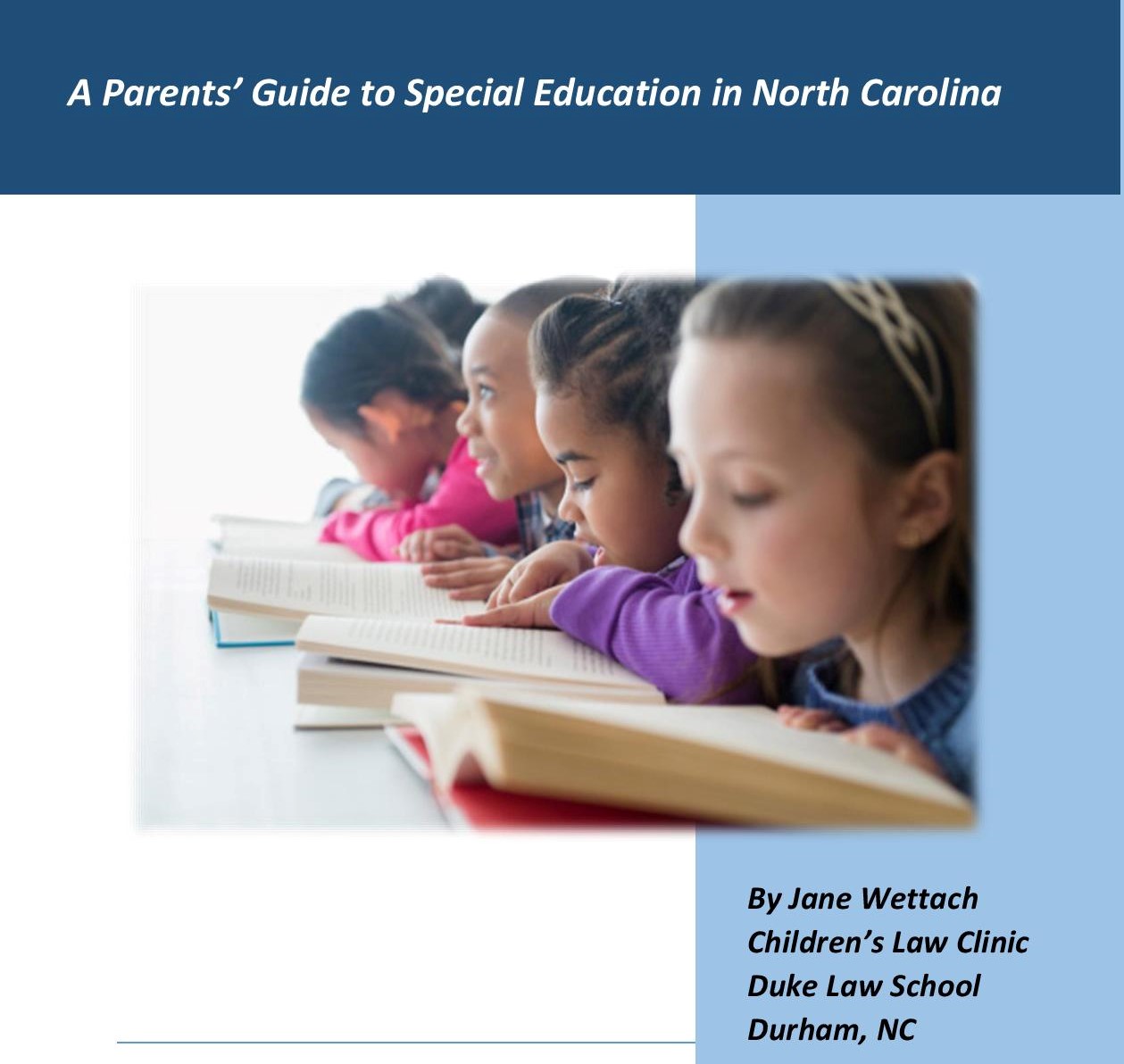
A Parents’ Guide to Special Education in North Carolina
The focus of this Parent Guide from Children’s Law Clinic -Duke Law School, is the federal special education law known as the Individuals with Disabilities Education Act (IDEA) that promises each child with a disability a “free, appropriate, public education.”
Categories: General, Communication, IEP, Conflict Resolution, Special Education
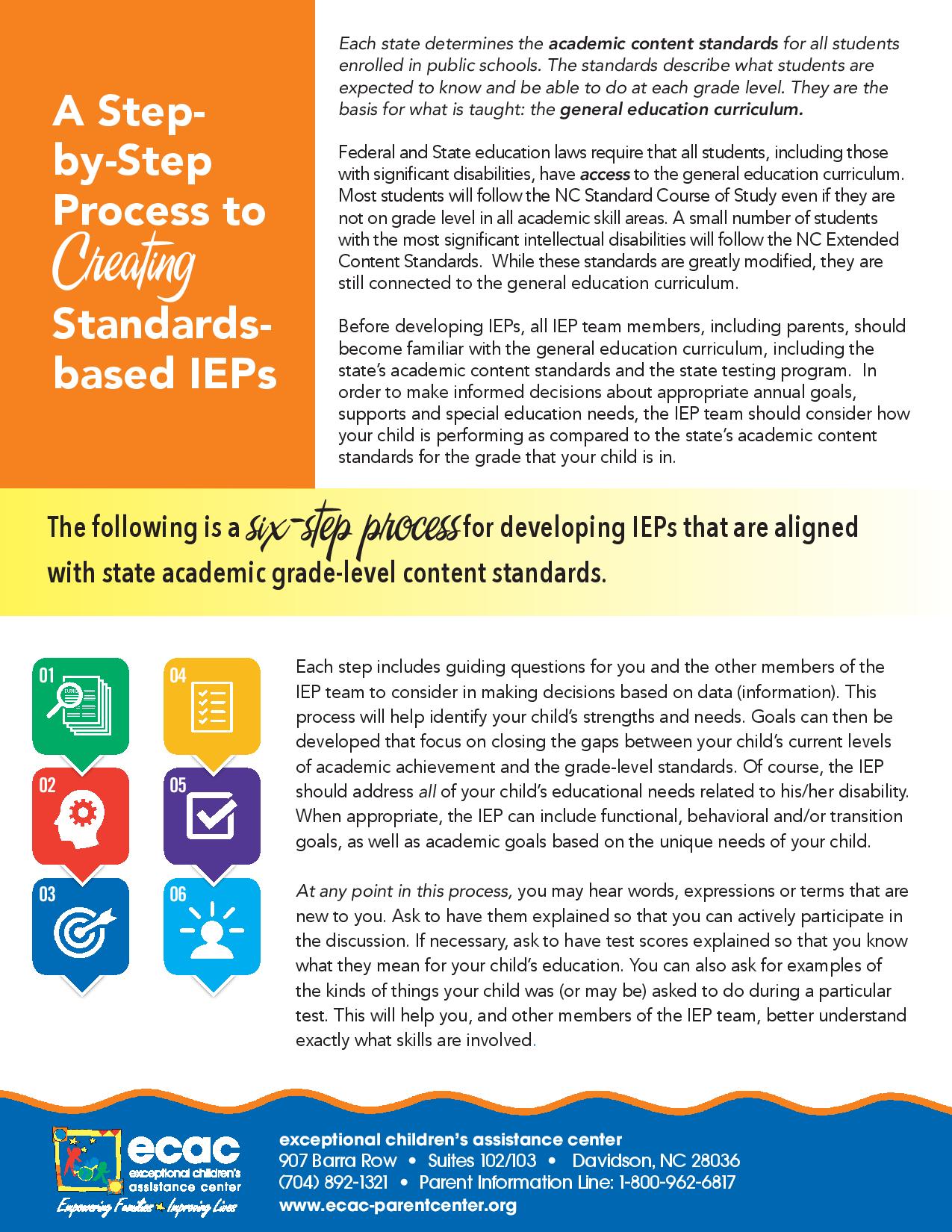
A Step by Step Process to Creating Standards based IEPs
Before developing IEPs, all IEP team members, including parents, should become familiar with the general education curriculum, including the state’s academic content standards and the state testing program. In order to make informed decisions about appropriate annual goals, supports and special education needs, the IEP team should consider how your child is performing as compared to the state’s academic content standards for the grade that your child is in.
Categories: IEP, Special Education
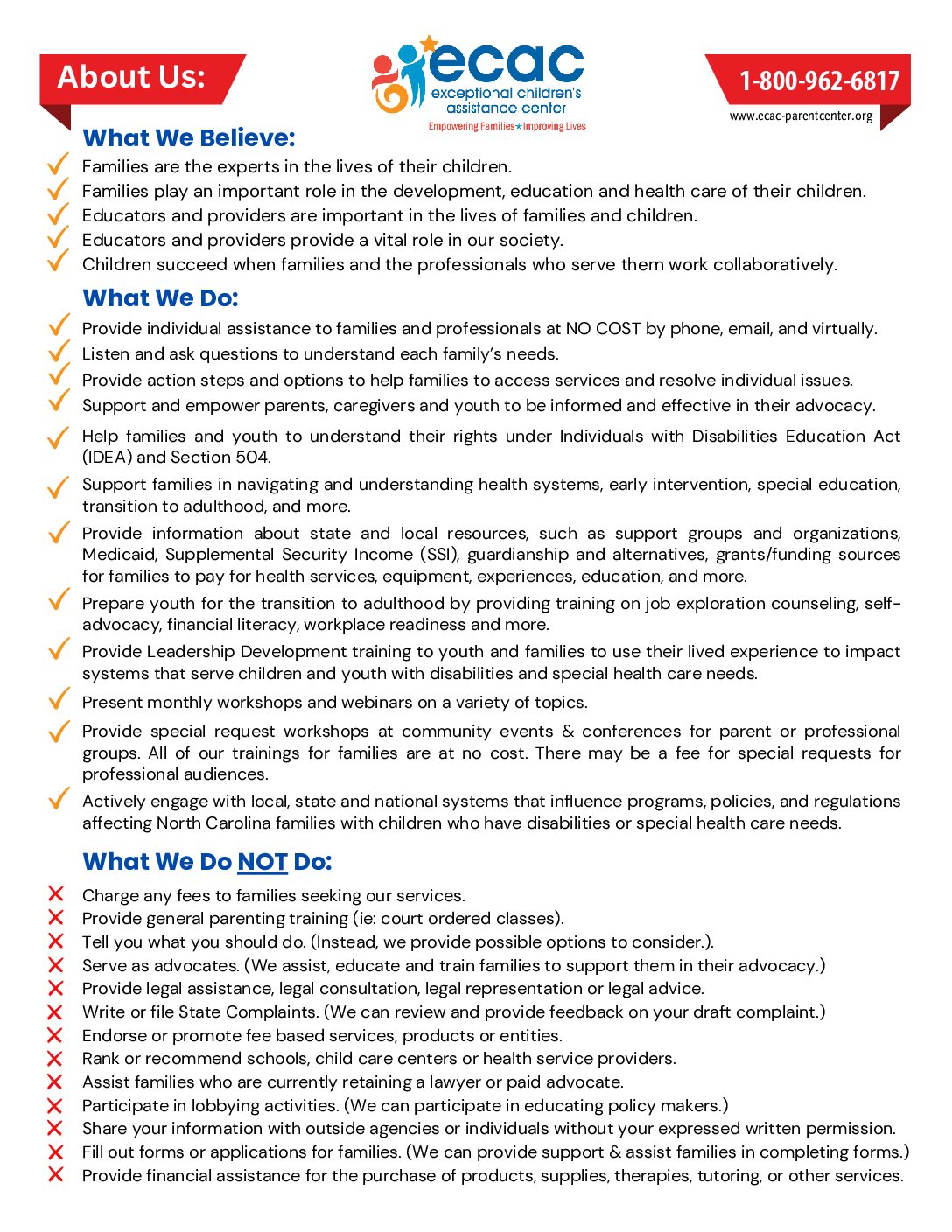
About ECAC
About ECAC - What We Believe and What we Do and Do Not Do
Categories: General, Special Education
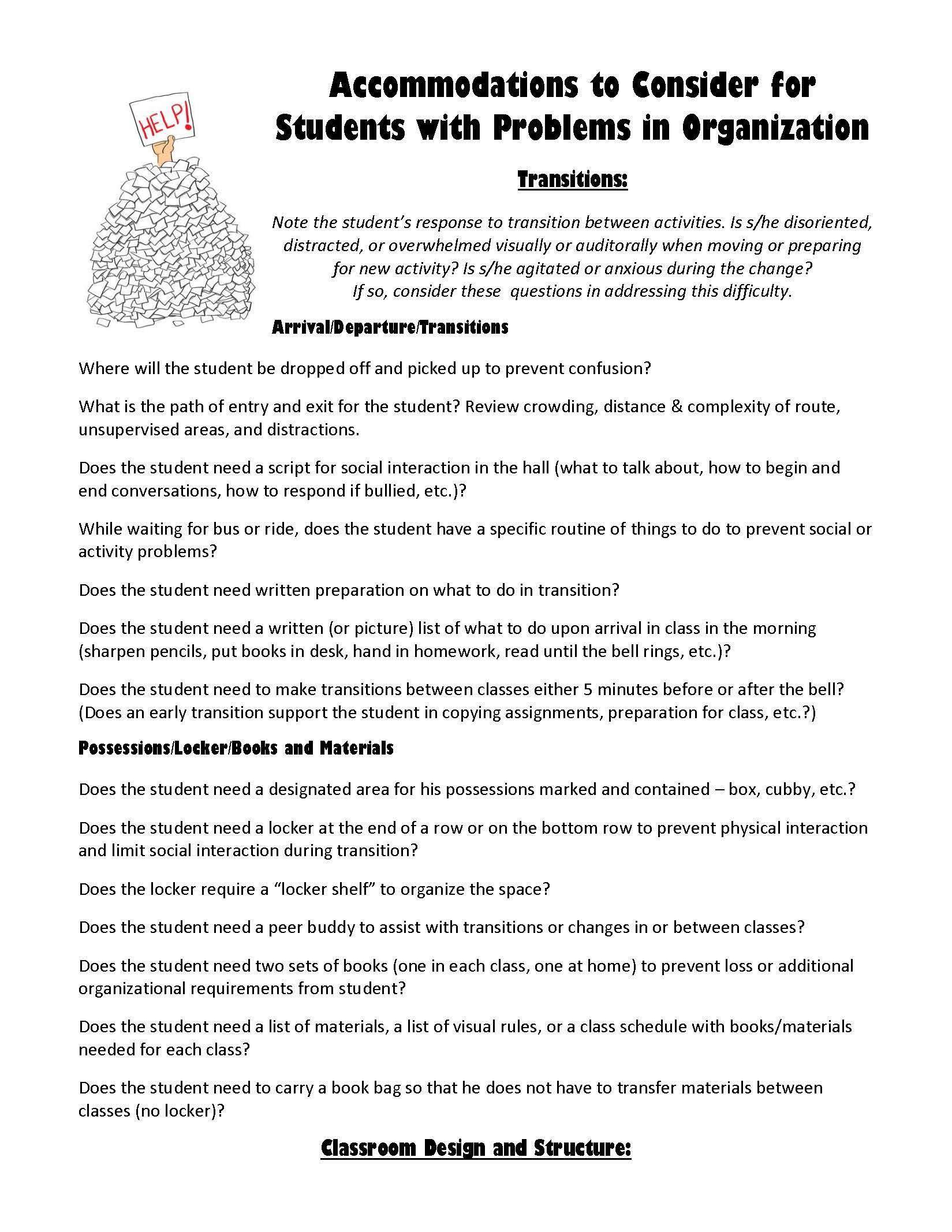
Accommodations to Consider for Students with Problems in Organization
Note the student’s response to transition between activities. Is s/he disoriented, distracted, or overwhelmed visually or auditorally when moving or preparing for new activity? Is s/he agitated or anxious during the change? If so, consider these questions in addressing this difficulty.
Categories: 504, Accommodations, IEP, Special Education
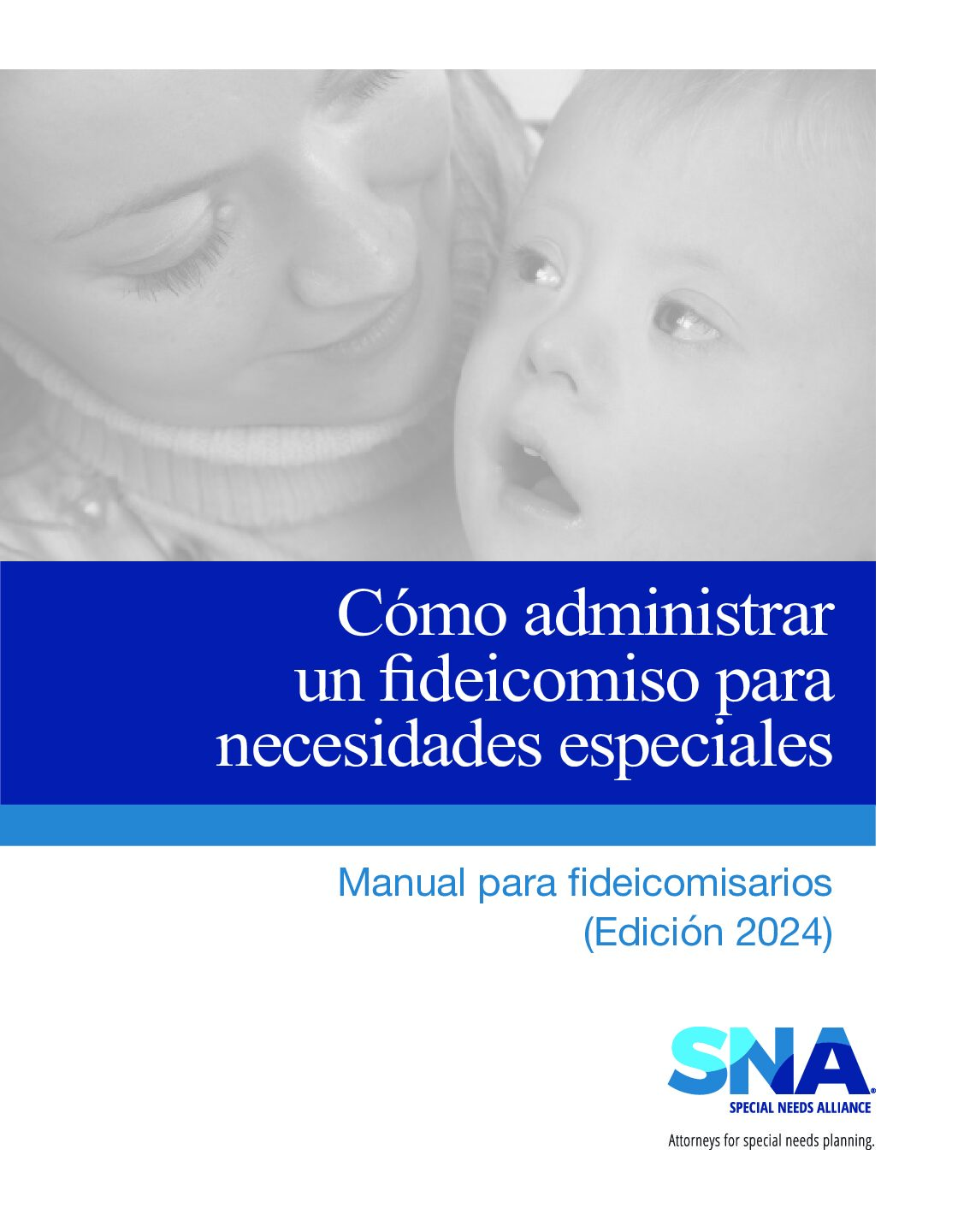
Cómo administrarun fideicomiso paranecesidades especiales: Manual para fideicomisarios (Administering a Special Needs Trust: A Handbook for Trustees)
¿Ha sido nombrado como fideicomisario de un fideicomiso para necesidades especiales? ¿Ha creado un fideicomiso para necesidades especiales y se pregunta en qué consiste realmente el trabajo de fideicomisario? ¿Es usted un beneficiario del fideicomiso y está tratando de entender qué está permitido y qué está obligado a hacer el fideicomisario? La Special Needs Alliance se complace en ofrecer su folleto gratuito sobre la administración de fideicomisos para necesidades especiales.
Categories: Spanish, Special Education
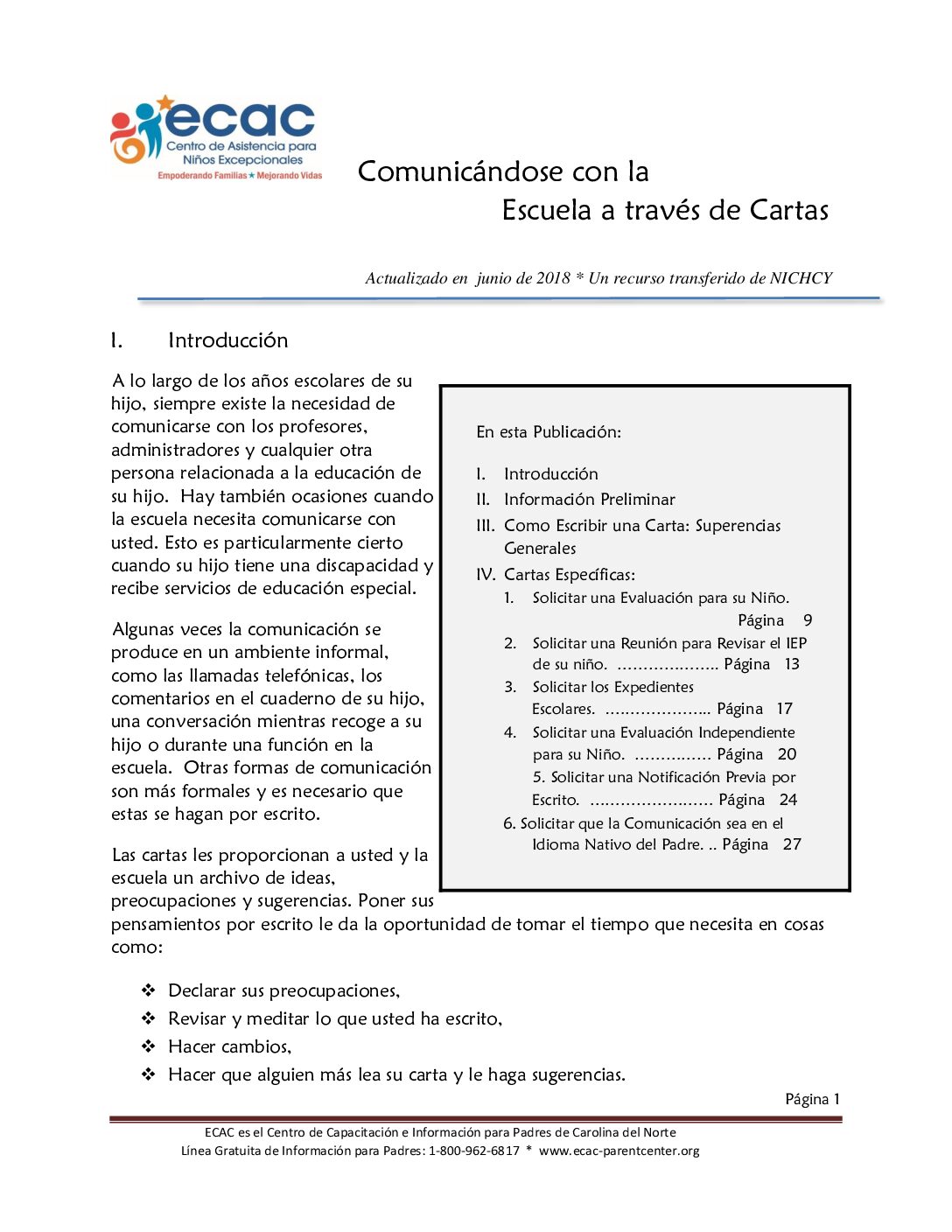
Comunicándose con la Escuela a través de Cartas (Communicating with the School Through Letters)
Categories: Communication, Spanish, Special Education
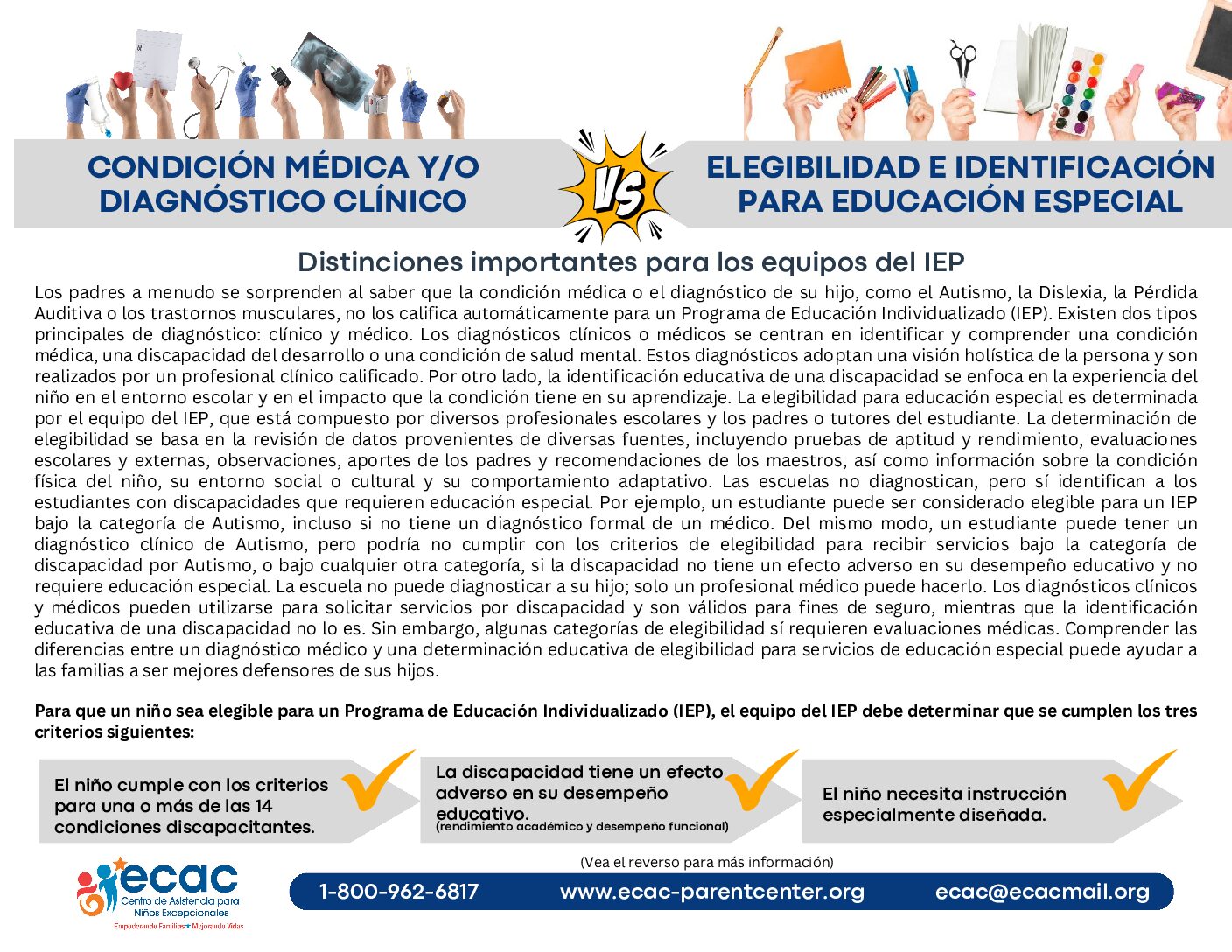
Condición Médica y/o Diagnóstico Clínico vs. Elegibilidad e Identificación para Educación Especial (Medical Condition/Clinical Diagnosis vs. Special Education Eligibility & Identification)
Los padres a menudo se sorprenden al saber que la condición médica o el diagnóstico de su hijo, como el Autismo, la Dislexia, la Pérdida Auditiva o los trastornos musculares, no los califica automáticamente para un Programa de Educación Individualizado (IEP). Existen dos tipos principales de diagnóstico: clínico y médico.
Categories: Spanish, Special Education
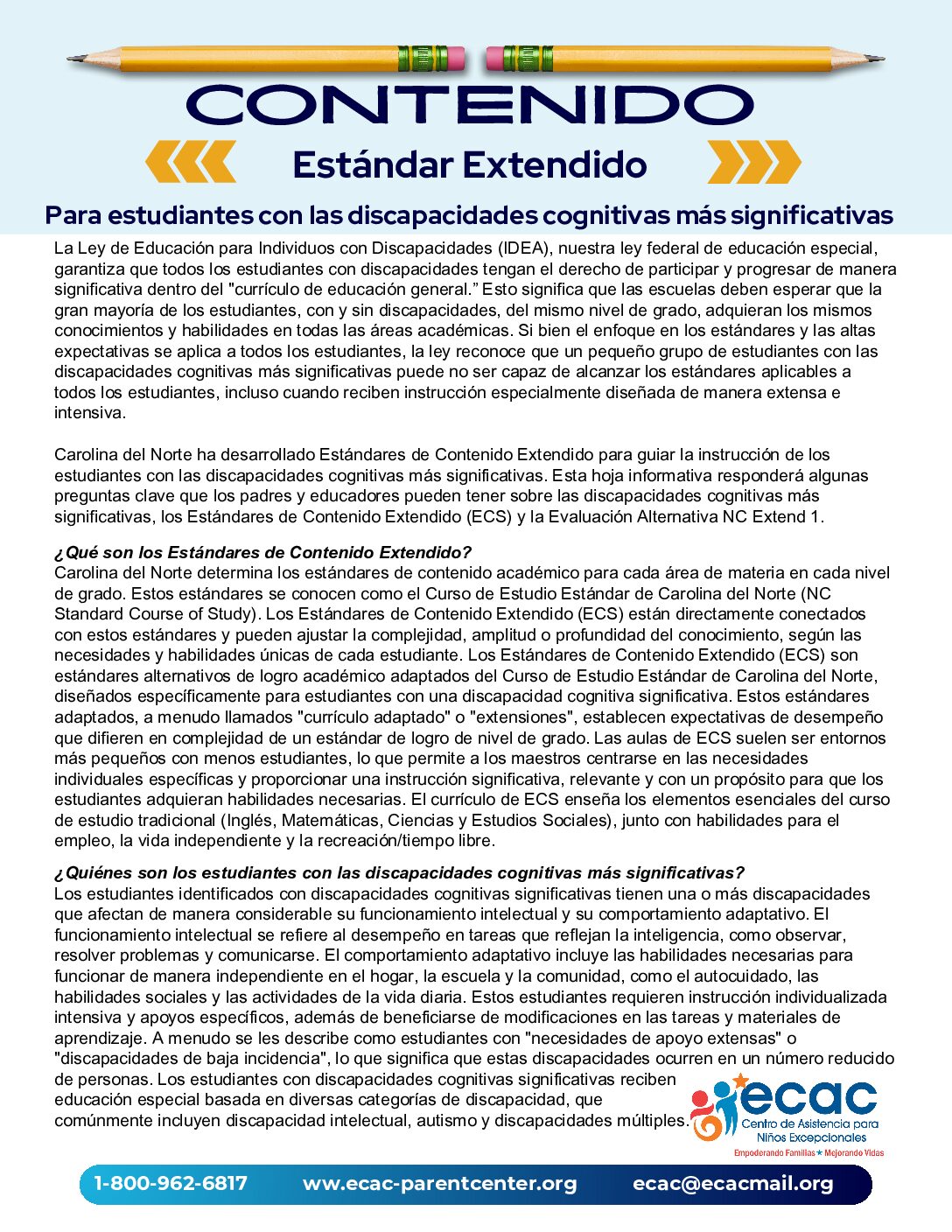
Contenido Estándar Extendido (Extended Content Standards)
Carolina del Norte ha desarrollado Estándares de Contenido Extendido para guiar la instrucción de los estudiantes con las discapacidades cognitivas más significativas. Esta hoja informativa responderá algunas preguntas clave que los padres y educadores pueden tener sobre las discapacidades cognitivas más significativas, los Estándares de Contenido Extendido (ECS) y la Evaluación Alternativa NC Extend 1.
Categories: Spanish, Special Education
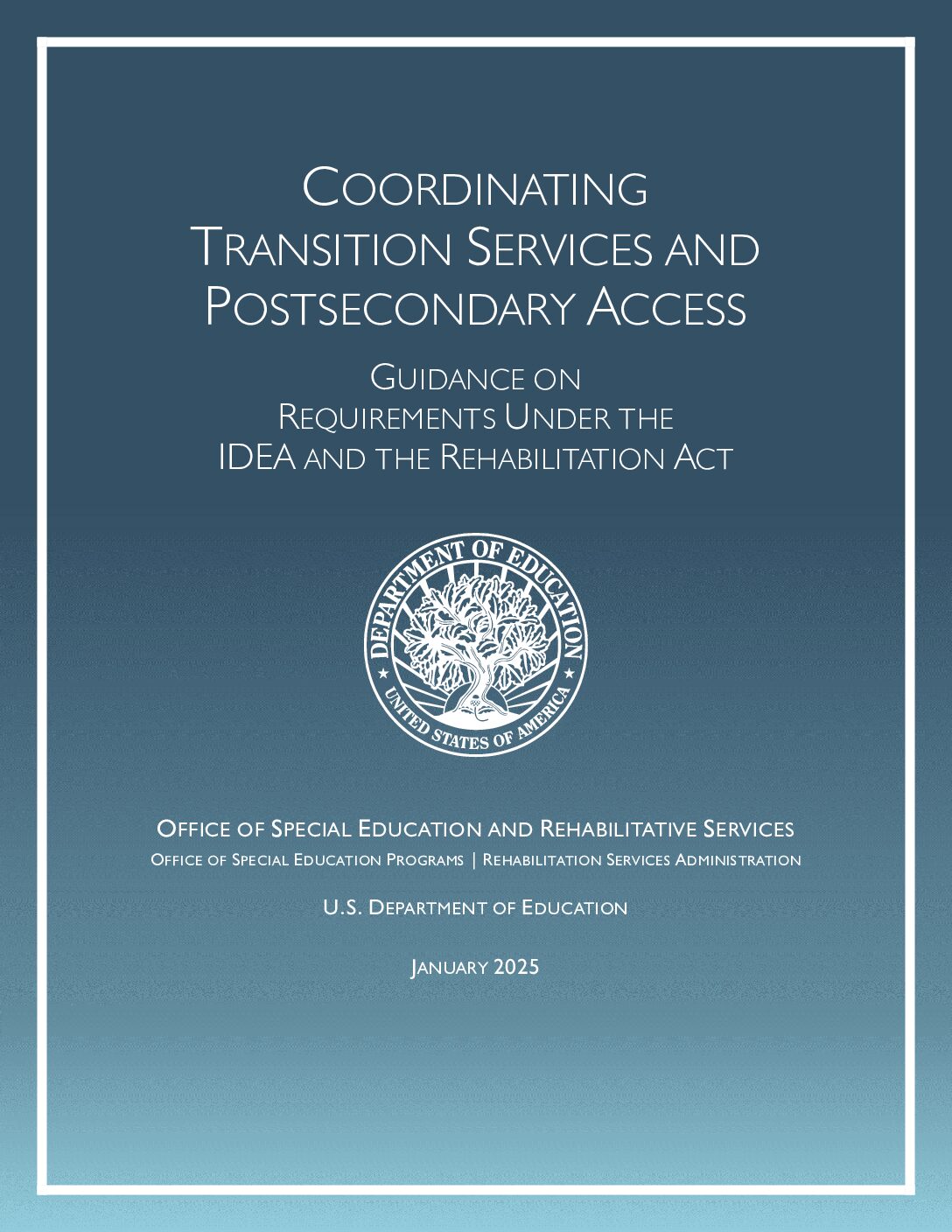
Coordinating Transition Services and Postsecondary Access
Guidance on requirements under the IDEA and the Rehabilitation Act - U.S. Department of Education, Office of Special Education and Rehabilitative Services
Categories: Special Education, Transition to Adulthood
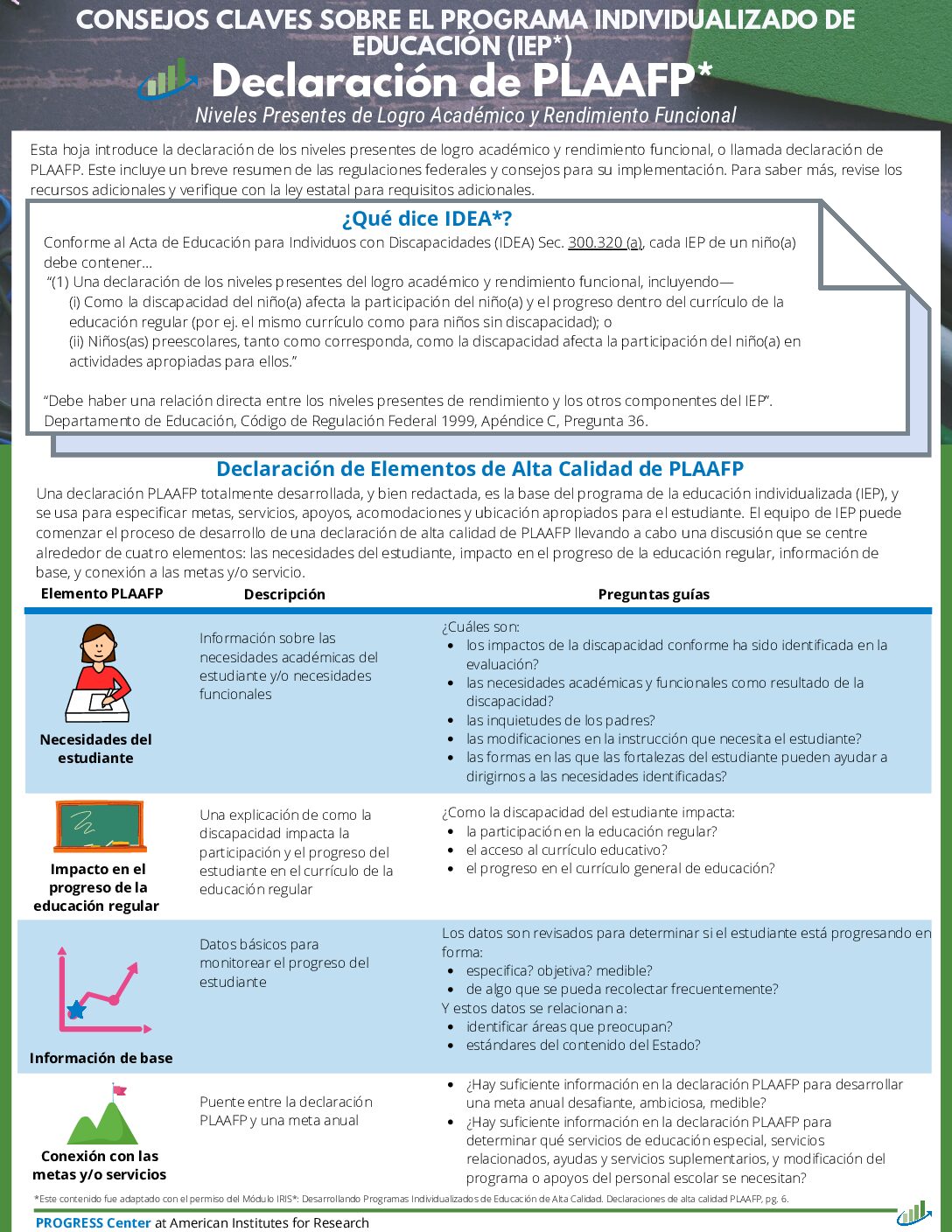
Declaración de PLAAFP (PLAAFP Statement Spanish Version)
Categories: IEP, Spanish, Special Education
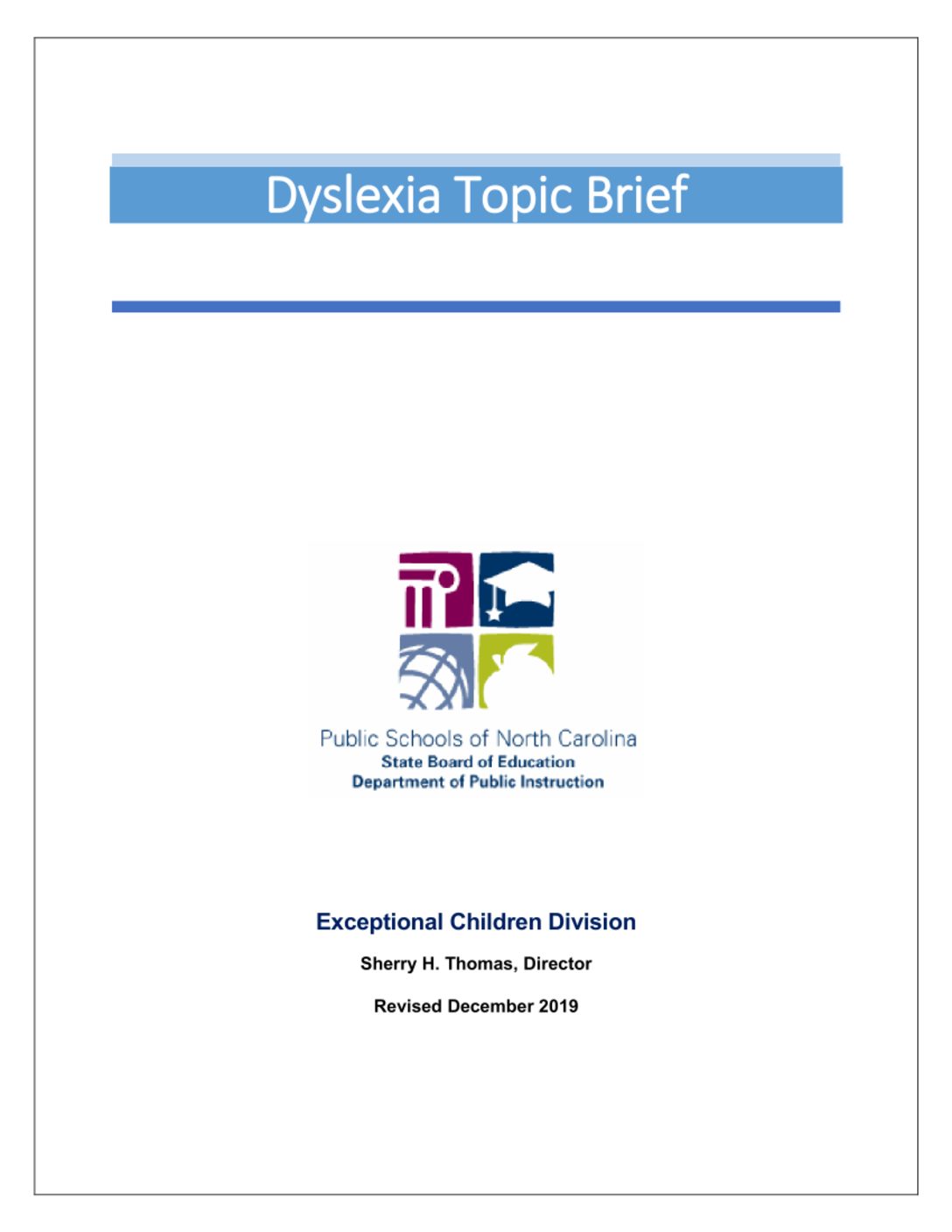
Dyslexia Topic Brief
This Topic Brief by the NC Department of Public Instruction's Exceptional Children Division addresses the common myths about dyslexia in NC Schools.
Categories: Dyslexia, Learning Disability, Special Education
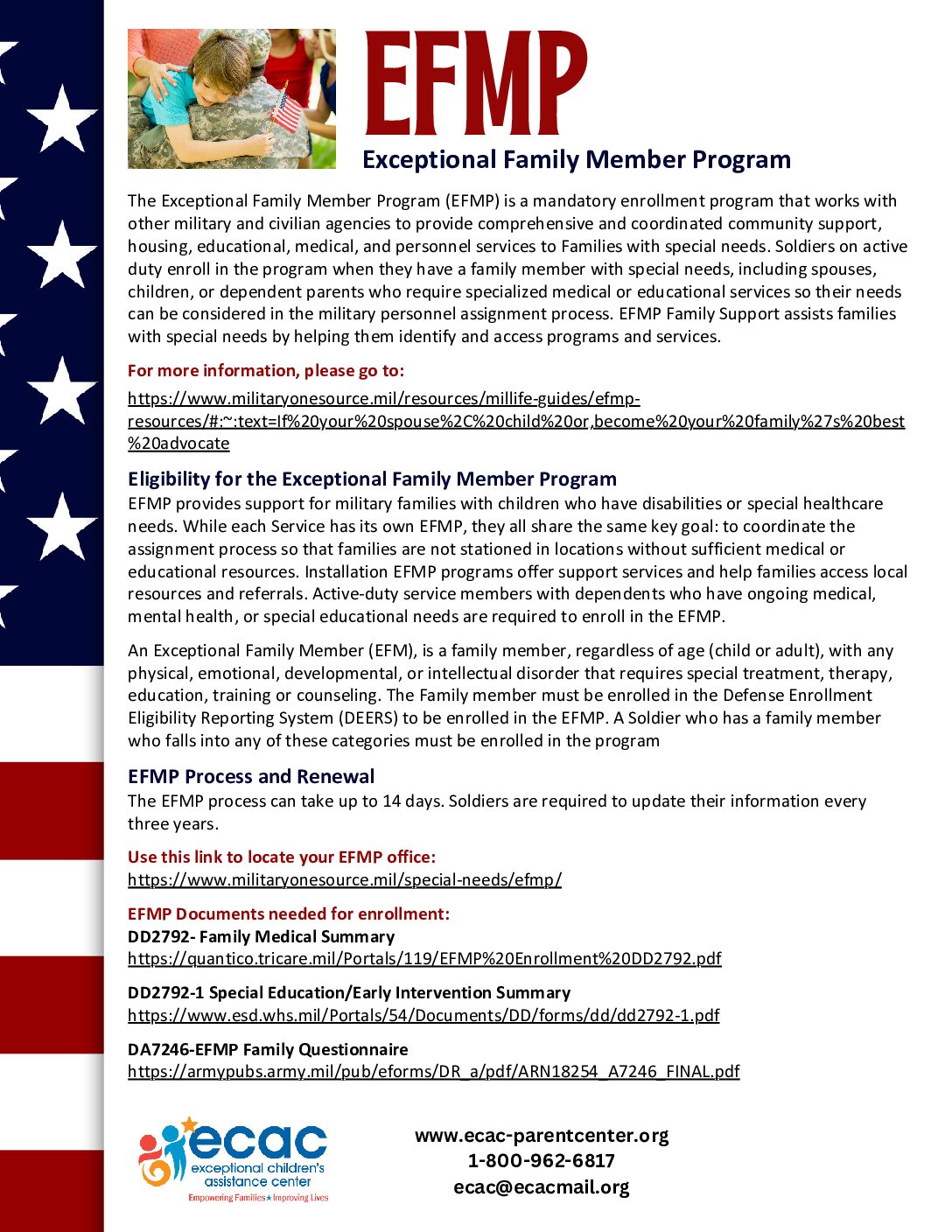
EFMP: Exceptional Family Member Program
The Exceptional Family Member Program (EFMP) is a mandatory enrollment program that works with other military and civilian agencies to provide comprehensive and coordinated community support, housing, educational, medical, and personnel services to Families with special needs.
Categories: Military, Special Education
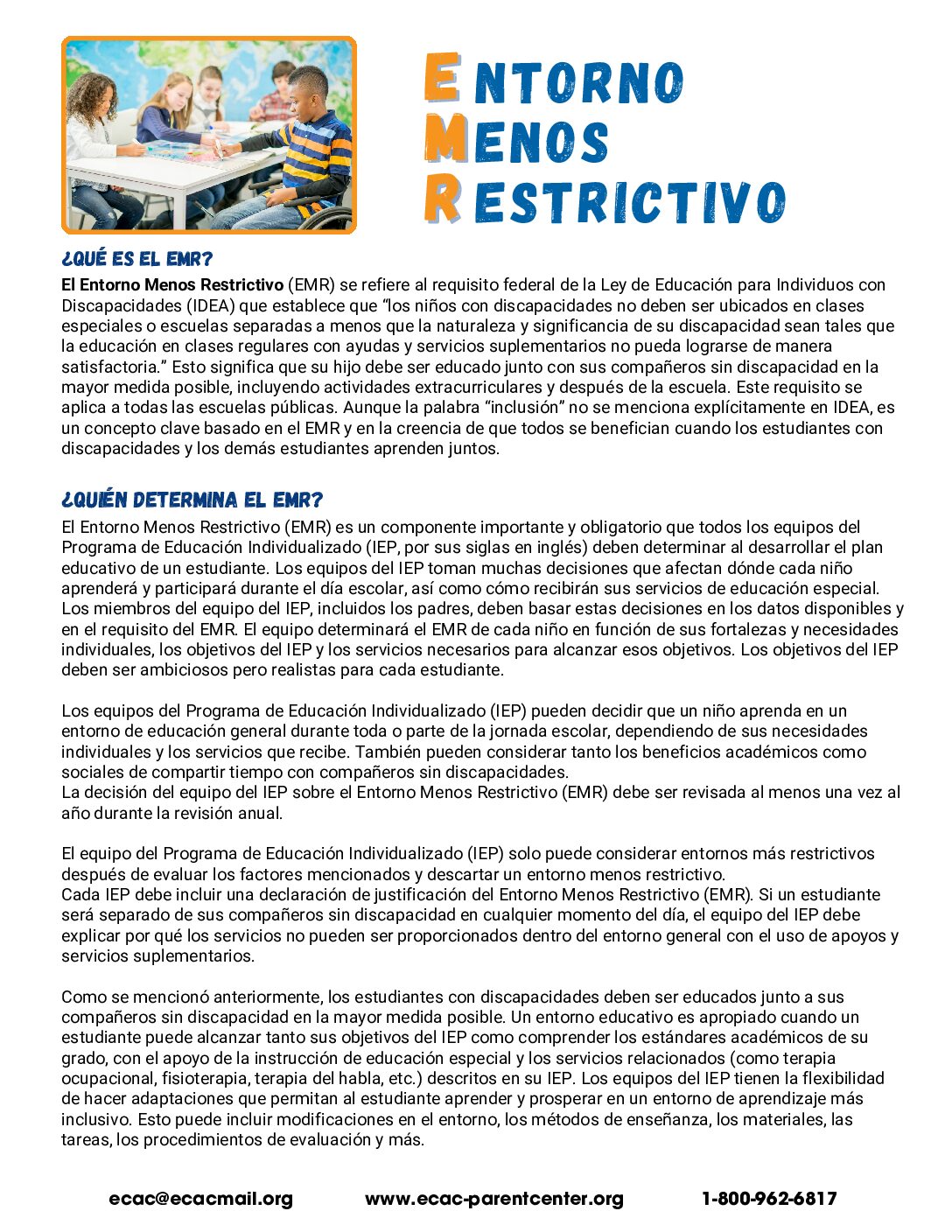
Entorno Menos Restrictivo (Least Restrictive Environment)
El Entorno Menos Restrictivo (EMR) se refiere al requisito federal de la Ley de Educación para Individuos con Discapacidades (IDEA) que establece que “los niños con discapacidades no deben ser ubicados en clases especiales o escuelas separadas a menos que la naturaleza y significancia de su discapacidad sean tales que la educación en clases regulares con ayudas y servicios suplementarios no pueda lograrse de manera satisfactoria.”
Categories: Spanish, Special Education
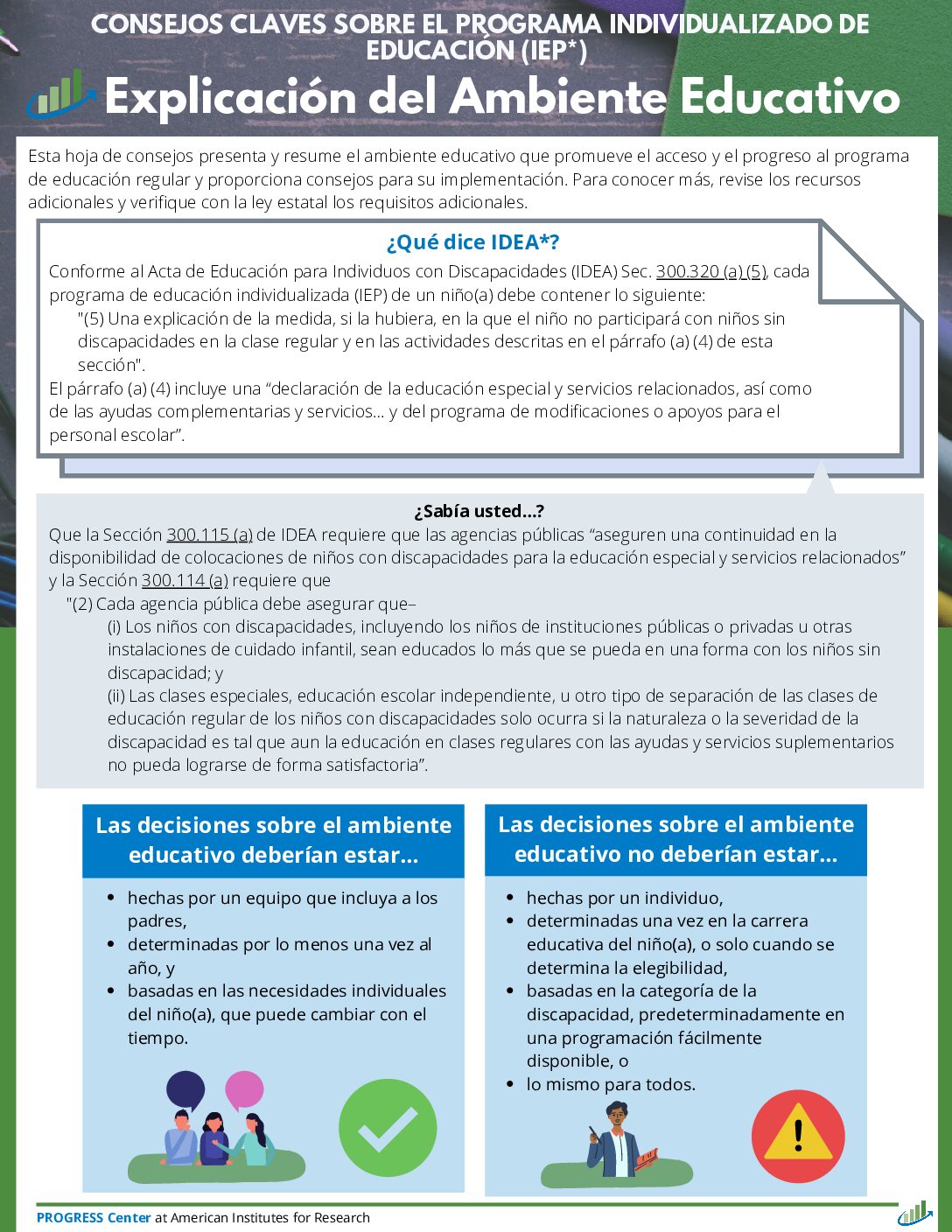
Explicación del Ambiente Educativo (Explanation of Educational Setting Spanish Version)
Categories: IEP, Spanish, Special Education
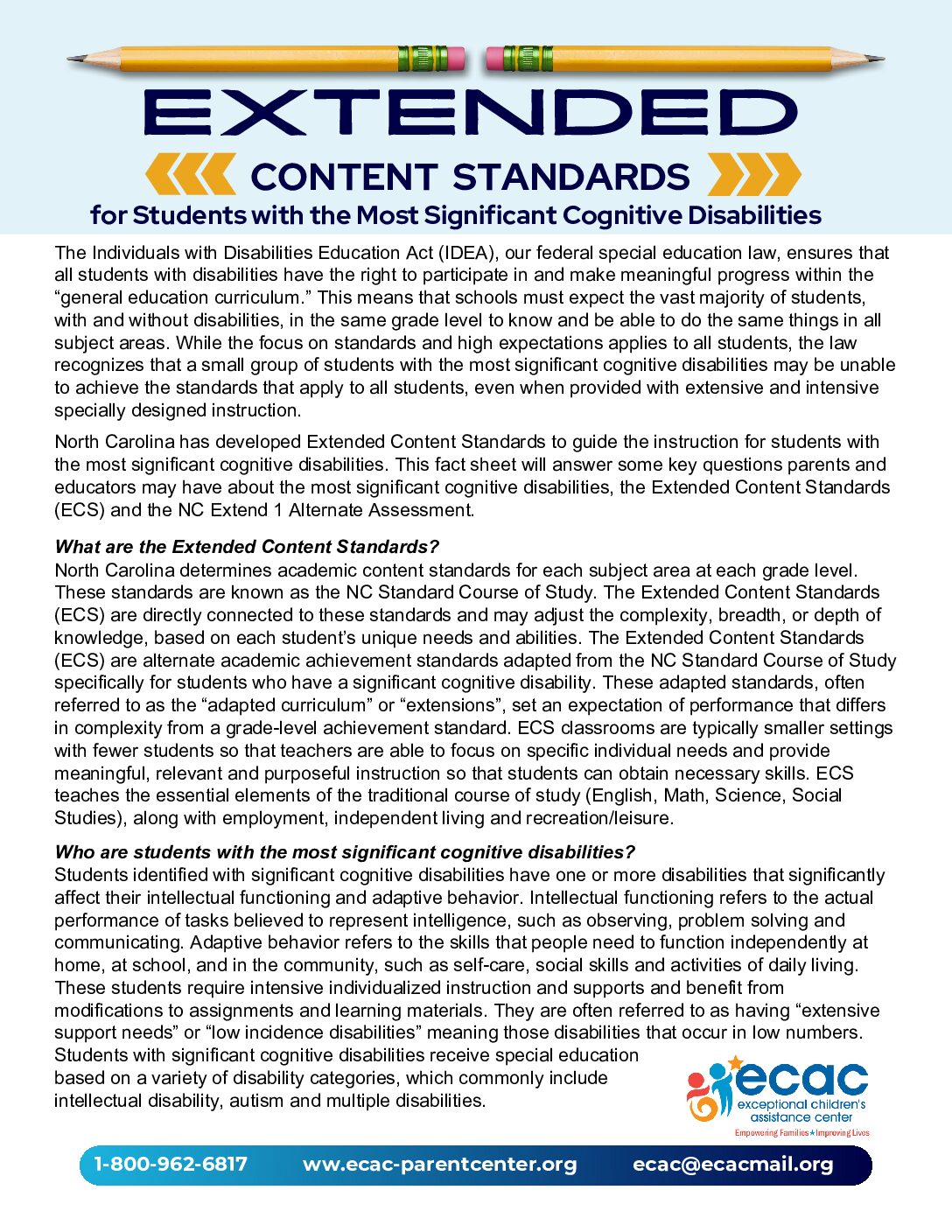
Extended Content Standards Fact Sheet
North Carolina has developed Extended Content Standards to guide the instruction for students with the most significant cognitive disabilities. This fact sheet will answer some key questions parents and educators may have about the most significant cognitive disabilities, the Extended Content Standards (ECS) and the NC Extend 1 Alternate Assessment.
Categories: Special Education
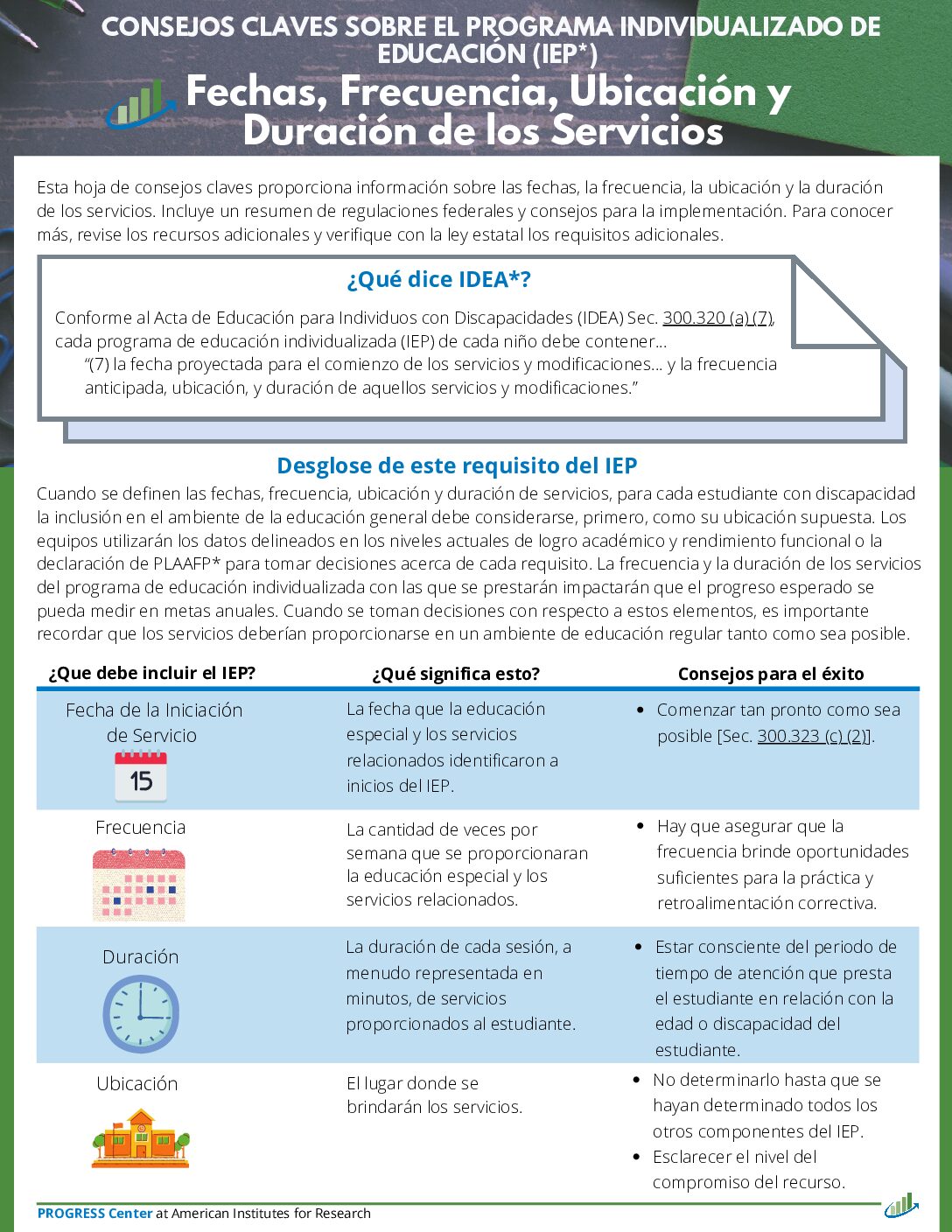
Fechas, Frecuencia, Ubicación y Duración de los Servicios (Dates, Frequency, Location and Duration of Services Spanish Version)
Categories: IEP, Spanish, Special Education
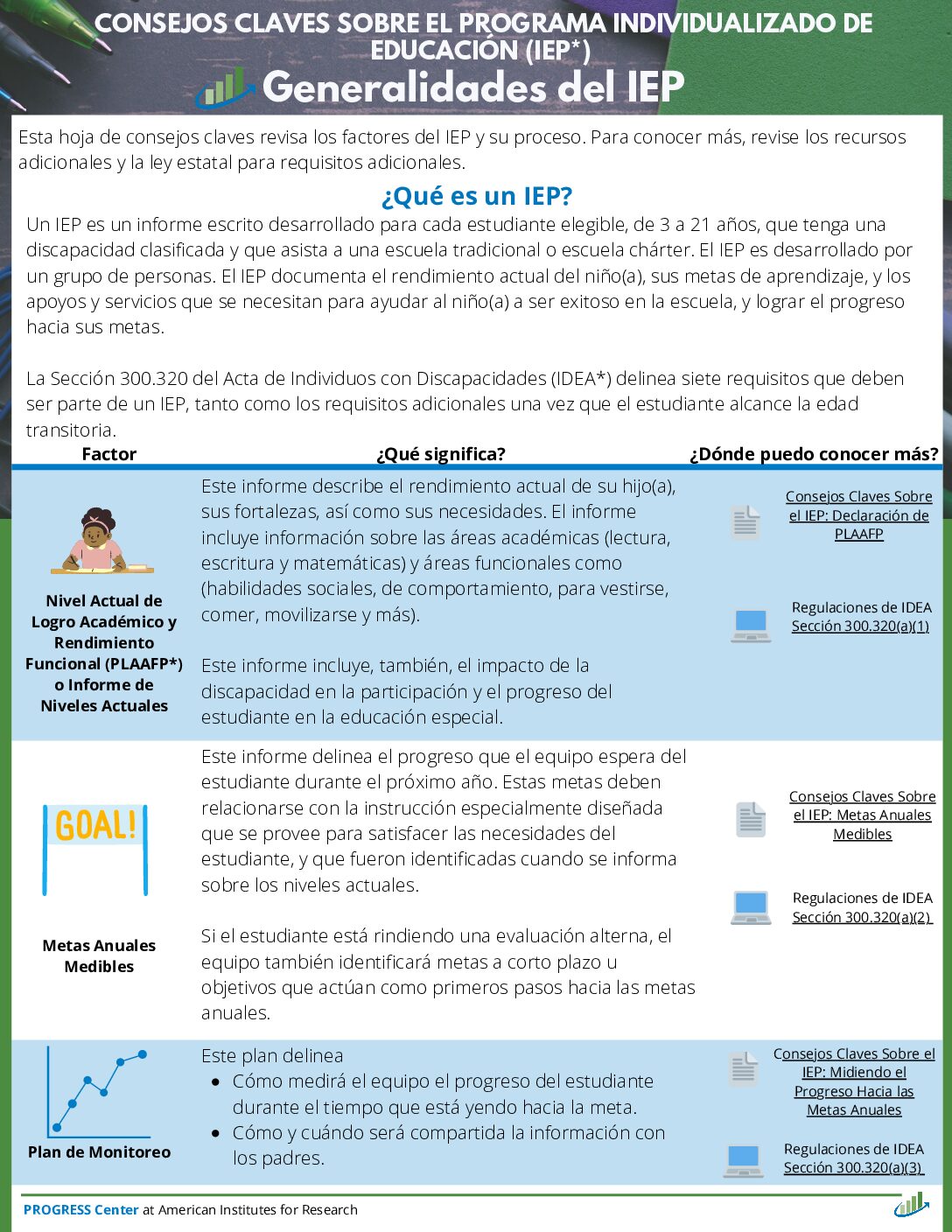
Generalidades del IEP (Overview of the IEP Spanish Version)
Categories: IEP, Spanish, Special Education
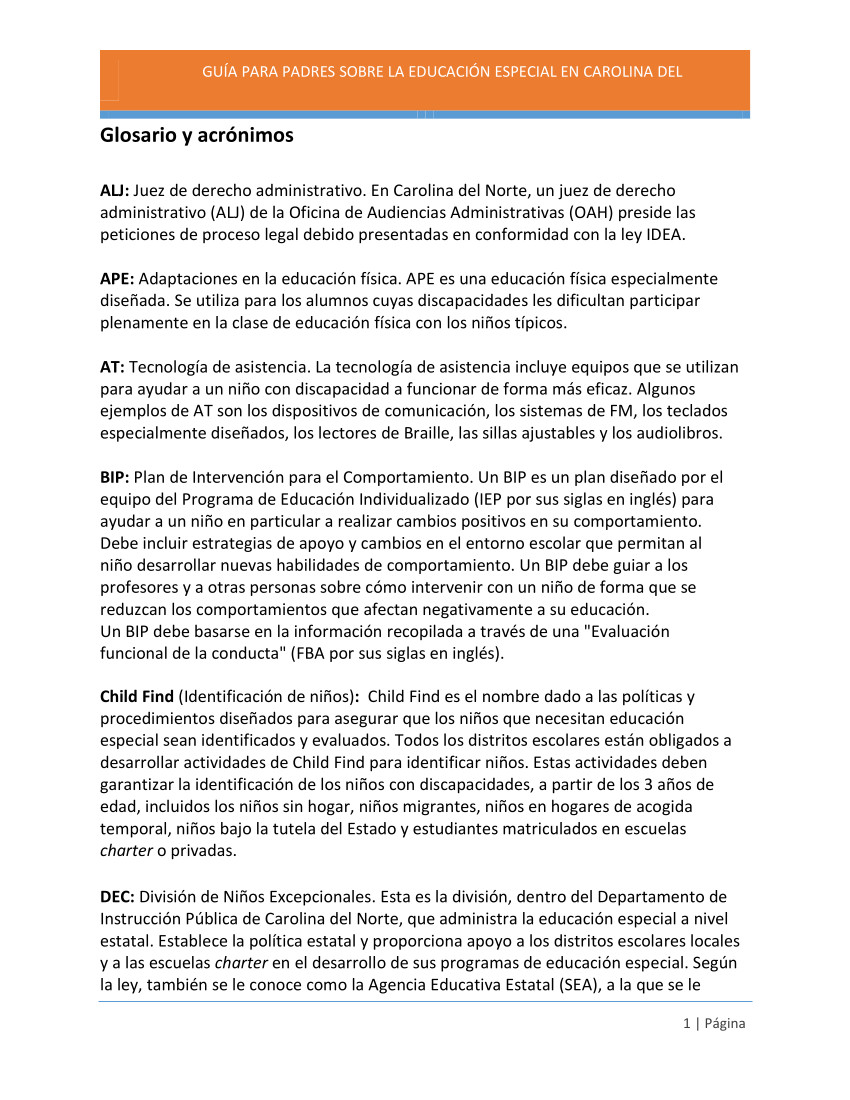
GUÍA PARA PADRES SOBRE LA EDUCACIÓN ESPECIAL EN CAROLINA DEL - Glosario y acrónimos (Parent Guide to Special Education in North Carolina – Glossary and Acronyms)
GUÍA PARA PADRES SOBRE LA EDUCACIÓN ESPECIAL EN CAROLINA DEL - Glosario y acrónimos
Categories: IDEA, IEP, Parent Rights, Spanish, Special Education
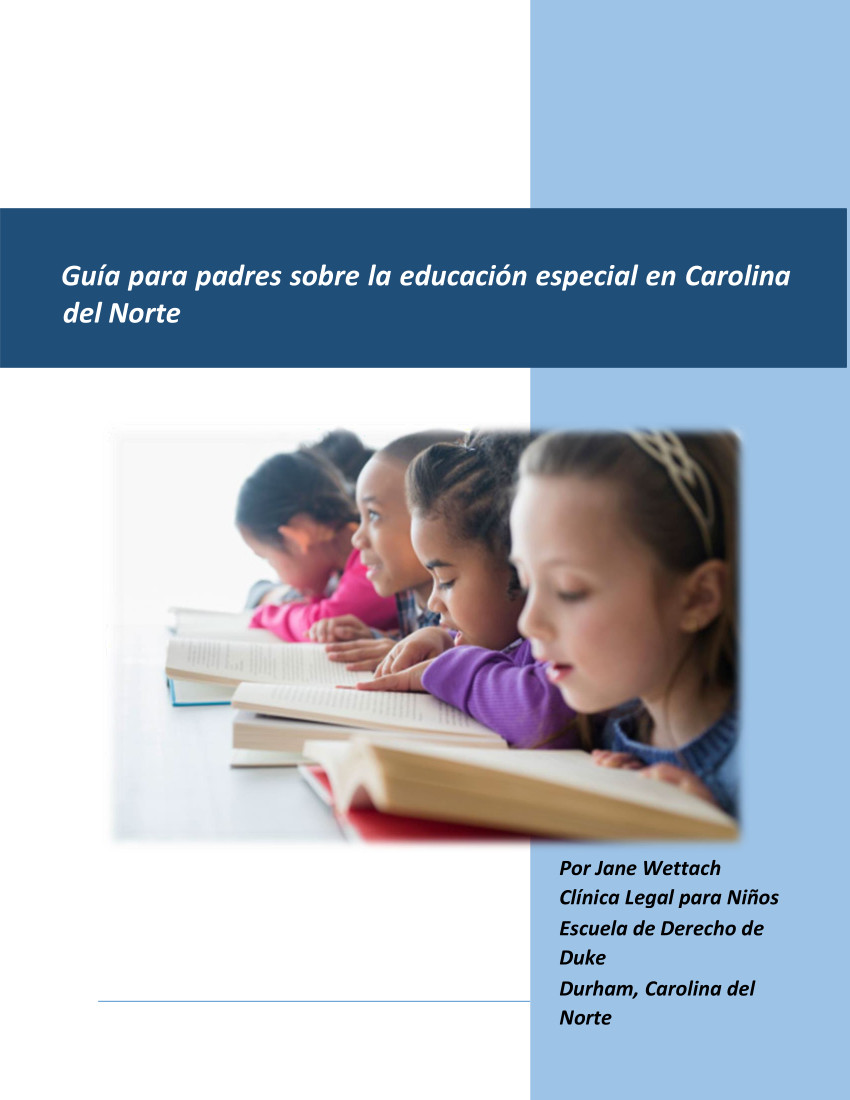
Guía para padres sobre la educación especial en Carolina del Norte (Parent Guide to Special Education in North Carolina)
La Guía se centra en la ley federal de educación especial conocida como Ley de Educación para Individuos con Discapacidades (IDEA, por sus siglas en inglés), que garantiza a todos los niños con discapacidades una "educación pública, gratuita y apropiada".
Categories: IDEA, IEP, Parent Rights, Spanish, Special Education
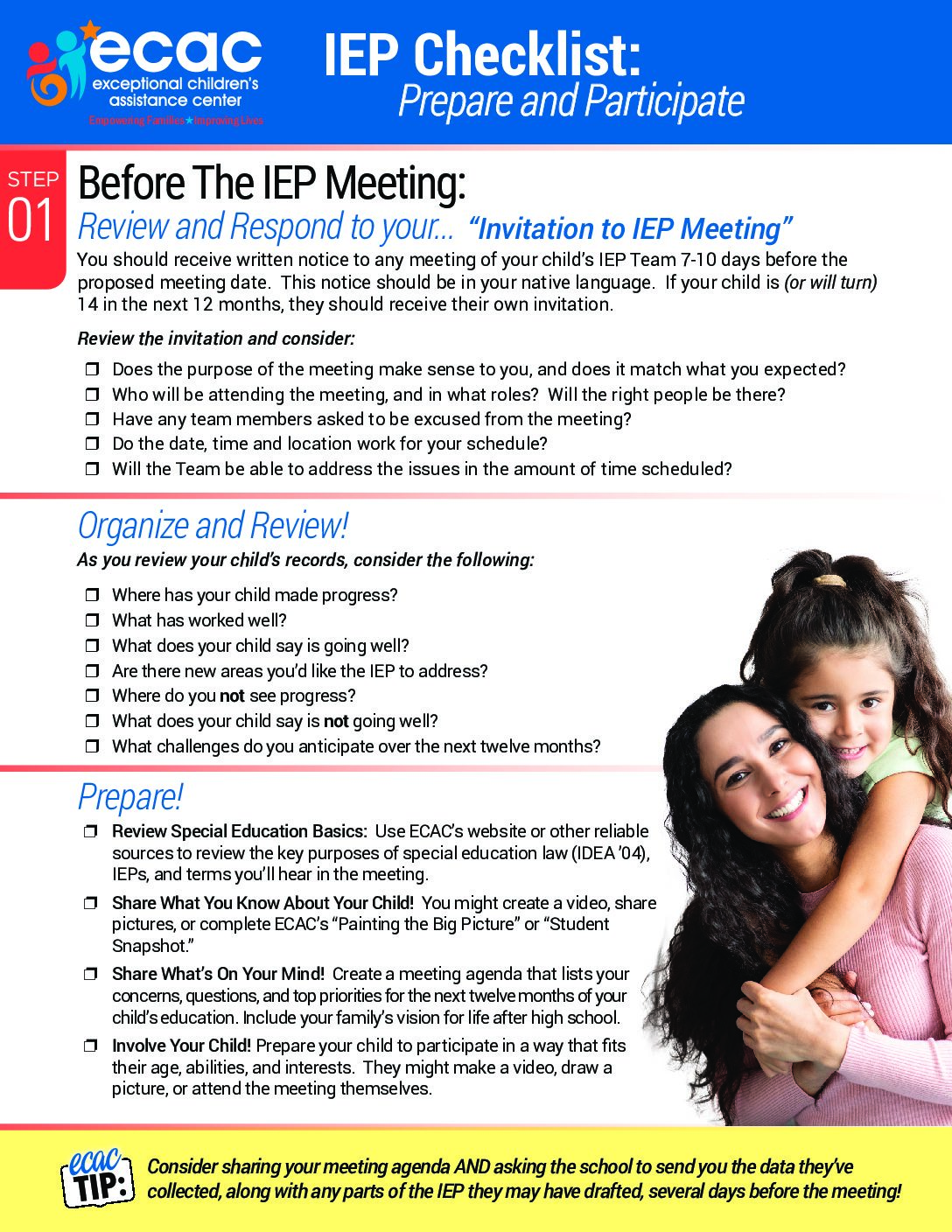
IEP Checklist
Check out these tips to prepare for your next IEP meeting!
Categories: Advocacy, IEP, Special Education
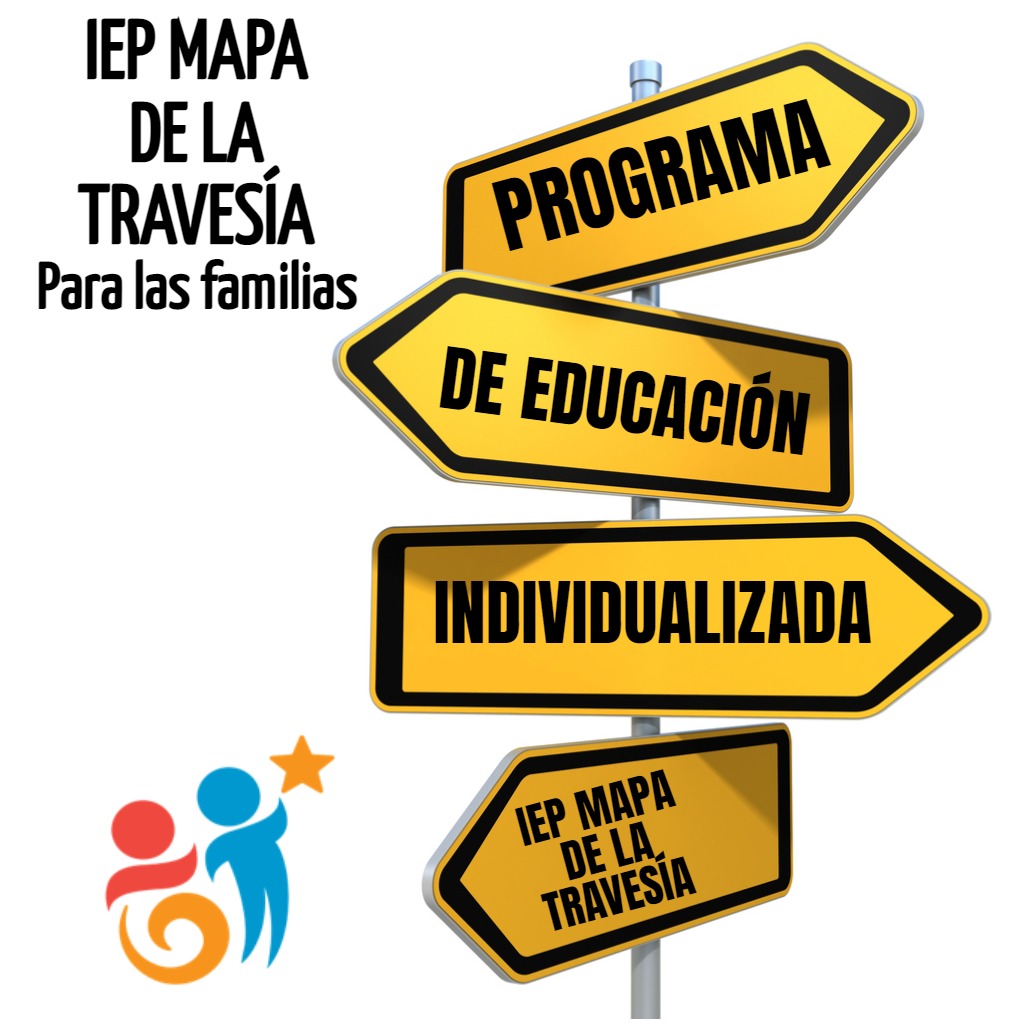
IEP MAPA DE LA TRAVESÍA - Para las familias (IEP Road Map – For Families)
IEP MAPA DE LA TRAVESÍA - Para las familias
Categories: IEP, Spanish, Special Education
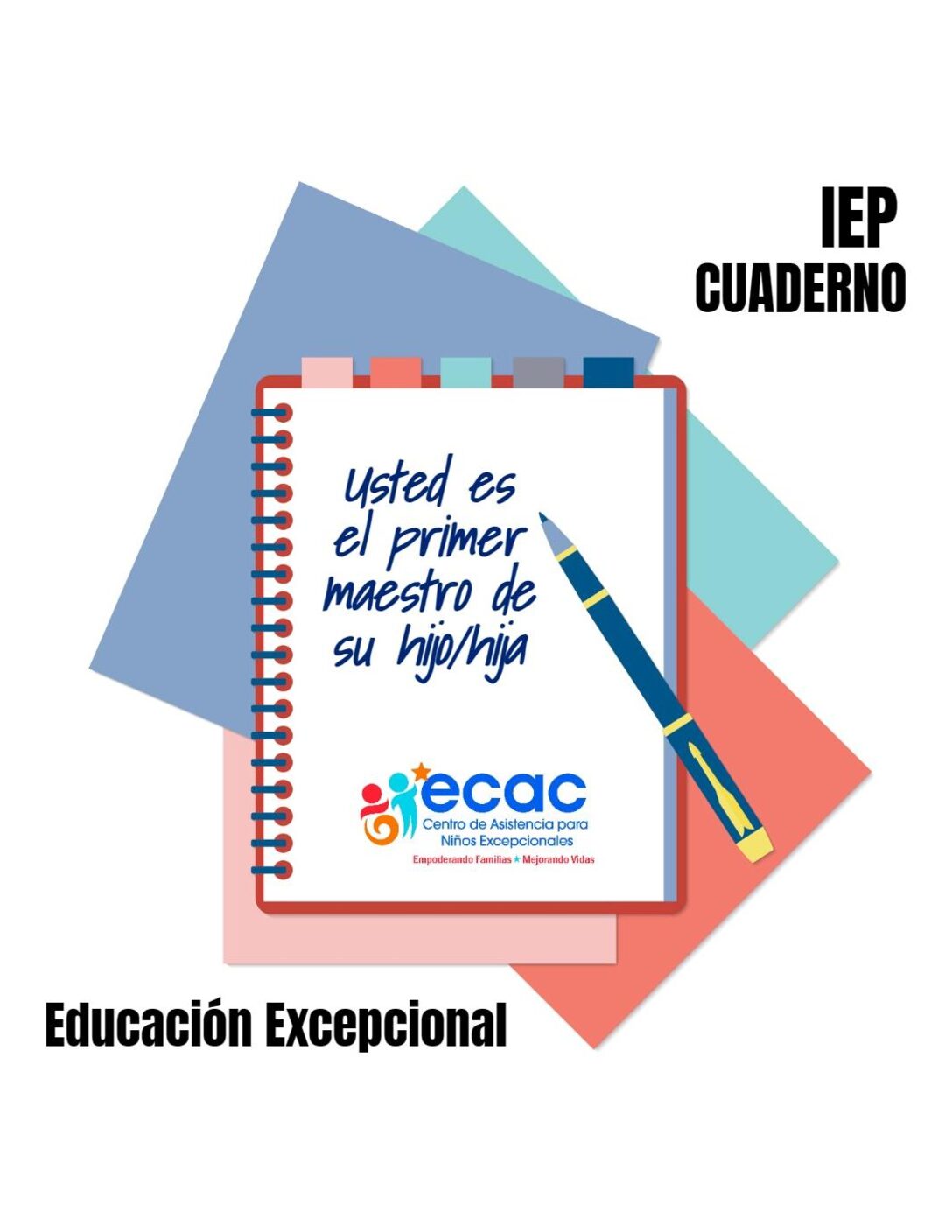
IEP Notebook/IEP Cuaderno
IEP Cuaderno Su participación en el desarrollo de un Programa de Educación Individualizado (IEP por sus siglas en inglés) que sea efectivo y adecuado es esencial para el éxito de su hijo(a). Aunque el típico IEP normalmente cubre un período de 12 meses, cada IEP ayuda a consolidar la base para el futuro en la vida de su hijo. Piense en el adulto en el que su hijo se convertirá. Al planear, piense más allá de estos doce meses por venir. Considere su participación como un proceso de tres pasos.
Categories: IEP, Spanish, Special Education
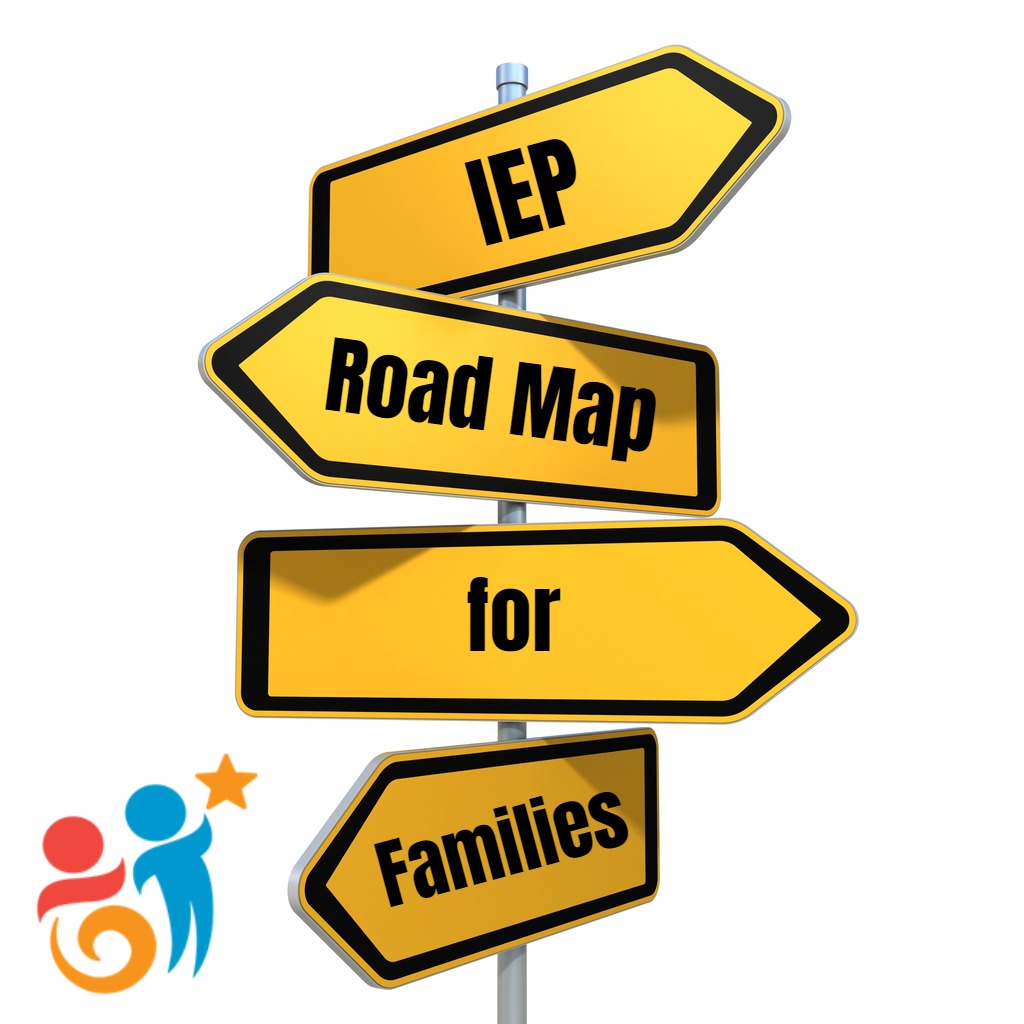
IEP Road Map for Families
A guide featuring the North Carolina IEP forms and useful tips for parents along the way.
Categories: IEP, Special Education, Transition to Adulthood
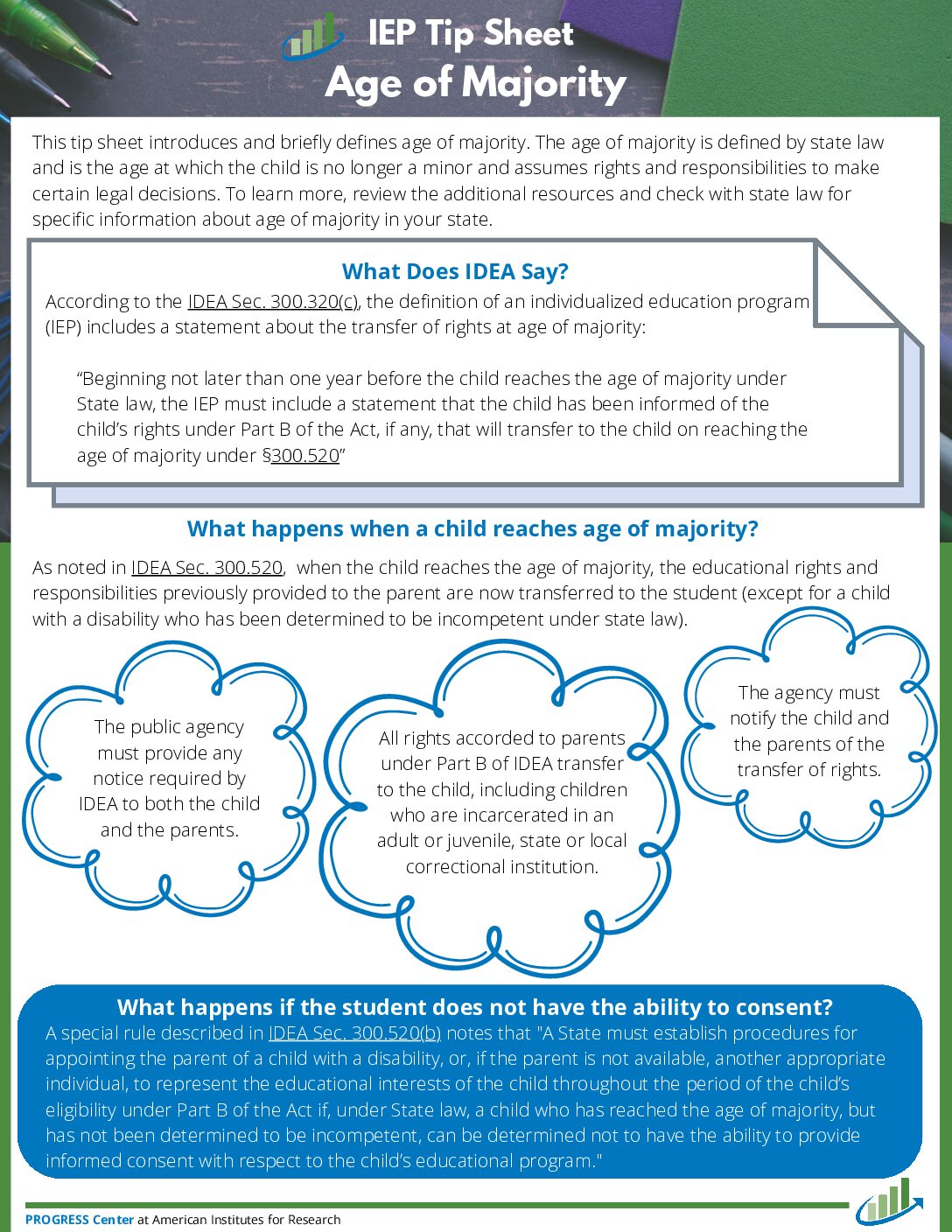
IEP Tip Sheet: Age of Majority
This tip sheet introduces and briefly defines age of majority. The age of majority is defined by state law and is the age at which the child is no longer a minor and assumes rights and responsibilities to make certain legal decisions. To learn more, review the additional resources and check with state law for specific information about age of majority in your state.
Categories: IEP, Special Education, Transition to Adulthood, Transitions
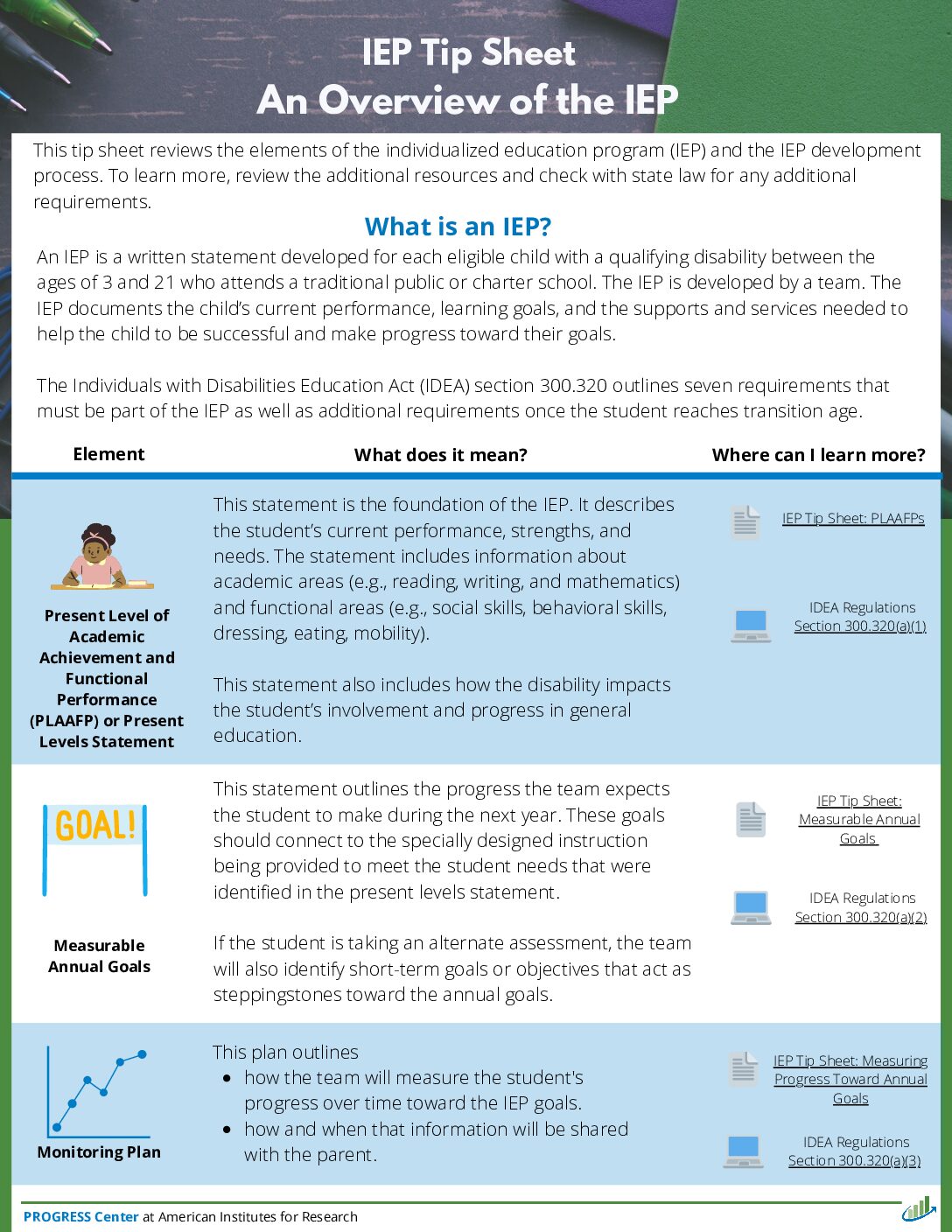
IEP Tip Sheet: An Overview of the IEP
This tip sheet reviews the elements of the individualized education program (IEP) and the IEP development process. To learn more, review the additional resources and check with state law for any additional requirements.
Categories: IEP, Special Education
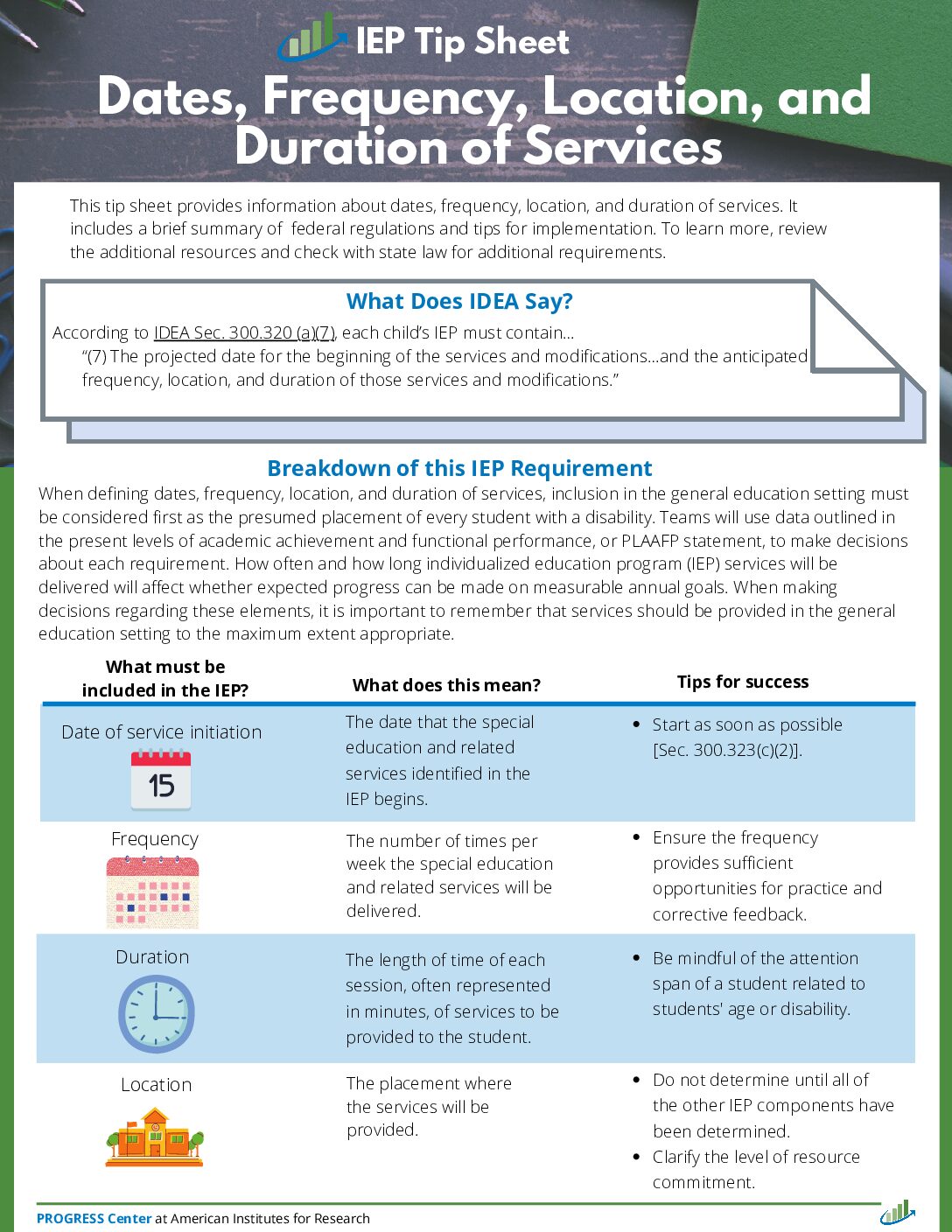
IEP Tip Sheet: Dates, Frequency, Location and Duration of Services
This tip sheet provides information about dates, frequency, location, and duration of services. It includes a brief summary of federal regulations and tips for implementation. To learn more, review the additional resources and check with state law for additional requirements.
Categories: IEP, Special Education
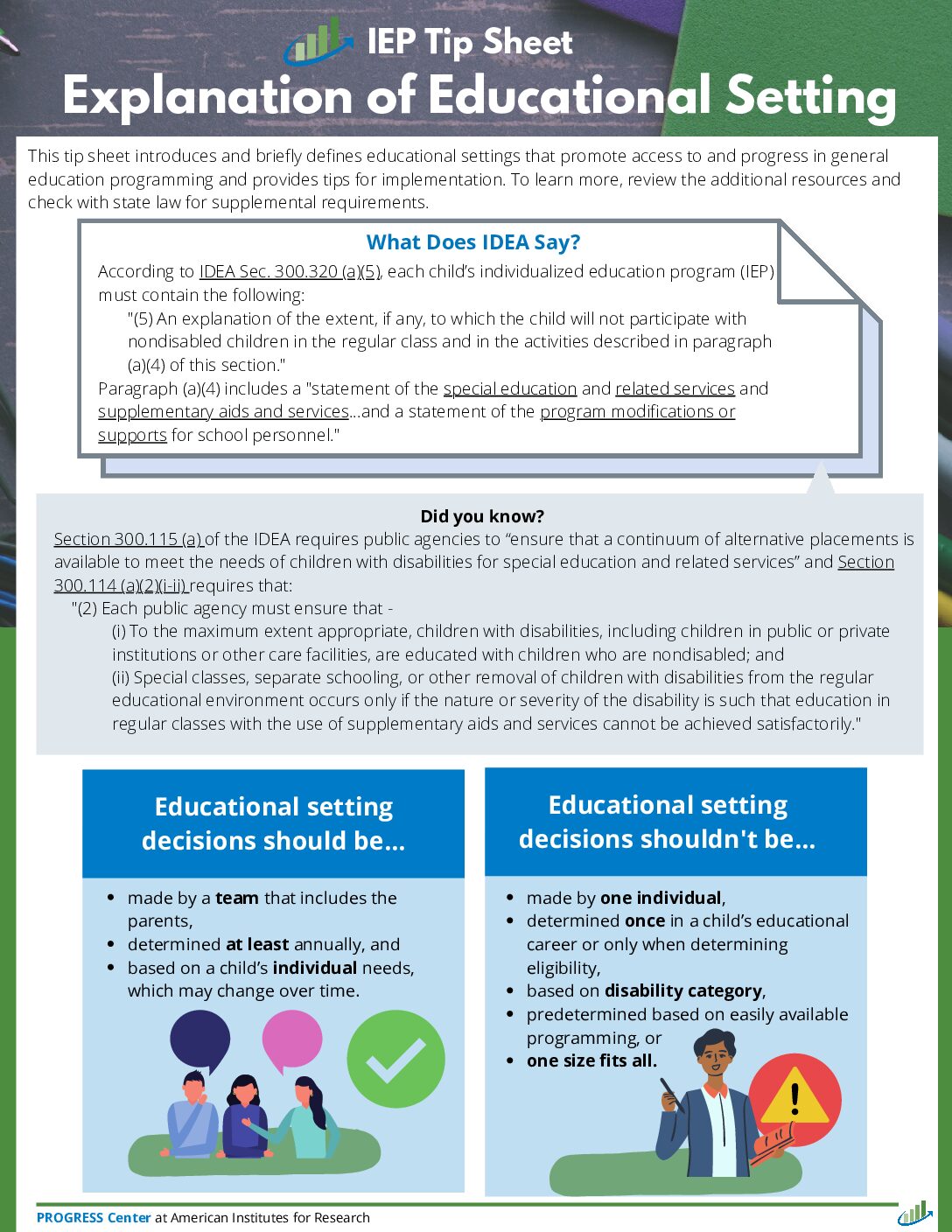
IEP Tip Sheet: Explanation of Educational Setting
This tip sheet introduces and briefly defines educational settings that promote access to and progress in general education programming and provides tips for implementation. To learn more, review the additional resources and check with state law for supplemental requirements.
Categories: IEP, Special Education
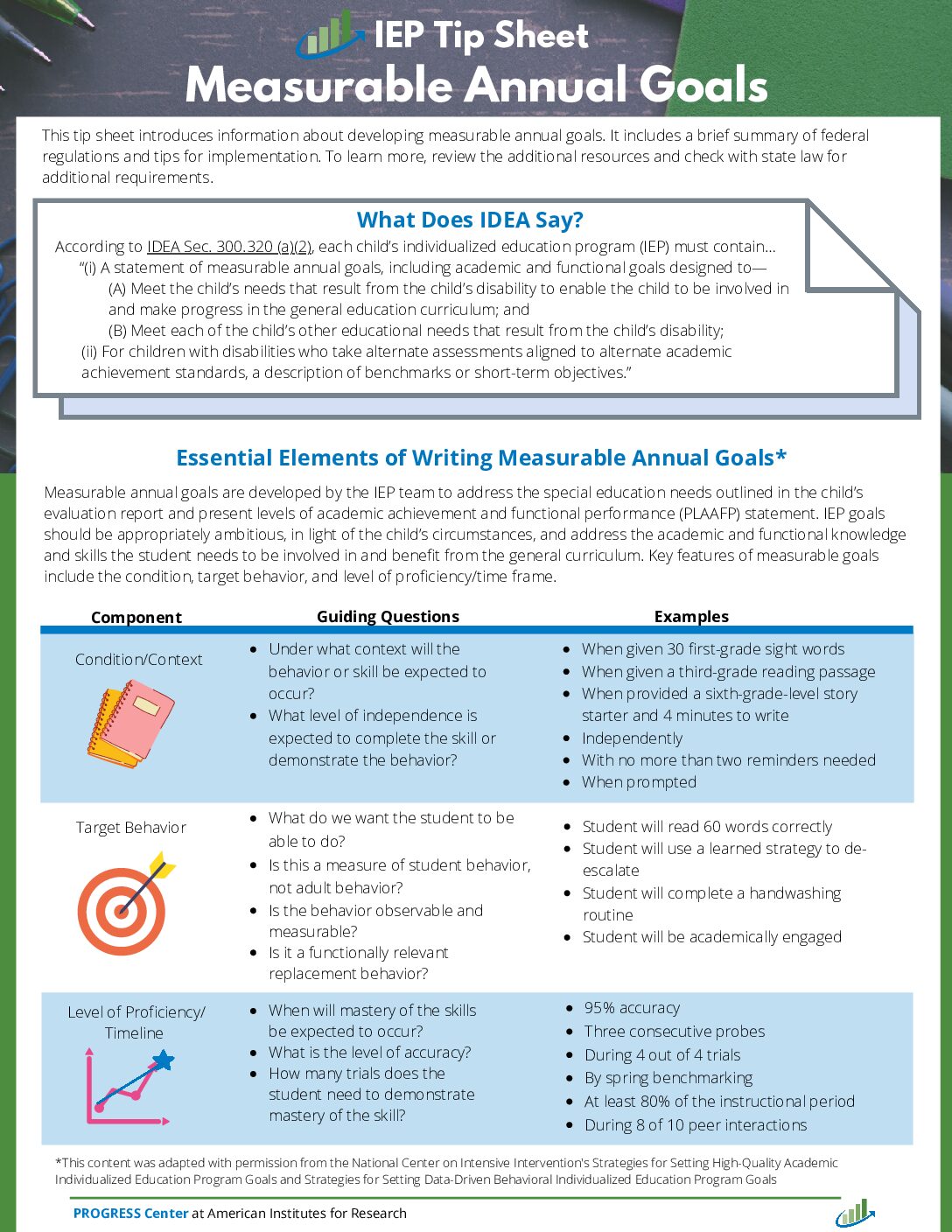
IEP Tip Sheet: Measurable Annual Goals
This tip sheet introduces information about developing measurable annual goals. It includes a brief summary of federal regulations and tips for implementation. To learn more, review the additional resources and check with state law for additional requirements.
Categories: IEP, Special Education
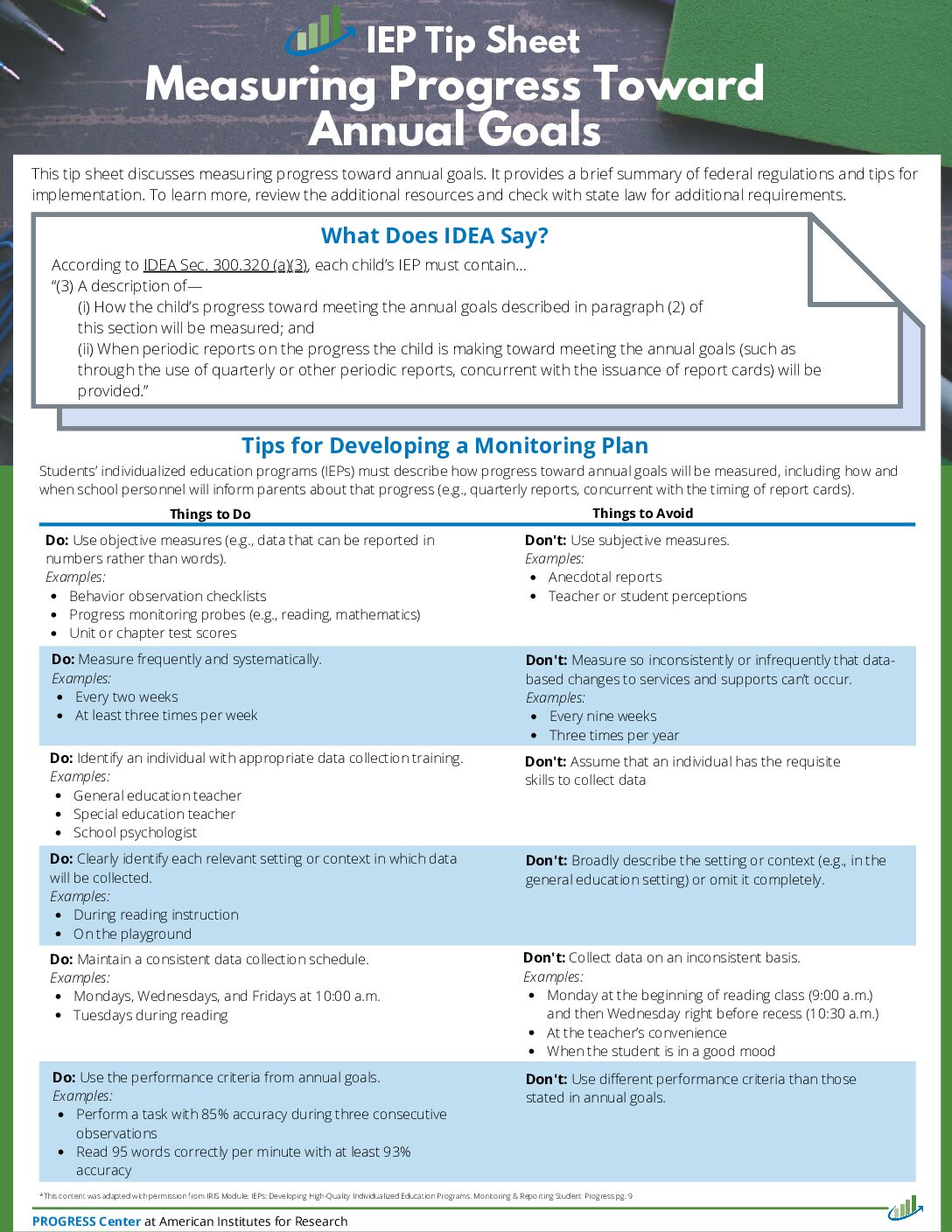
IEP Tip Sheet: Measuring Progress Toward Annual Goals
This tip sheet discusses measuring progress toward annual goals. It provides a brief summary of federal regulations and tips for implementation. To learn more, review the additional resources and check with state law for additional requirements.
Categories: IEP, Special Education
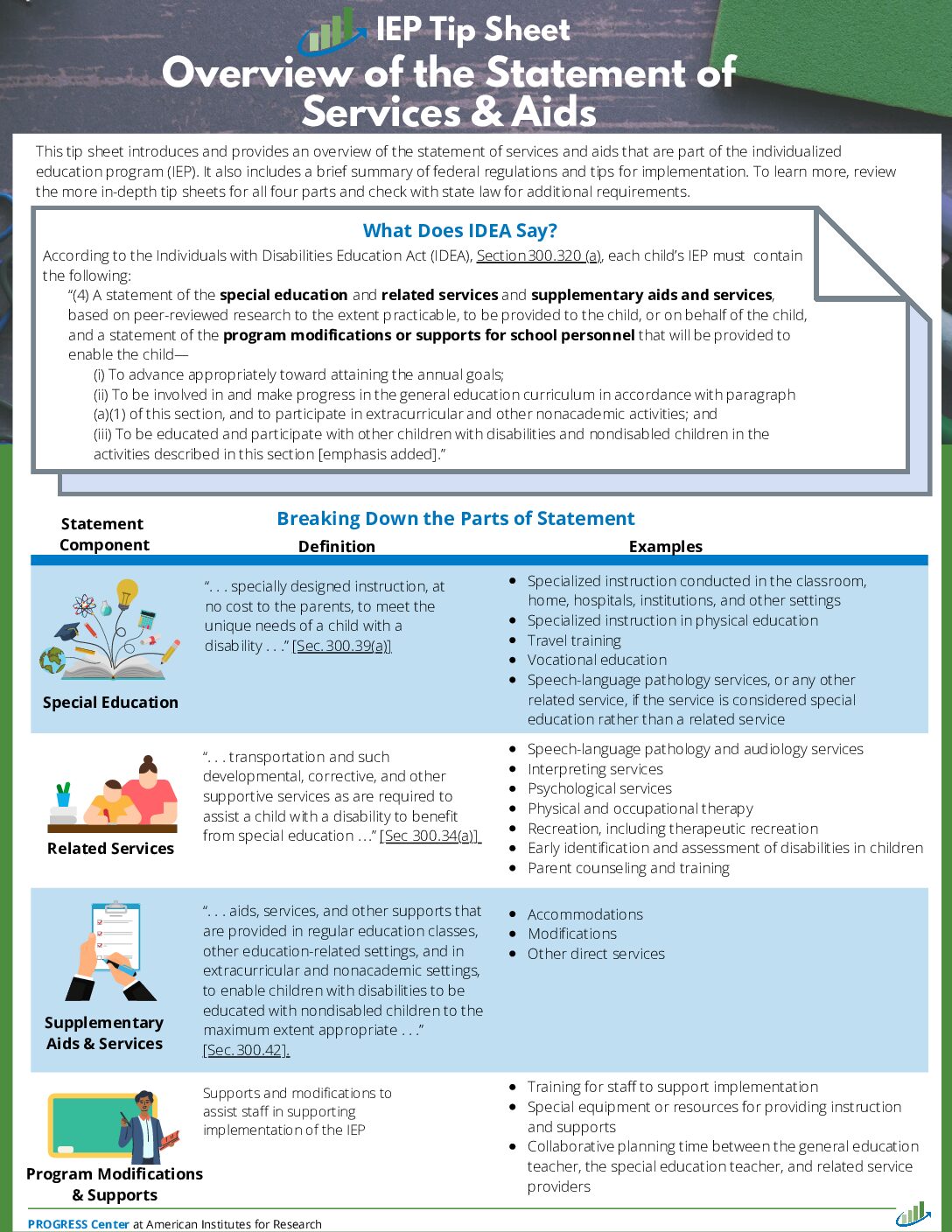
IEP Tip Sheet: Overview of the Statement of Services & Aids
This tip sheet introduces and provides an overview of the statement of services and aids that are part of the individualized education program (IEP). It also includes a brief summary of federal regulations and tips for implementation. To learn more, review the more in-depth tip sheets for all four parts and check with state law for additional requirements.
Categories: IEP, Special Education
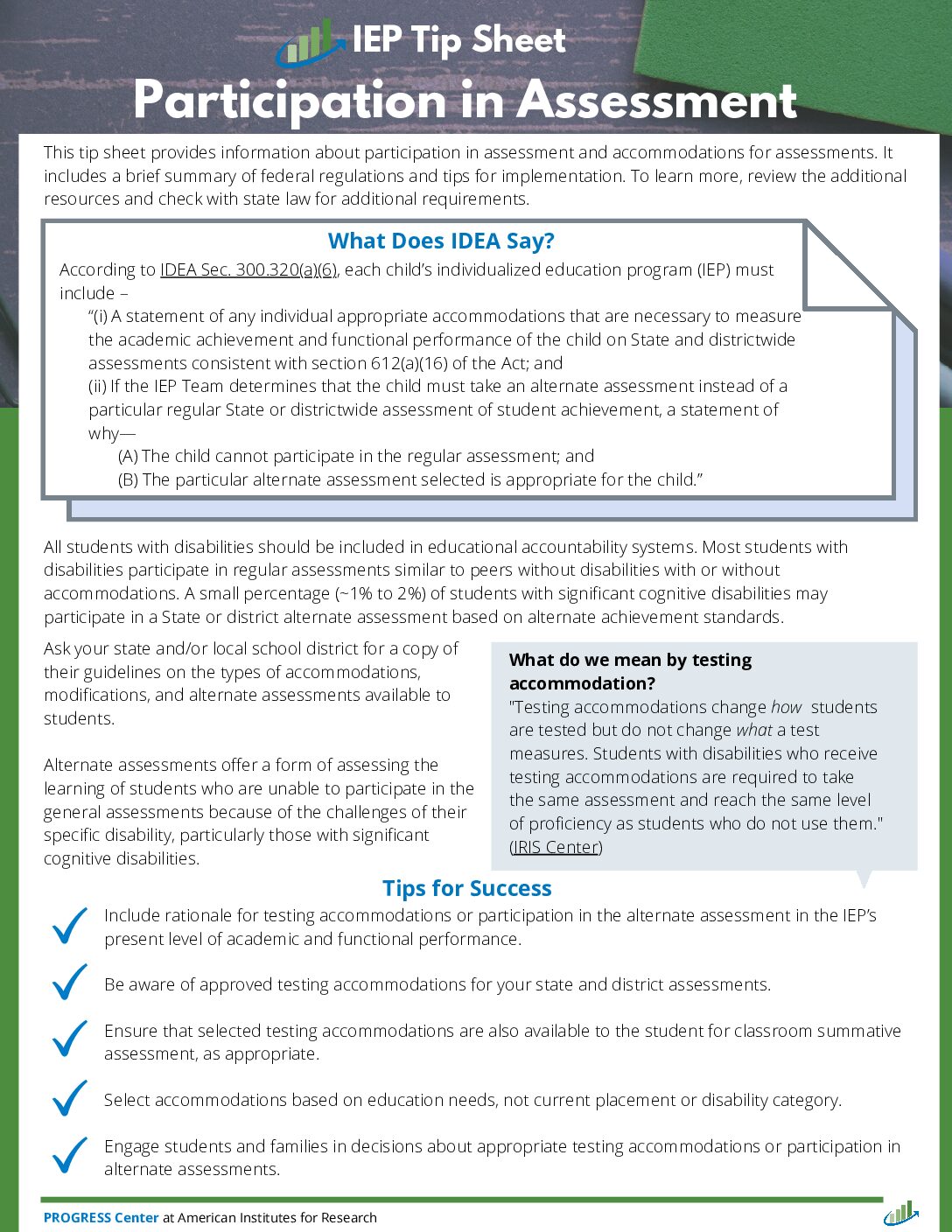
IEP Tip Sheet: Participation in Assessment
This tip sheet provides information about participation in assessment and accommodations for assessments. It includes a brief summary of federal regulations and tips for implementation. To learn more, review the additional resources and check with state law for additional requirements.
Categories: IEP, Special Education
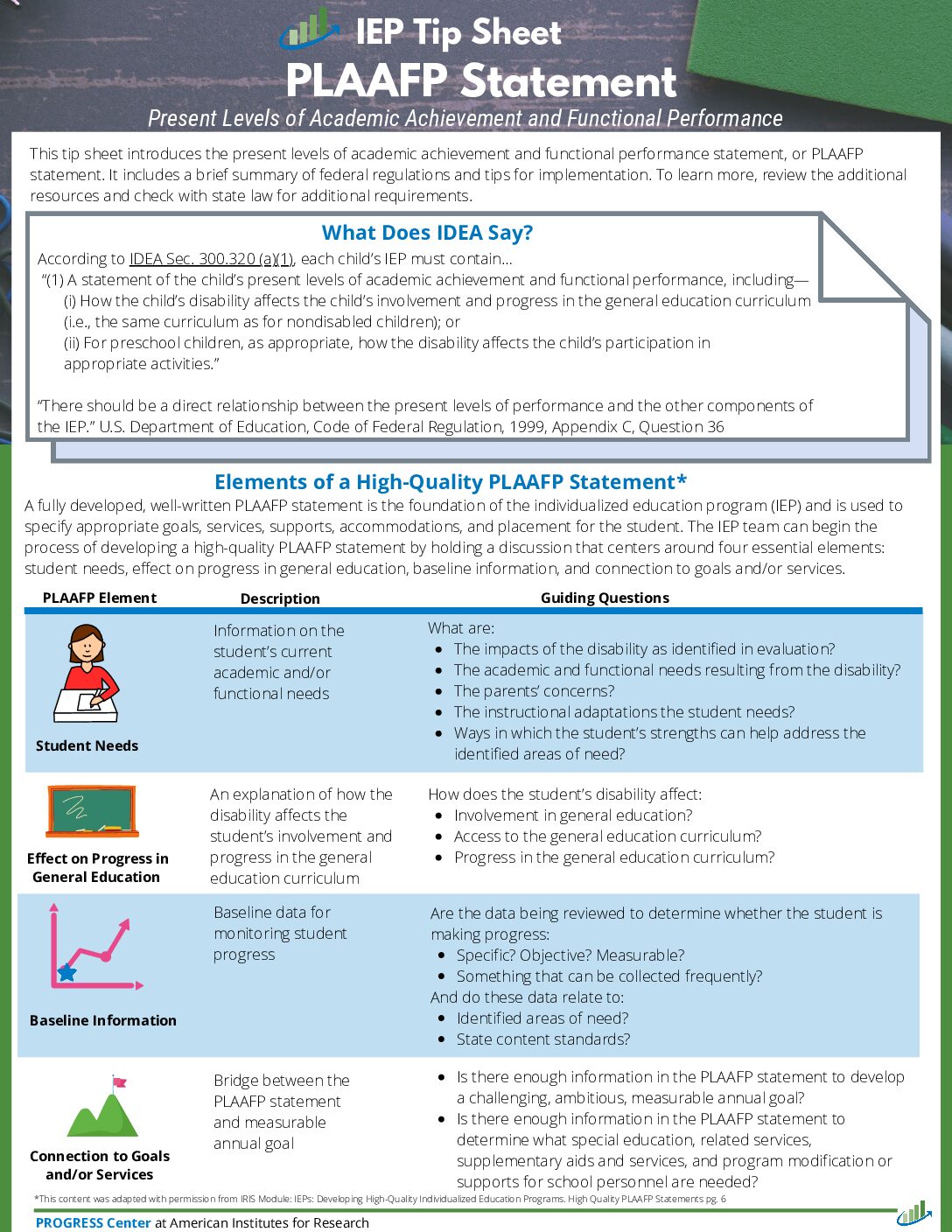
IEP Tip Sheet: PLAAFP Statement
This tip sheet introduces the present levels of academic achievement and functional performance statement, or PLAAFP statement. It includes a brief summary of federal regulations and tips for implementation. To learn more, review the additional resources and check with state law for additional requirements
Categories: IEP, Special Education
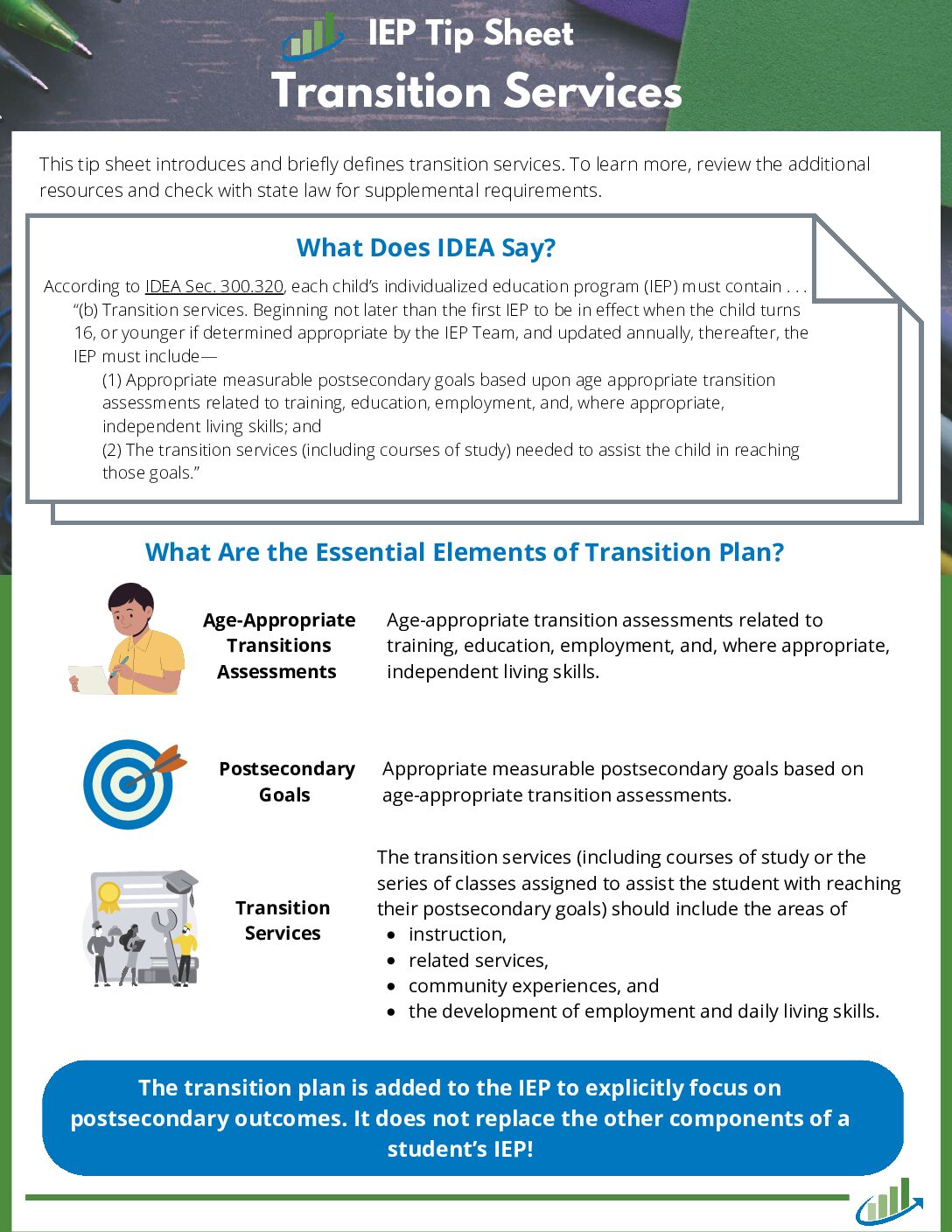
IEP Tip Sheet: Transition Services
This tip sheet introduces and briefly defines transition services. To learn more, review the additional resources and check with state law for supplemental requirements.
Categories: IEP, Special Education, Transition to Adulthood, Transitions
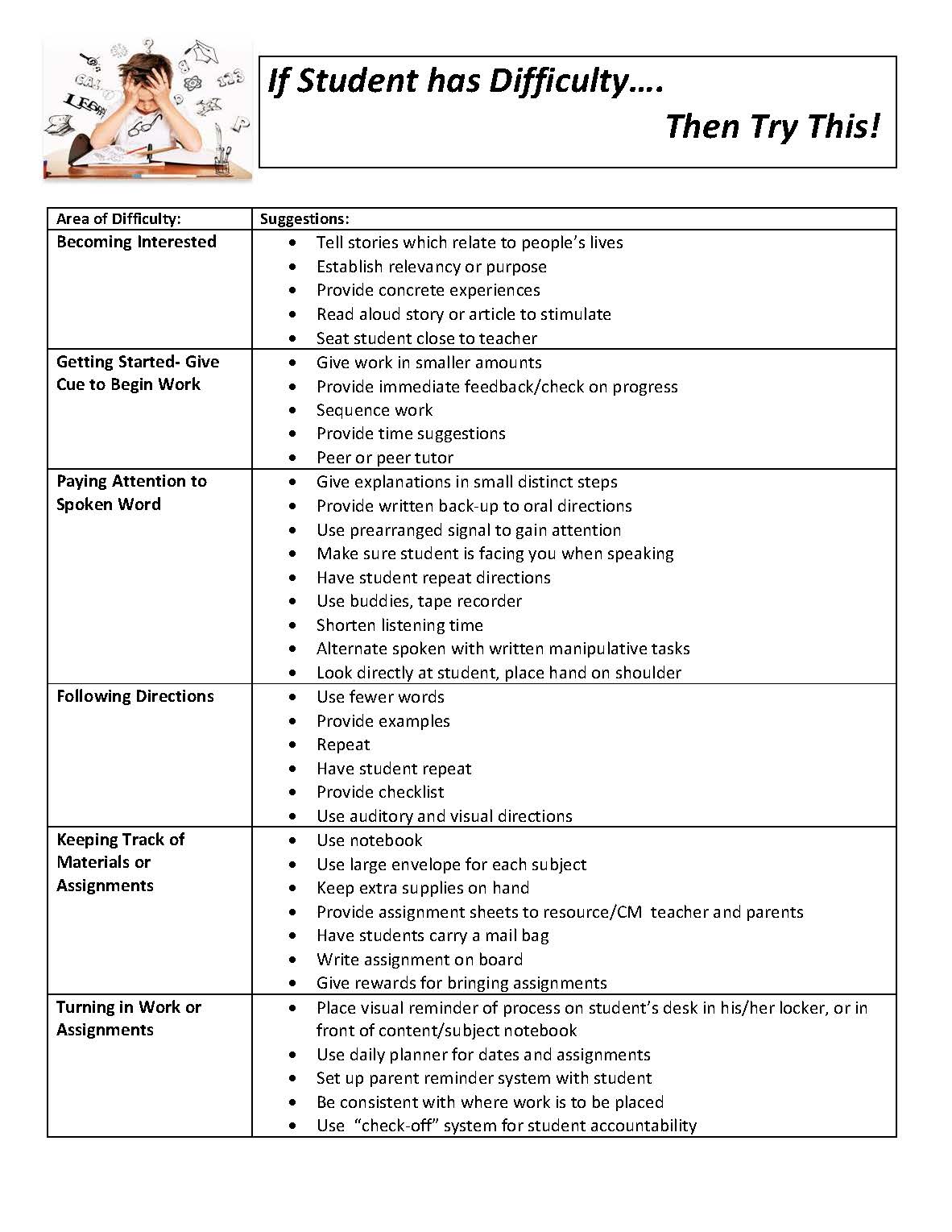
If Student has Difficulty….Then Try This!
A great tool full of suggested accommodations for specific areas of difficulty.
Categories: 504, Accommodations, IEP, Special Education
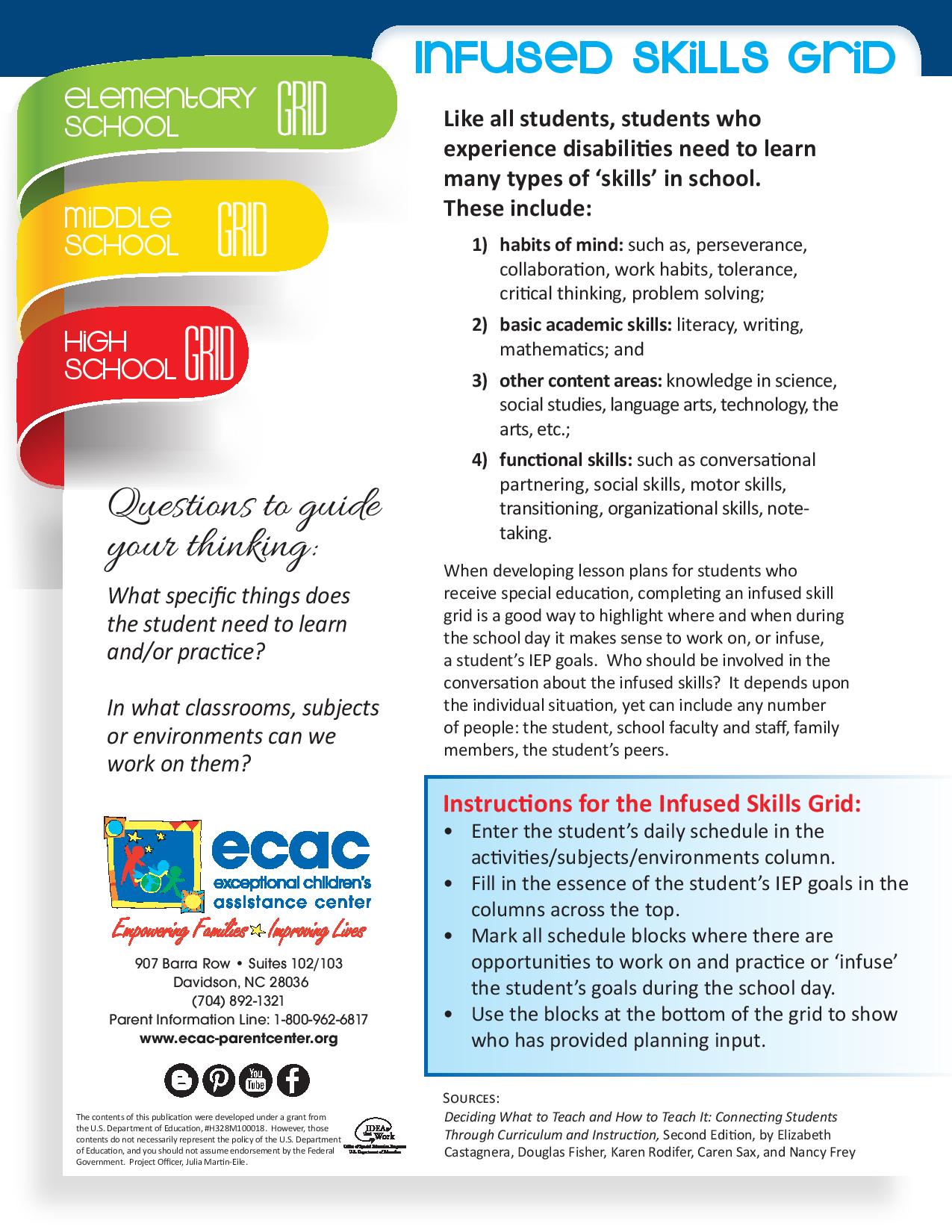
Infused Skills Grid
Like all students, students who experience disabilities need to learn many types of ‘skills’ in school. These include: habits of mind, basic academic skills, other content areas and functional skills.
Categories: Accommodations, IEP, Special Education
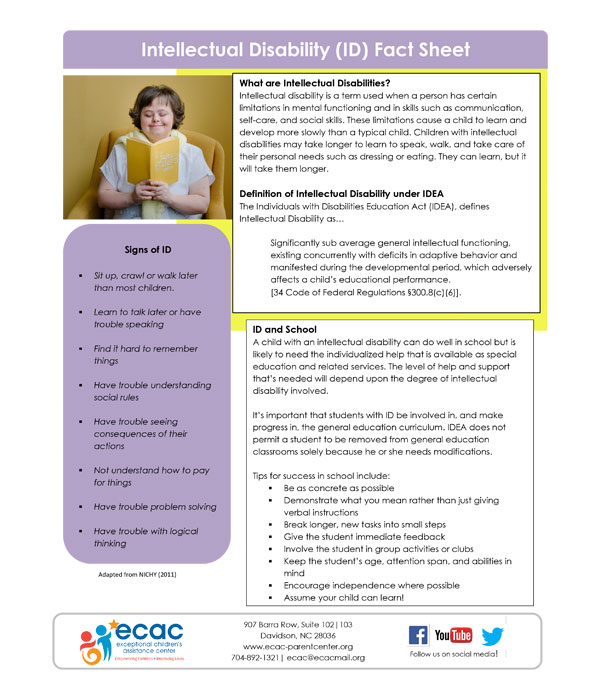
Intellectual Disability (ID) Fact Sheet
Intellectual disability is a term used when a person has certain limitations in mental functioning and in skills such as communication, self-care, and social skills...
Categories: General, Special Education
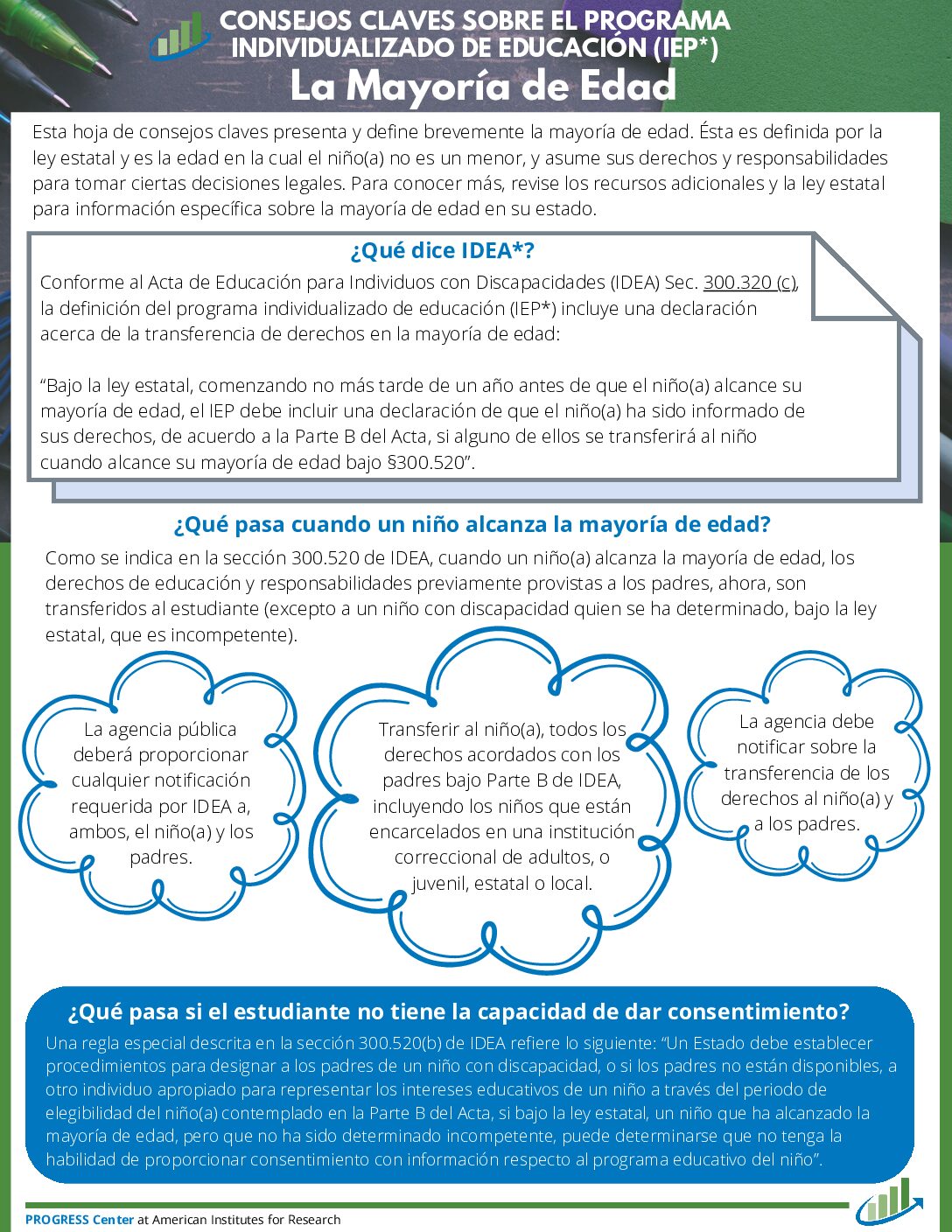
La Mayoría de Edad (Age of Majority Spanish Version)
Categories: IEP, Spanish, Special Education, Transition to Adulthood, Transitions
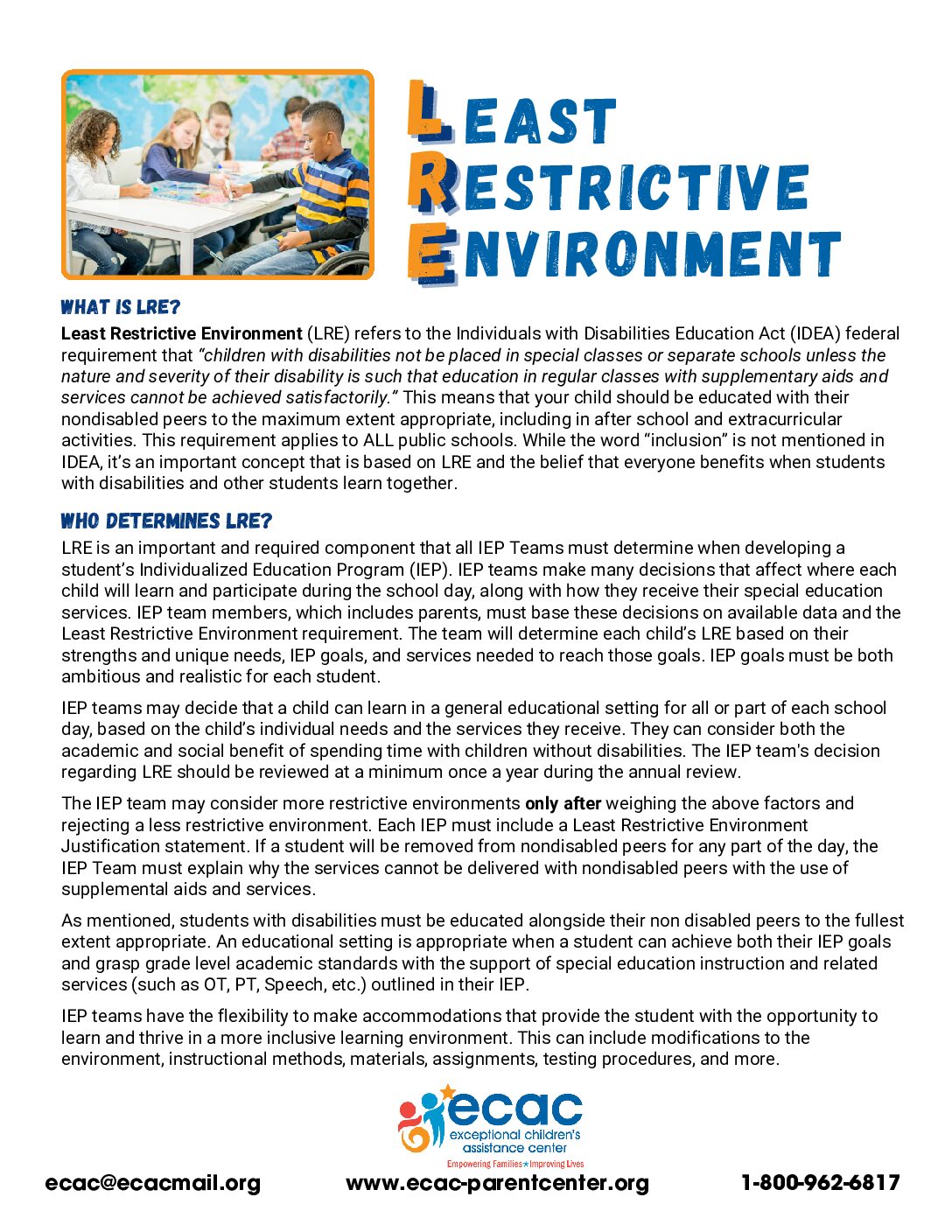
Least Restrictive Environment Fact Sheet
Least Restrictive Environment (LRE) refers to the Individuals with Disabilities Education Act (IDEA) federal requirement that “children with disabilities not be placed in special classes or separate schools unless the nature and severity of their disability is such that education in regular classes with supplementary aids and services cannot be achieved satisfactorily.” This means that your child should be educated with their nondisabled peers to the maximum extent appropriate, including in after school and extracurricular activities.
Categories: IDEA, Inclusion, Special Education
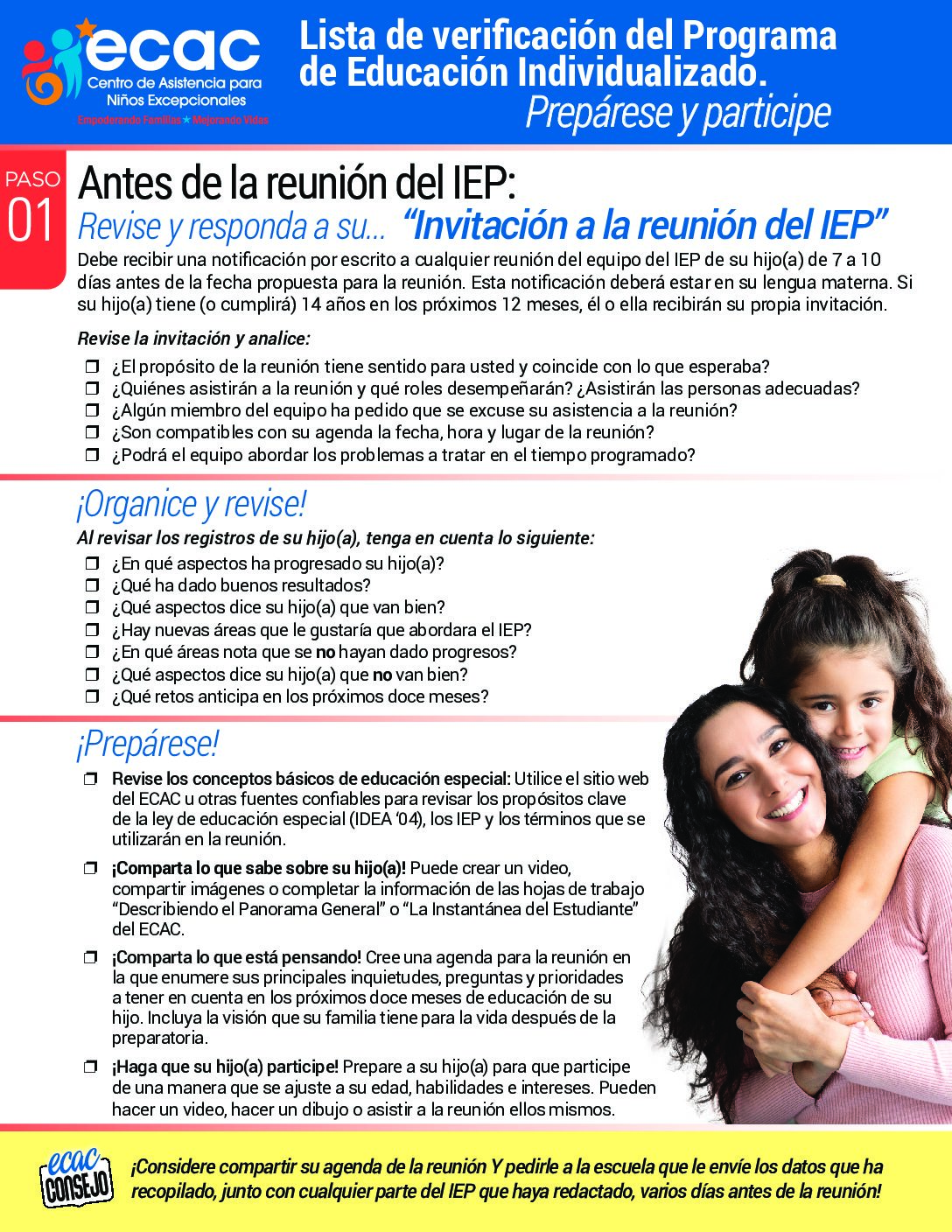
Lista de Verificación del IEP (IEP Checklist)
Lista de verificación del Programa de Educación Individualizado.
Categories: Communication, IEP, Spanish, Special Education
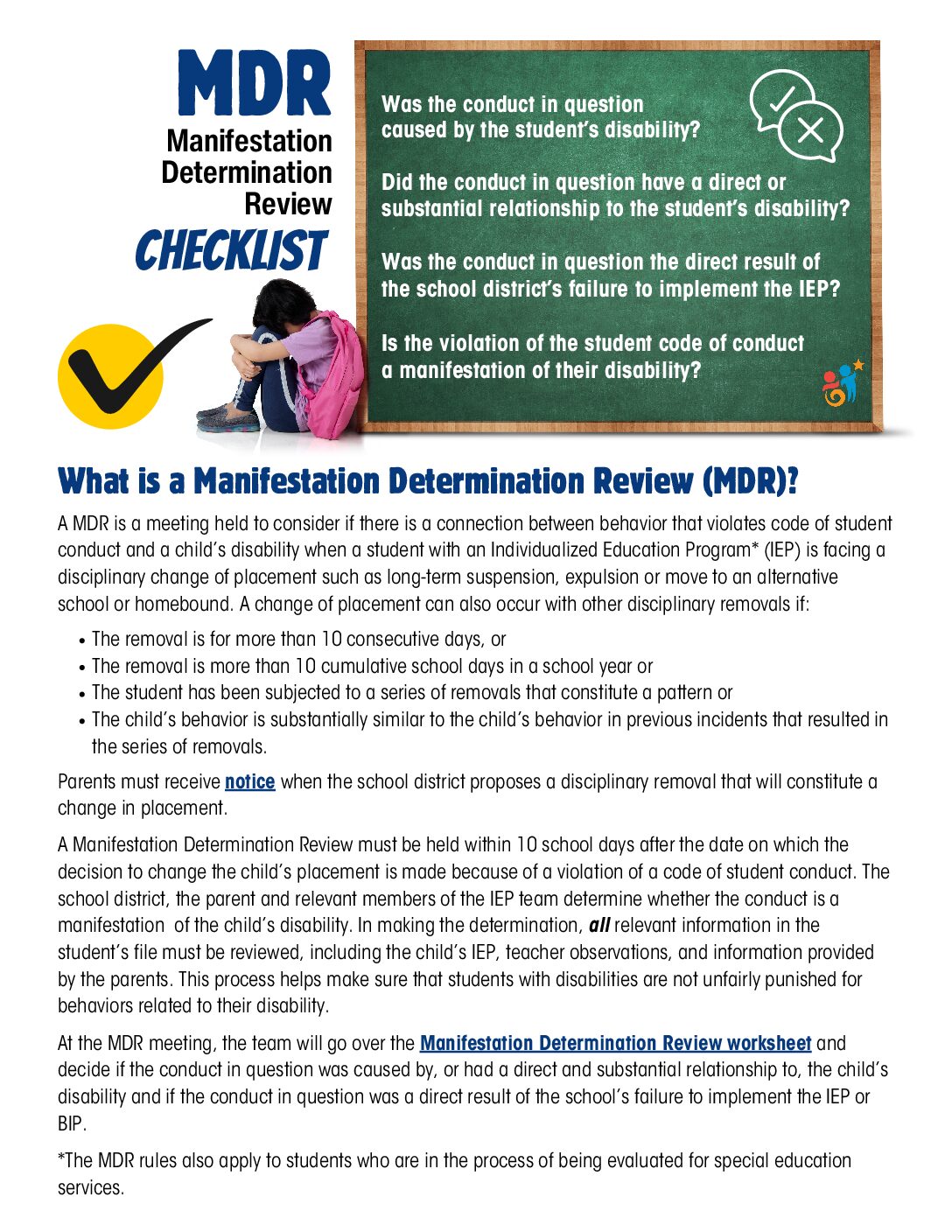
Manifestation Determination Review (MDR) Checklist
A MDR is a meeting held to consider if there is a connection between behavior that violates code of student conduct and a child’s disability when a student with an Individualized Education Program* (IEP) is facing a disciplinary change of placement such as long-term suspension, expulsion or move to an alternative school or homebound.
Categories: Behavior, IEP, Parent Rights, Special Education
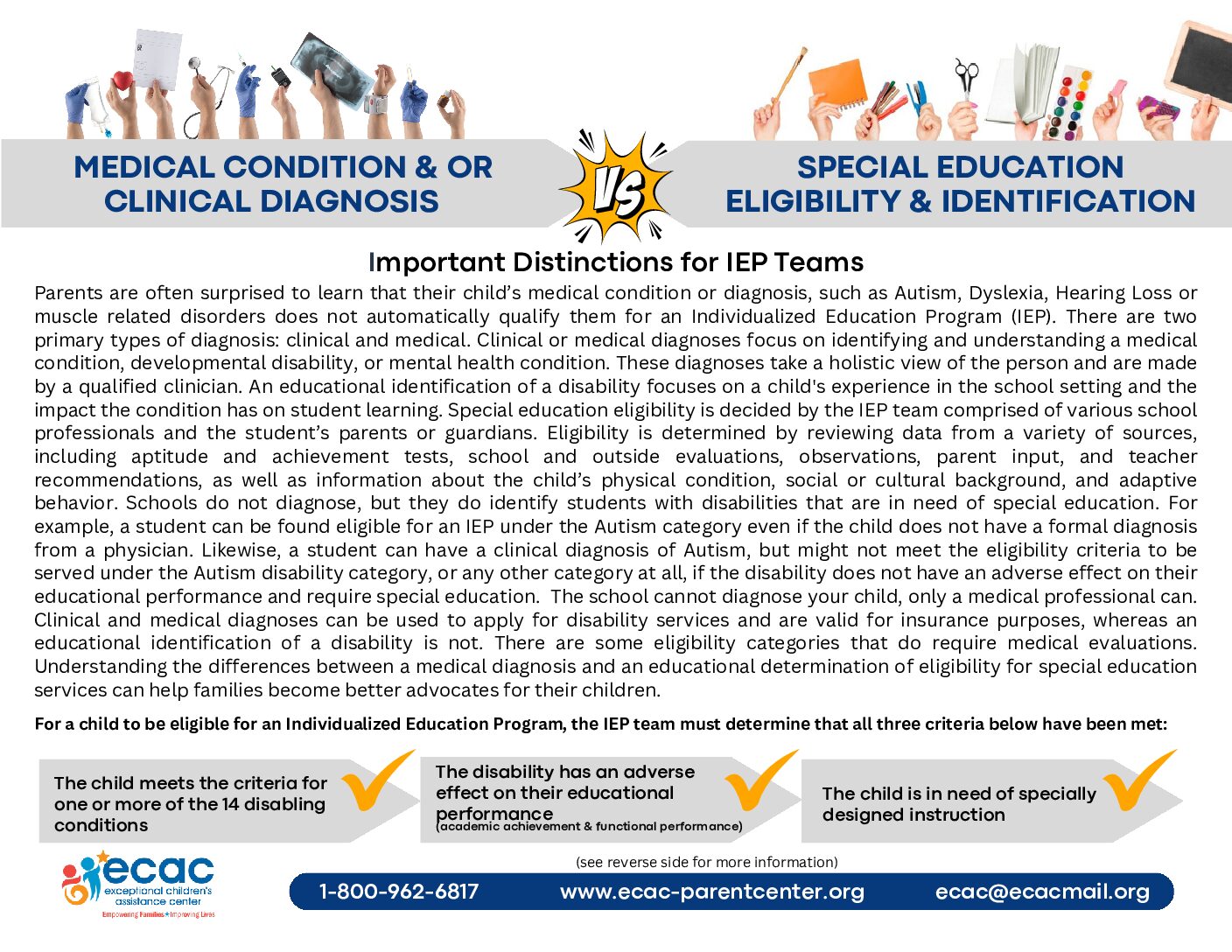
Medical Condition/Clinical Diagnosis vs. Special Education Eligibility & Identification
Parents are often surprised to learn that their child’s medical condition or diagnosis, such as Autism, Dyslexia, Hearing Loss or muscle related disorders does not automatically qualify them for an Individualized Education Program (IEP). Understanding the differences between a medical diagnosis and an educational determination of eligibility for special education services can help families become better advocates for their children.
Categories: Disability and Health Condition Specific Information, IEP, Special Education
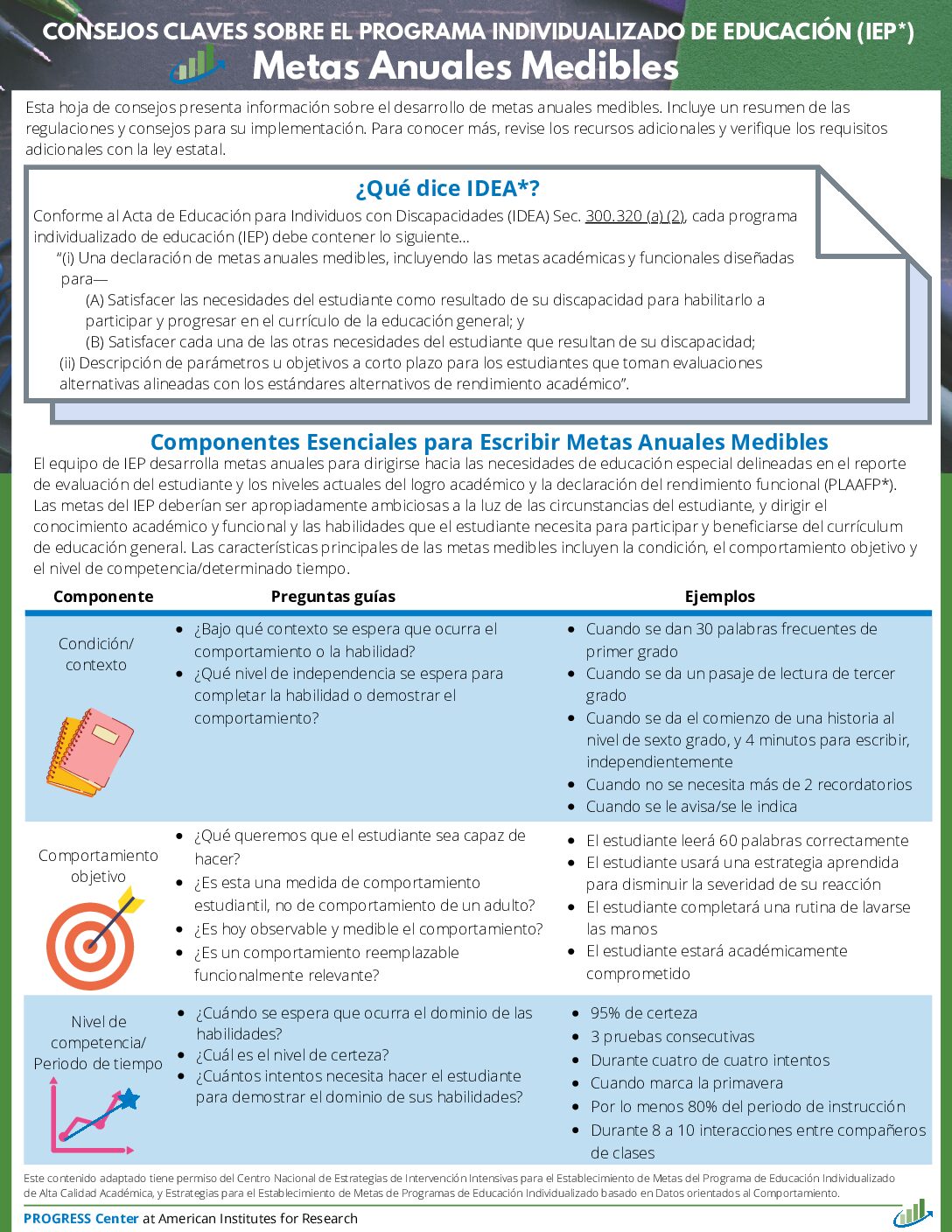
Metas Anuales Medibles (Measurable Annual Goals Spanish Version)
Categories: IEP, Spanish, Special Education
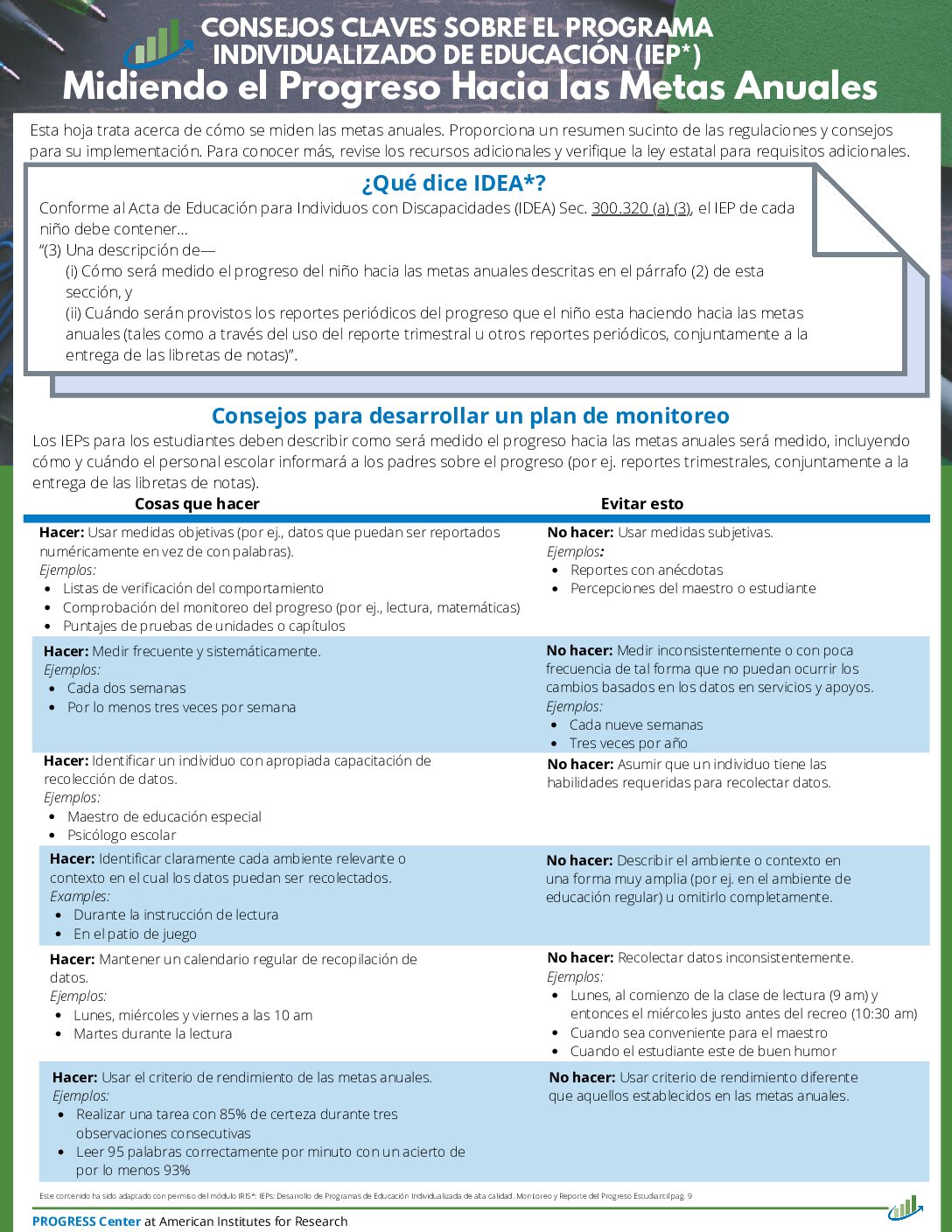
Midiendo el Progreso Hacia las Metas Anuales (Measuring Progress Toward Annual Goals Spanish Version)
Categories: IEP, Spanish, Special Education
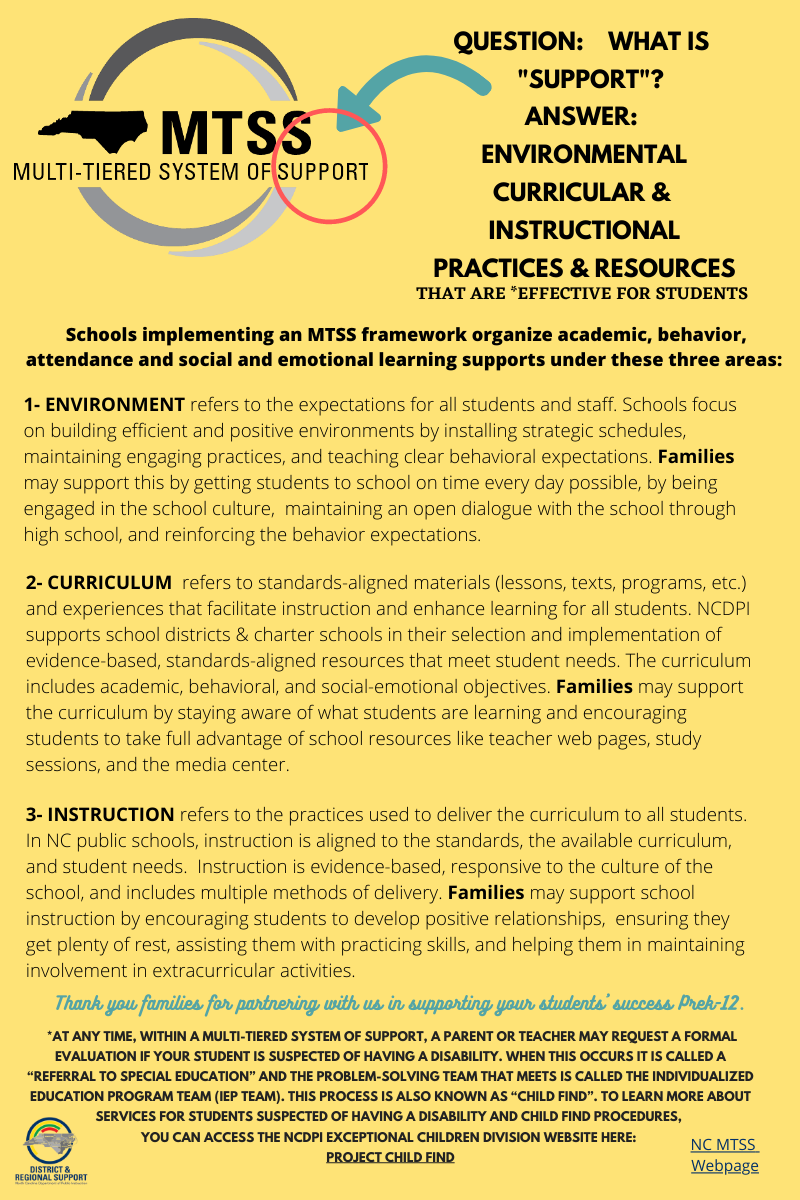
MTSS: What is Support?
This document outlines the three areas under which schools implementing an MTSS Framework should implement supports.
Categories: Learning Disability, MTSS, Special Education
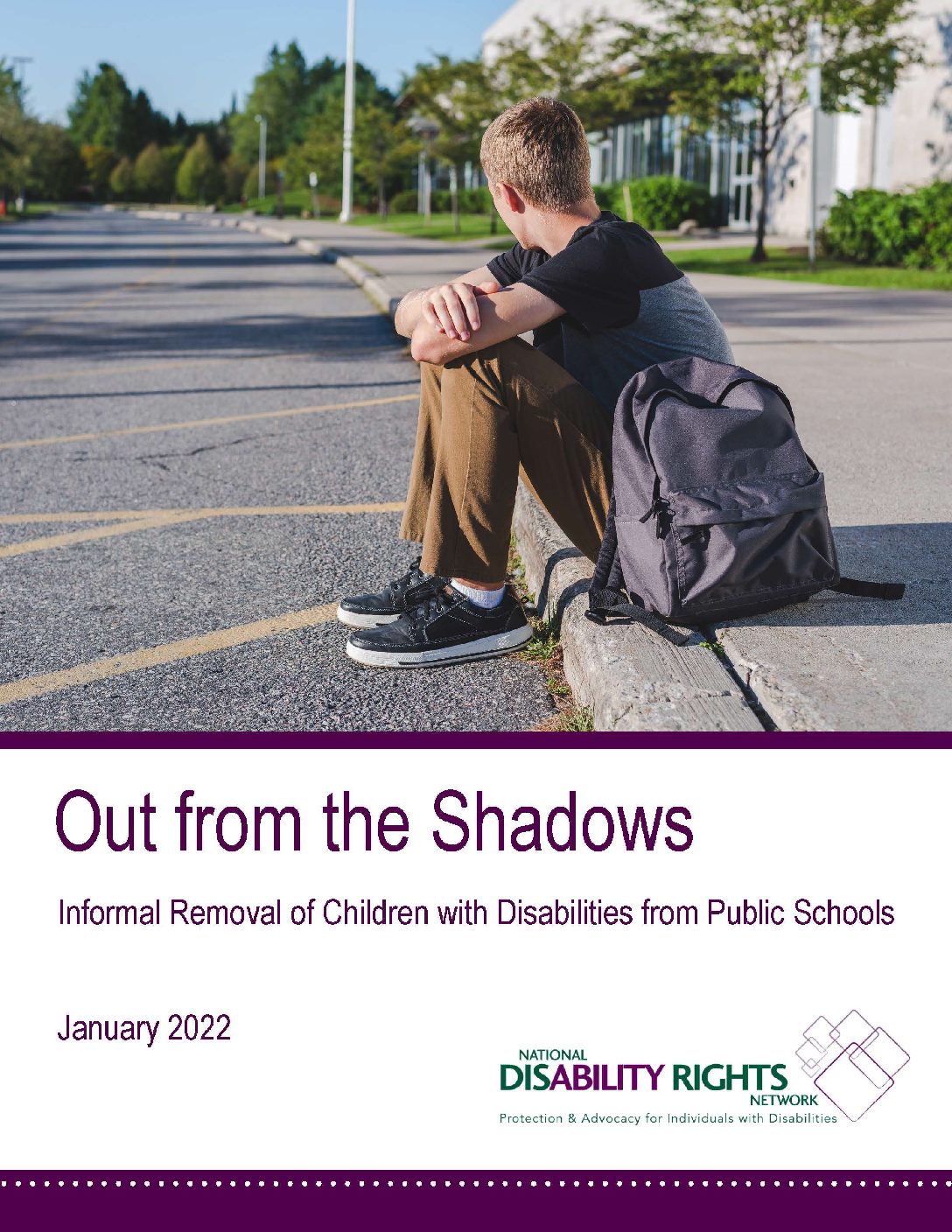
Out from the Shadows
Learn about informal removal of children with disabilities from public schools.
Categories: Behavior, Special Education
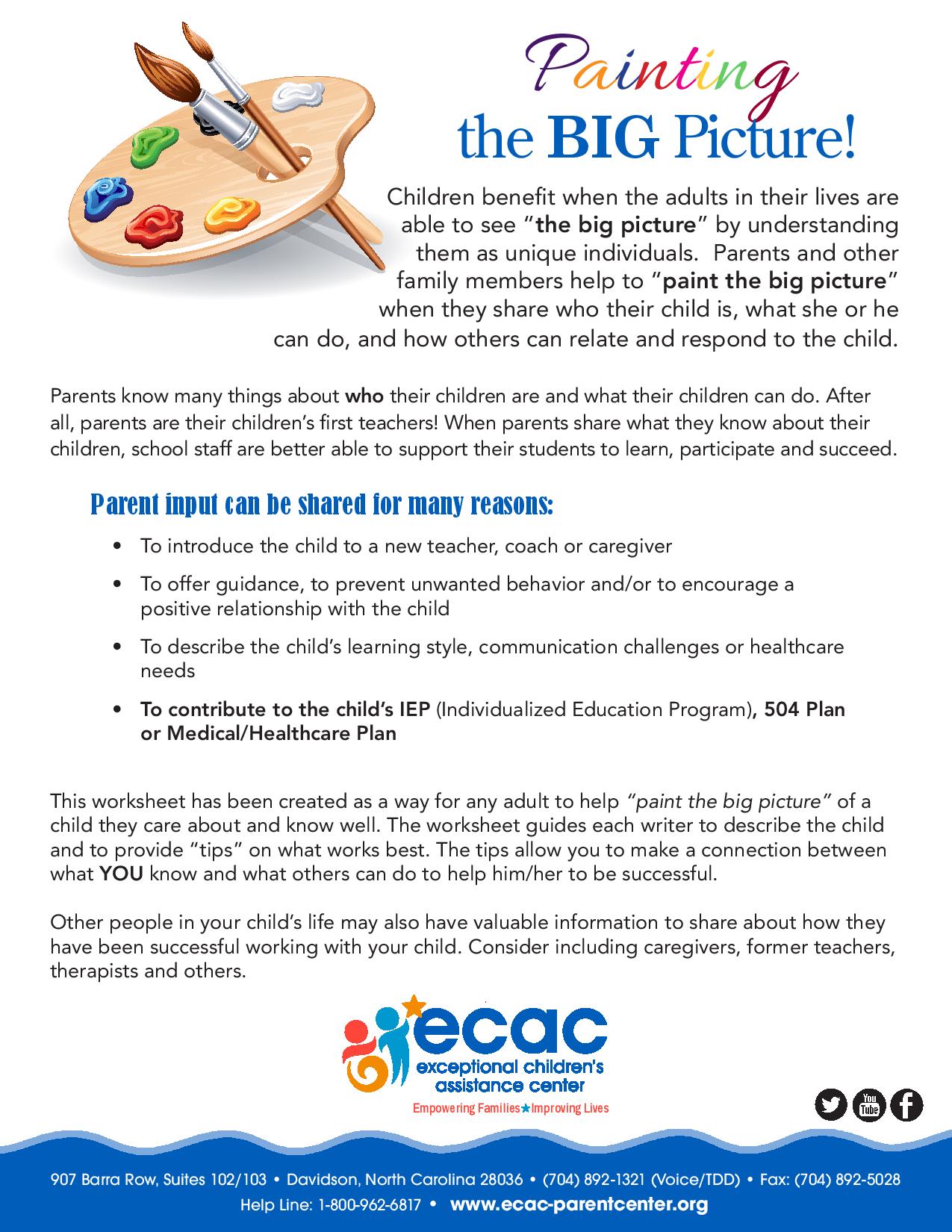
Painting the Big Picture
Painting the BIG Picture! This worksheet has been created as a way for any adult to help “paint the big picture” of a child they care about and know well. The worksheet guides each writer to describe the child and to provide “tips” on what works best. The tips allow you to make a connection between what YOU know and what others can do to help him/her to be successful.
Categories: Advocacy, Communication, General, Special Education
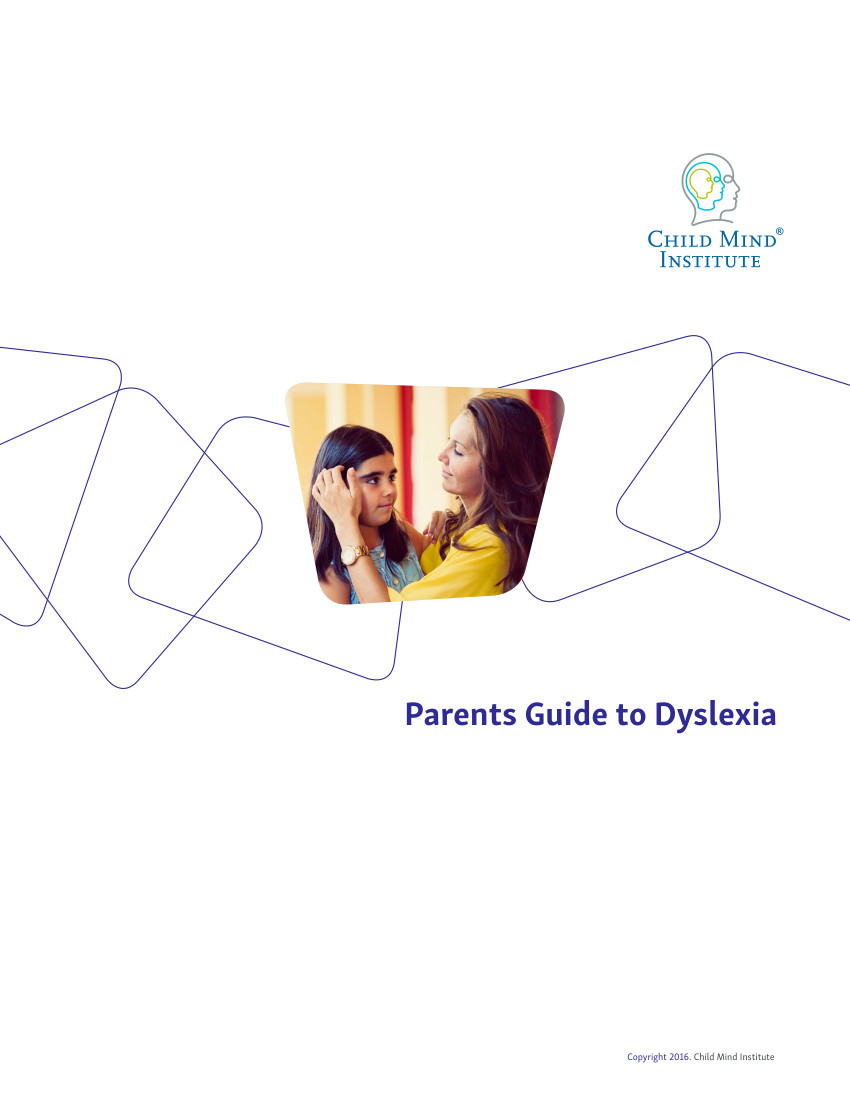
Parent's Guide to Dyslexia
This resource walks parents through the signs and impacts of dyslexia, how children can be evaluated for dyslexia and ways that parent's and teachers can help children once they are diagnosed with dyslexia.
Categories: Communication, Dyslexia, Learning Disability, Special Education
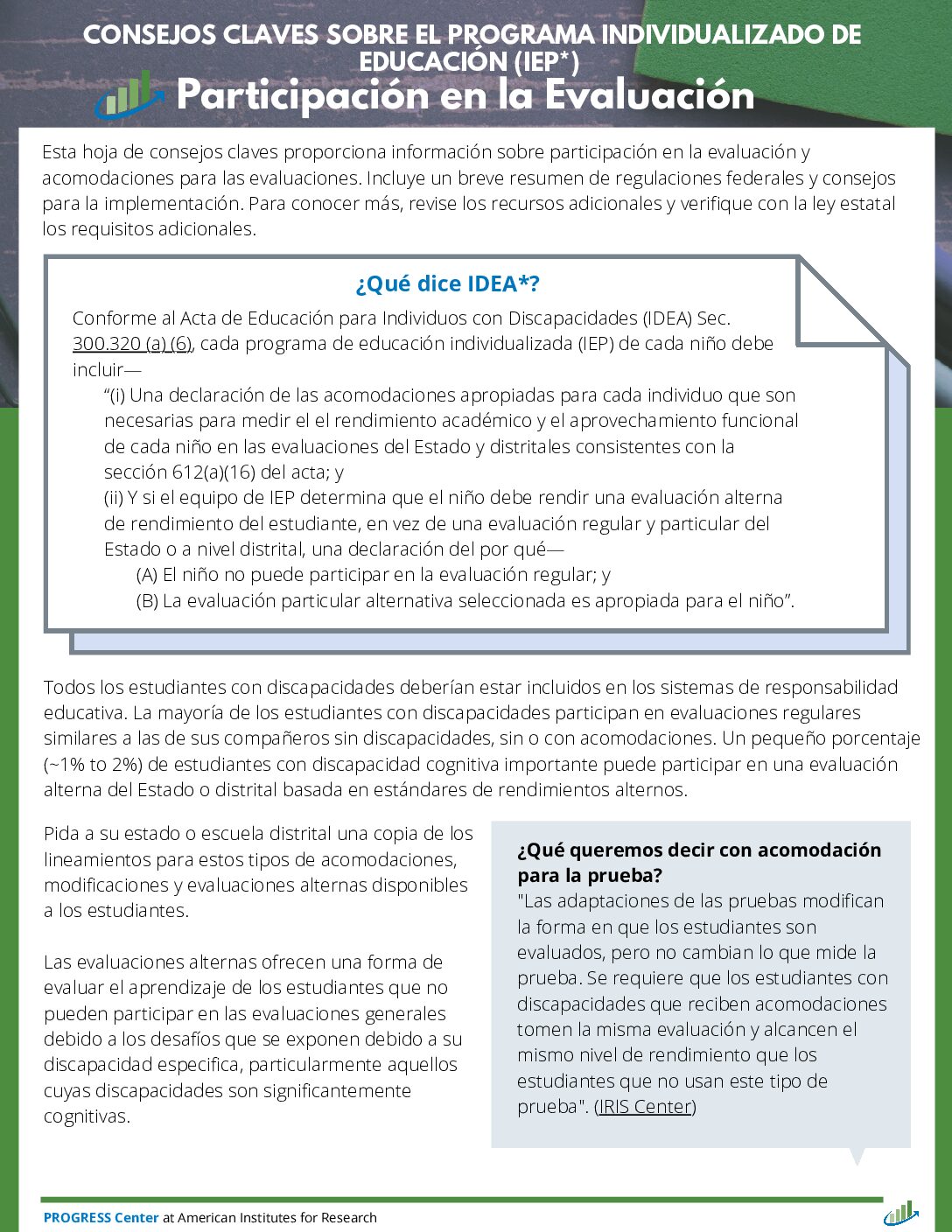
Participación en la Evaluación (Participation in Assessment Spanish Version)
https://www.ecac-parentcenter.org/wp-content/uploads/participate-assessment-spanish.pdf
Categories: IEP, Spanish, Special Education
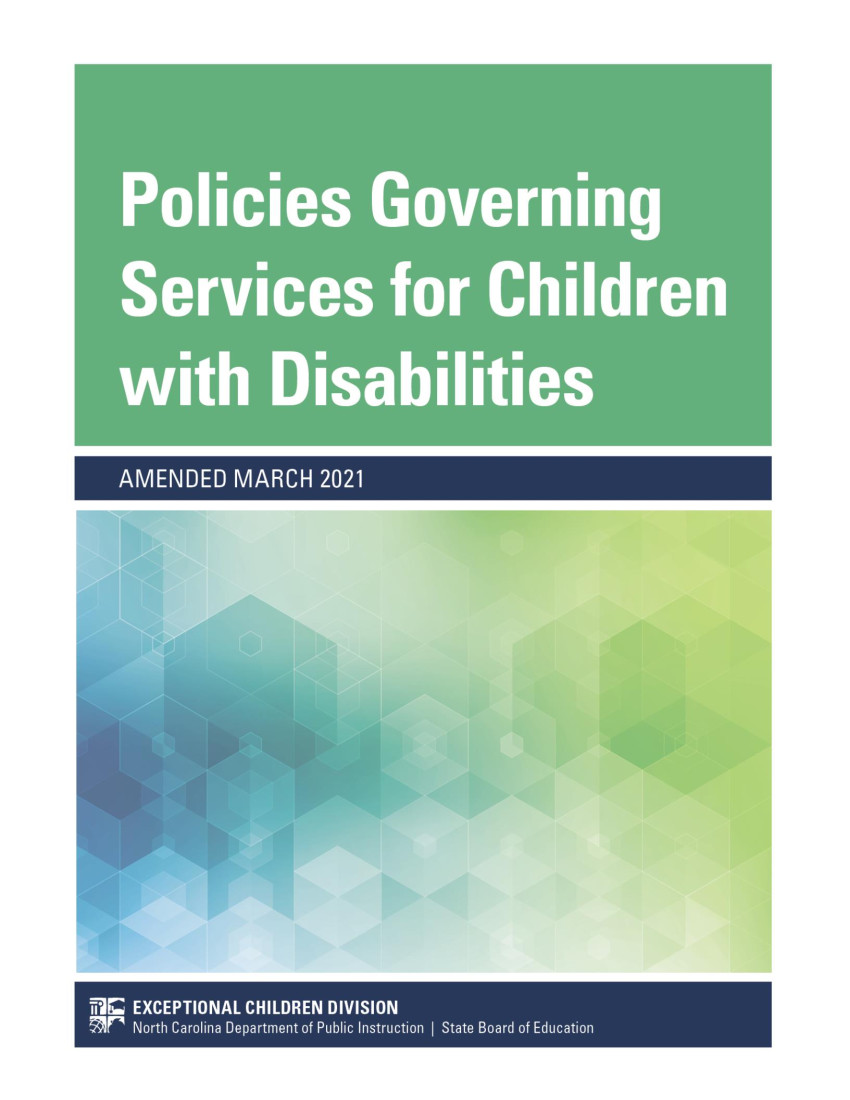
Policies Governing Services for Children with Disabilities - March 2021
Policies written by the NC Department of Public Instruction outlining how NC schools will implement NC Special Education Law which is based on IDEA.
Categories: IDEA, IEP, Parent Rights, Special Education
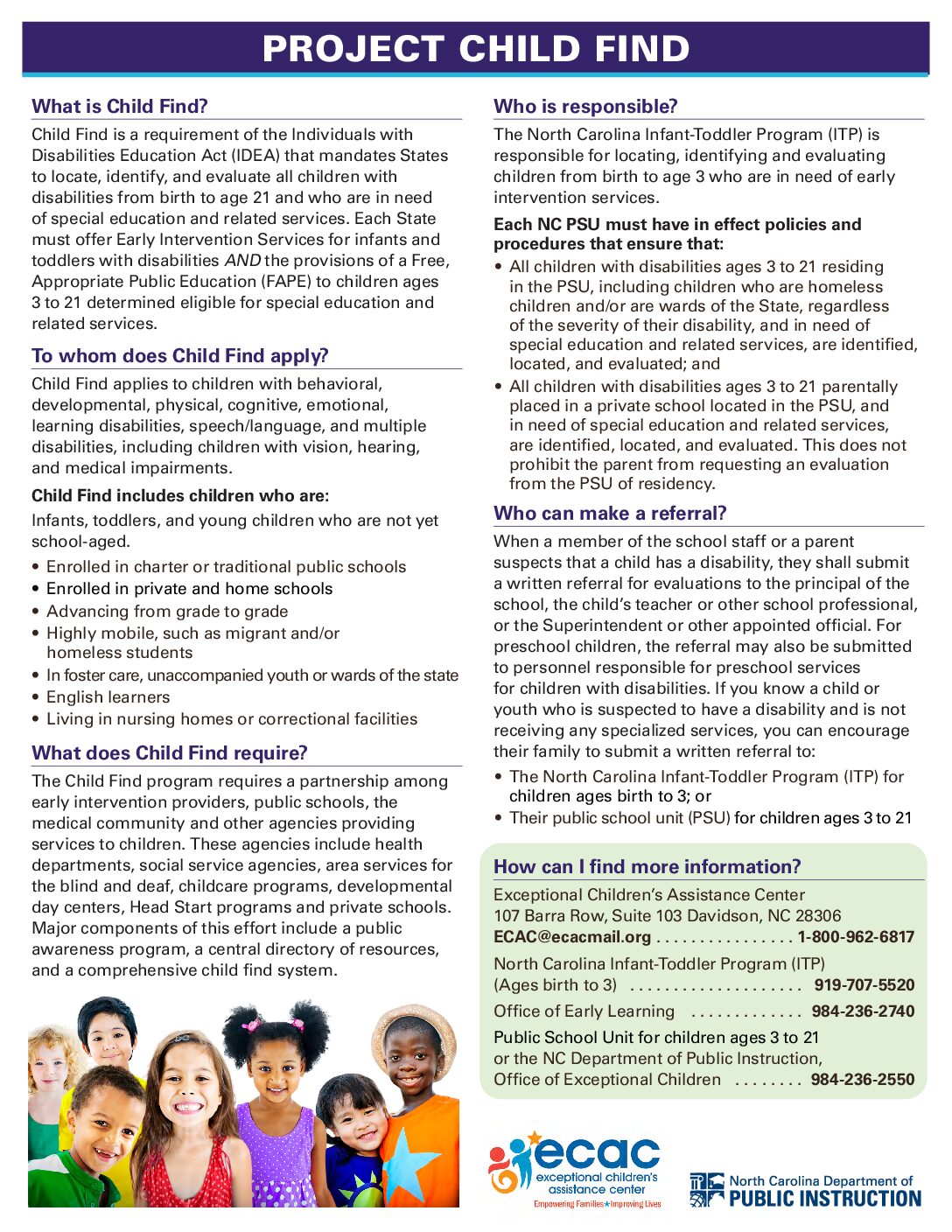
Project Child Find
Child Find is a requirement of the Individuals with Disabilities Education Act (IDEA) that mandates States to locate, identify, and evaluate all children with disabilities from birth to age 21 who are in need of special education and related services. Each State must offer Early Intervention Services for infants and toddlers with disabilities AND the provisions of a Free, Appropriate Public Education (FAPE) to children ages 3 to 21 determined eligible for special education and related services.
Categories: General, IDEA, Special Education
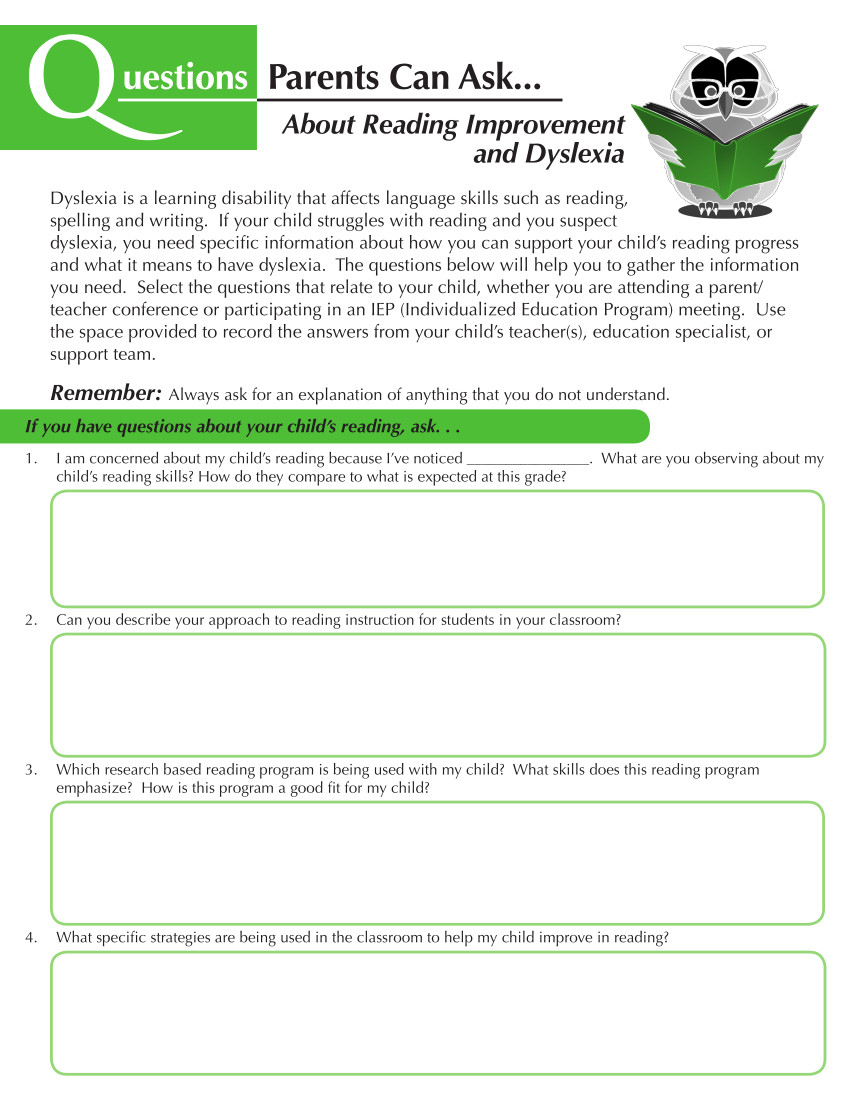
Questions Parents Can Ask about Reading Improvement and Dyslexia
This worksheet will help you gather the specific information you need if your child struggles with reading and you suspect dyslexia.
Categories: Dyslexia, Learning Disability, Literacy, Special Education
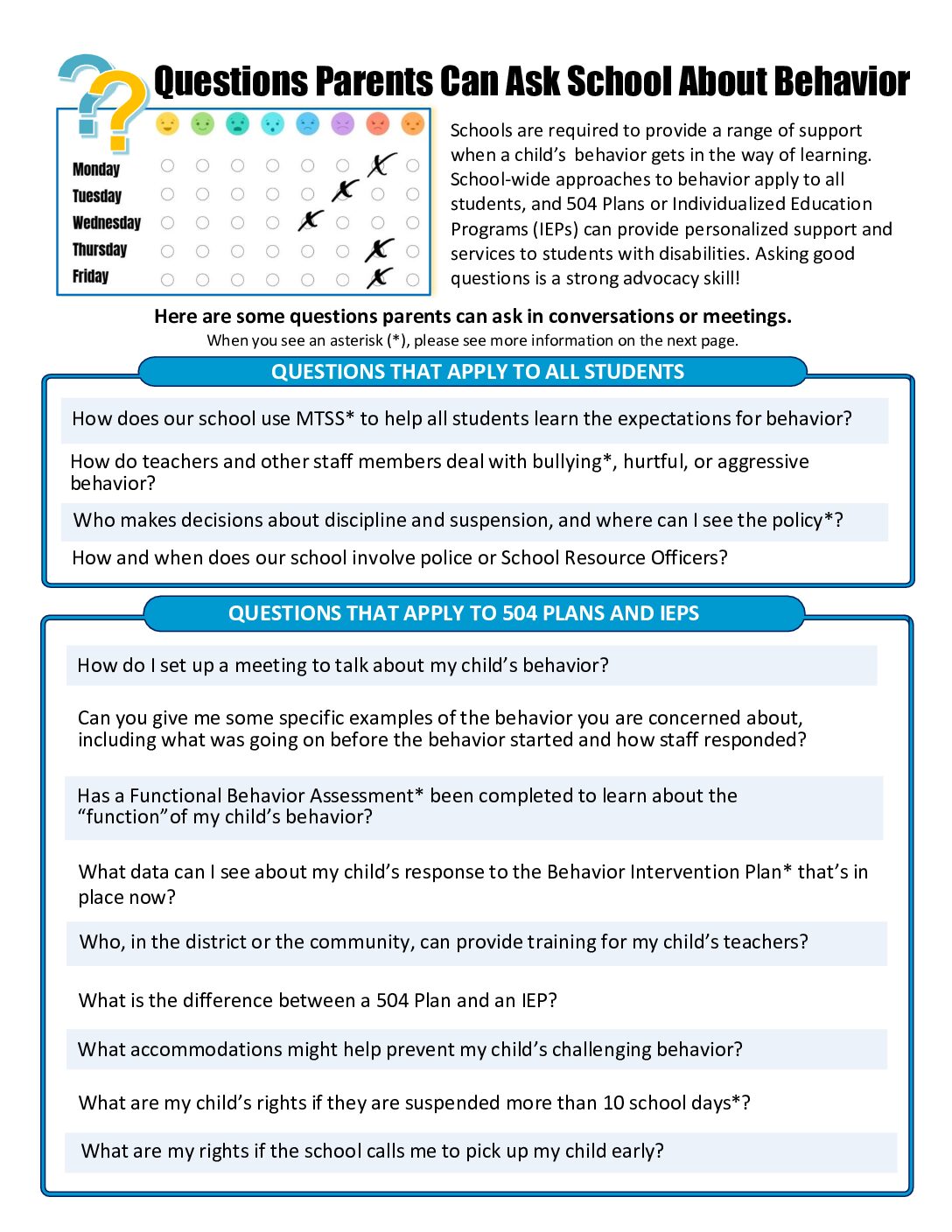
Questions Parents Can Ask School About Behavior
Schools are required to provide a range of support when a child’s behavior gets in the way of learning. School-wide approaches to behavior apply to all students, and 504 Plans or Individualized Education Programs (IEPs) can provide personalized support and services to students with disabilities. Asking good questions is a strong advocacy skill!
Categories: Behavior, Communication, Special Education
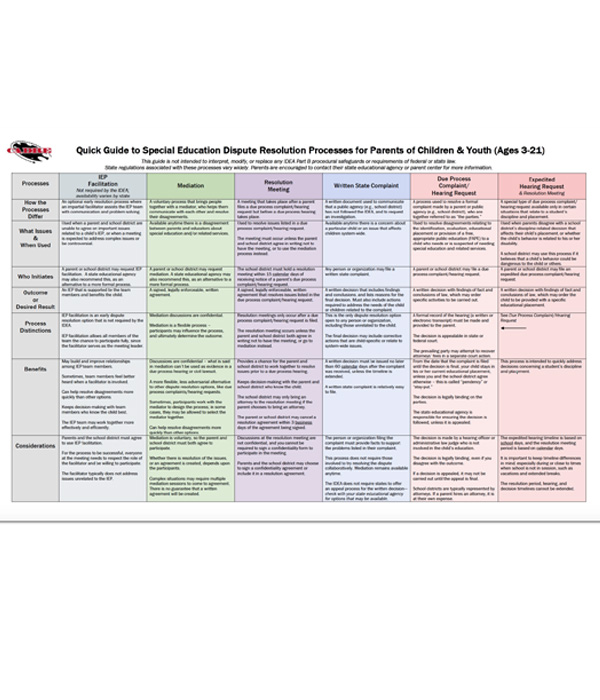
Quick Guide to Special Education Dispute Resolution Processes for Parents of Children & Youth (Ages 3-21)
IEP facilitation, mediation, resolution meeting, written state compliance, due process complaint, and hearing request
Categories: Communication, Conflict Resolution, Special Education
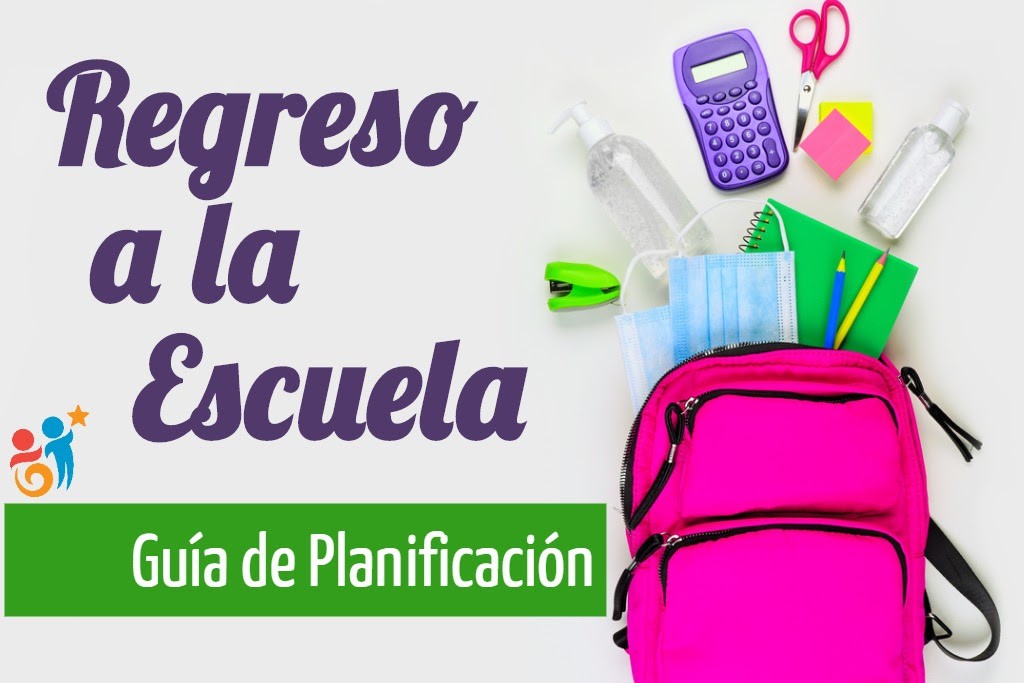
Regreso a la Escuela (Back to School)
Una Guía de Planificación para las Familias de Carolina del Norte con Estudiantes con Discapacidad
Categories: IEP, Remote Learning, Spanish, Special Education
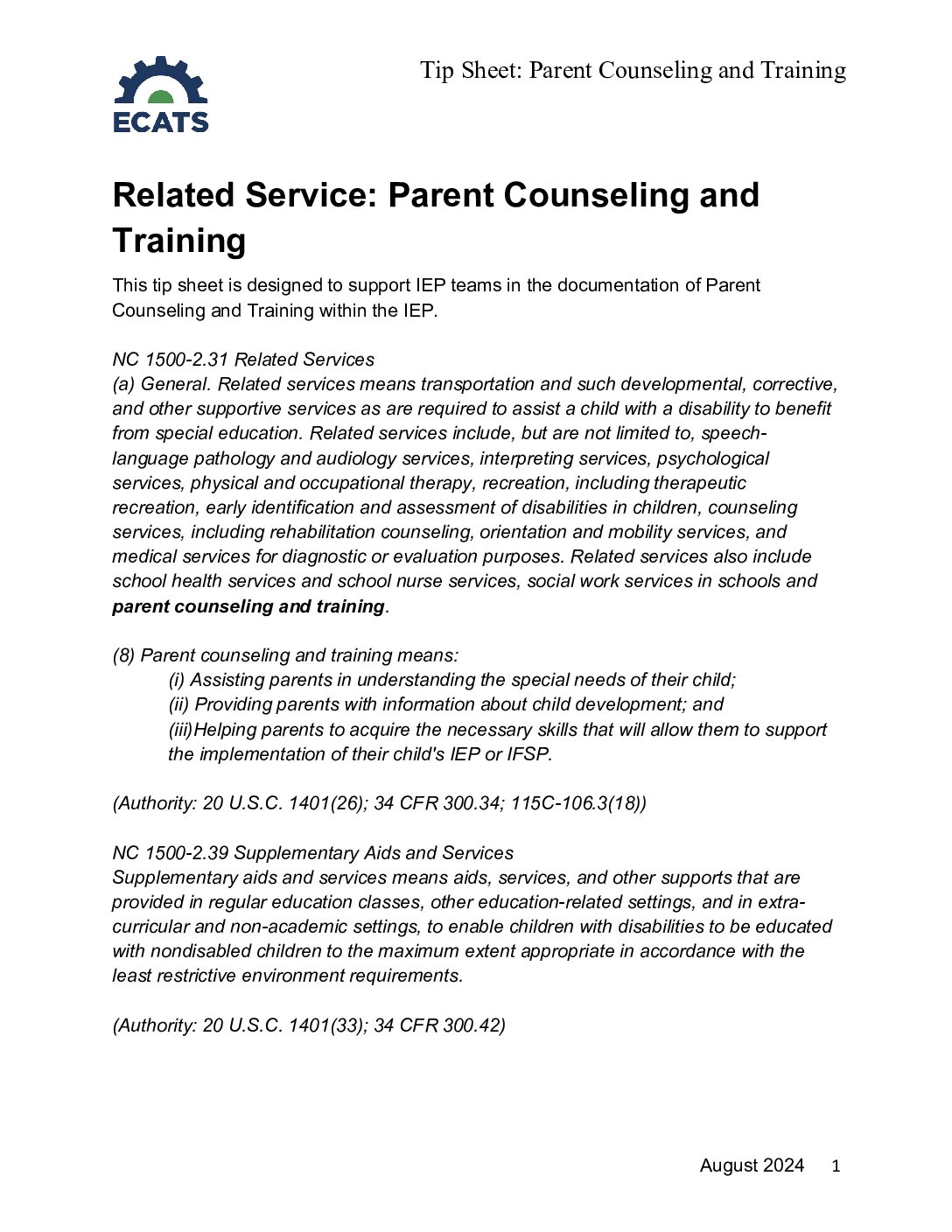
Related Service: Parent Counseling and Training
This tip sheet is designed to support IEP teams in the documentation of Parent Counseling and Training within the IEP.
Categories: IEP, NC Deaf-Blind Project, Special Education
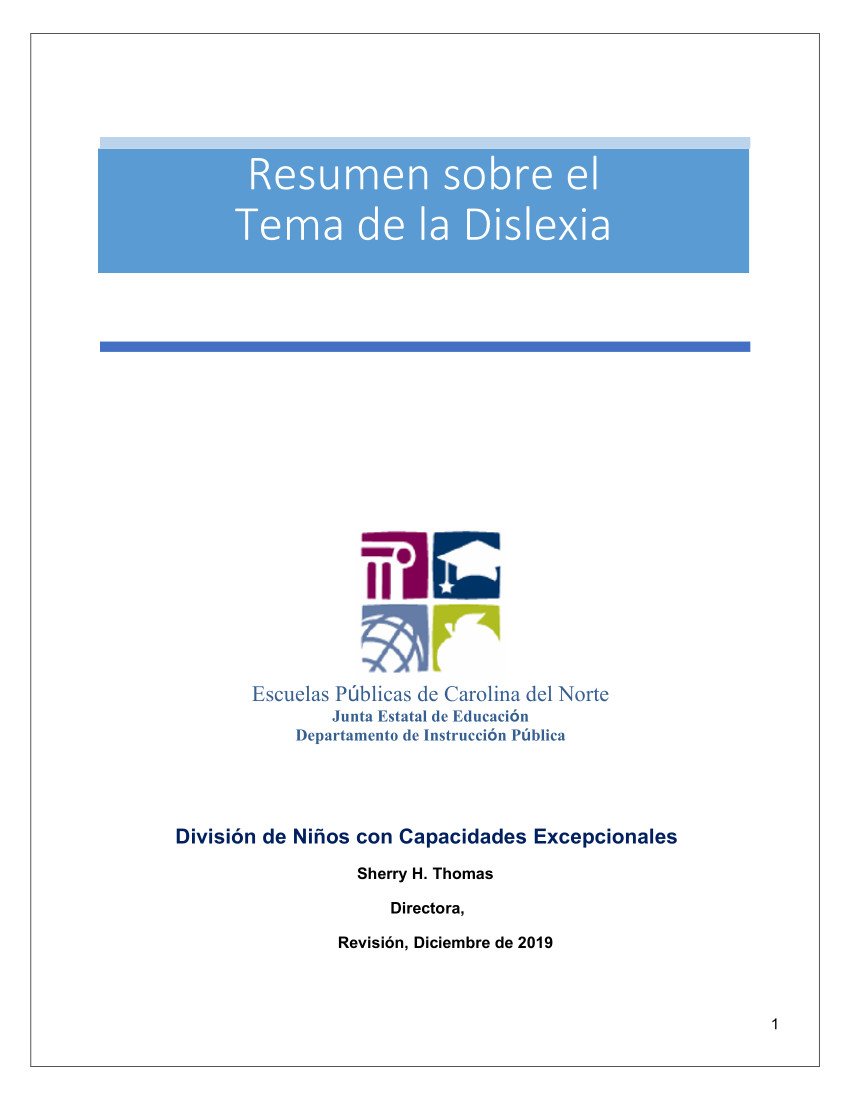
Resumen sobre el Tema de la Dislexia (Overview of the Topic of Dyslexia)
El propósito de este documento es brindar a las partes interesadas información acerca de la evaluación, identificación y educación de alumnos con dislexia en las escuelas públicas de Carolina del Norte.
Categories: Dyslexia, Learning Disability, Spanish, Special Education

Return to School Planning Guide
A Planning Guide for North Carolina Families Who Have a Student with a Disability
Categories: IEP, Special Education, Remote Learning
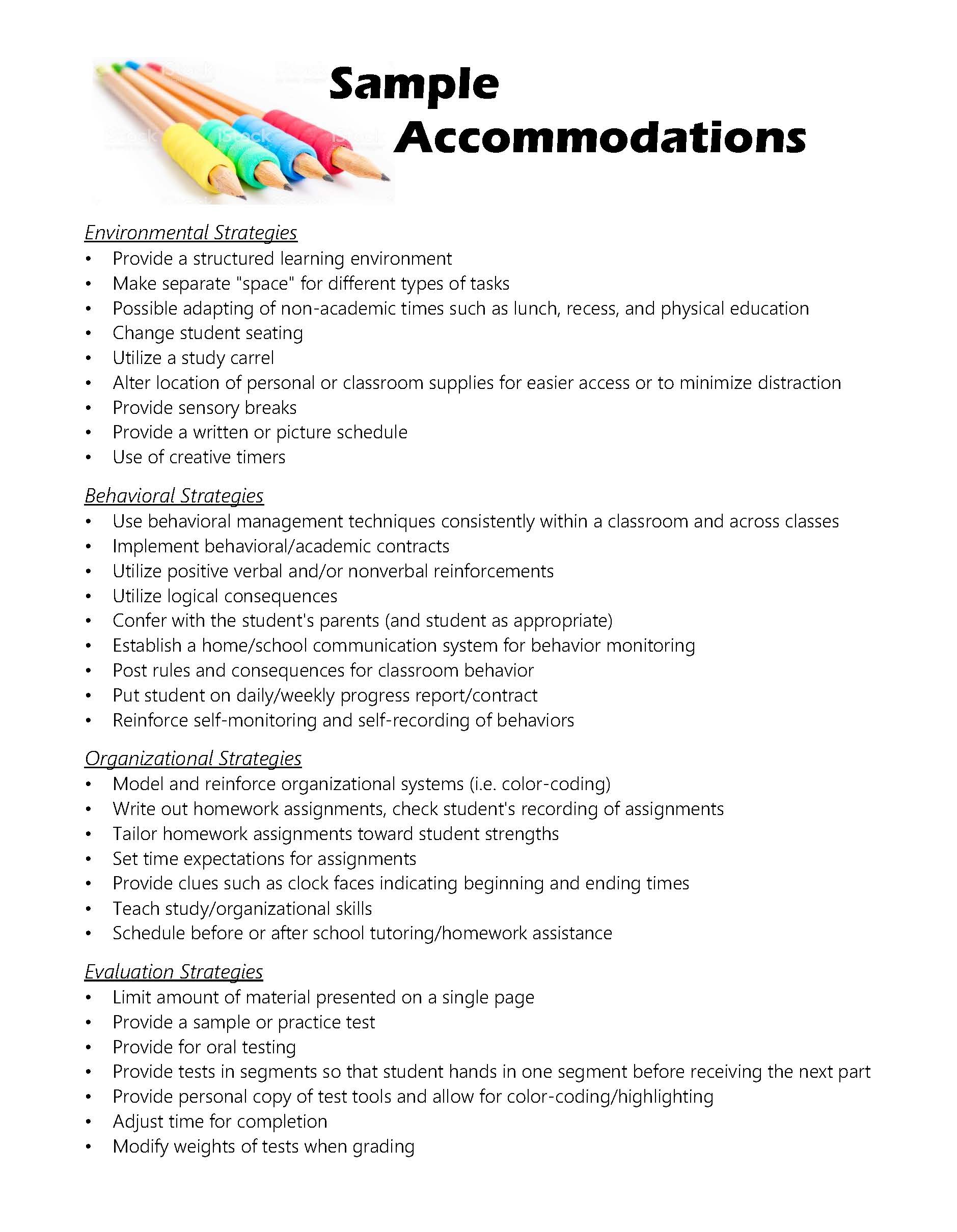
Sample Accommodations
This document provides Environmental, Behavioral, Organizational Strategies and more!
Categories: 504, Accommodations, IEP, Special Education
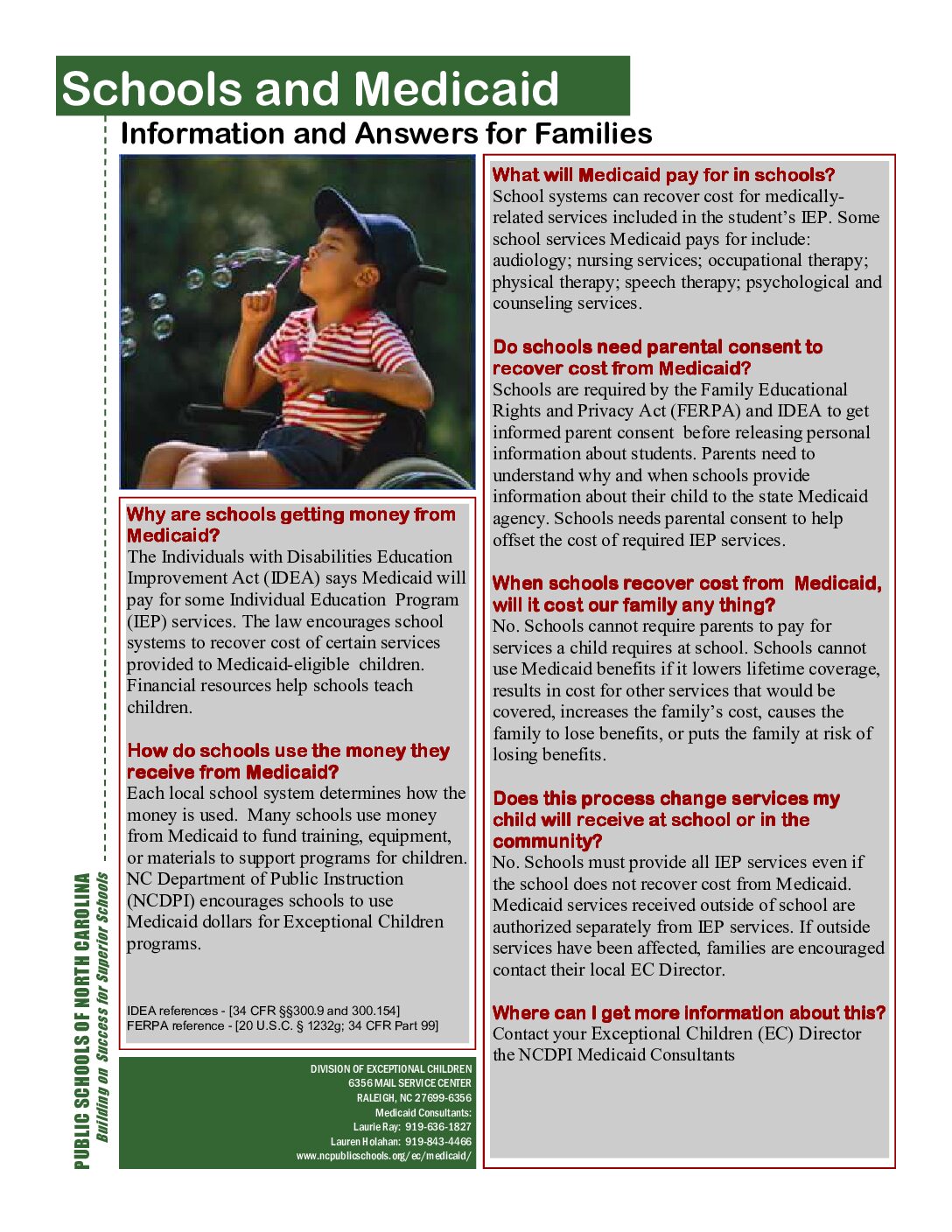
Schools and Medicaid - Information and Answers for Families
Categories: Medicaid and Medicaid Waivers, Special Education
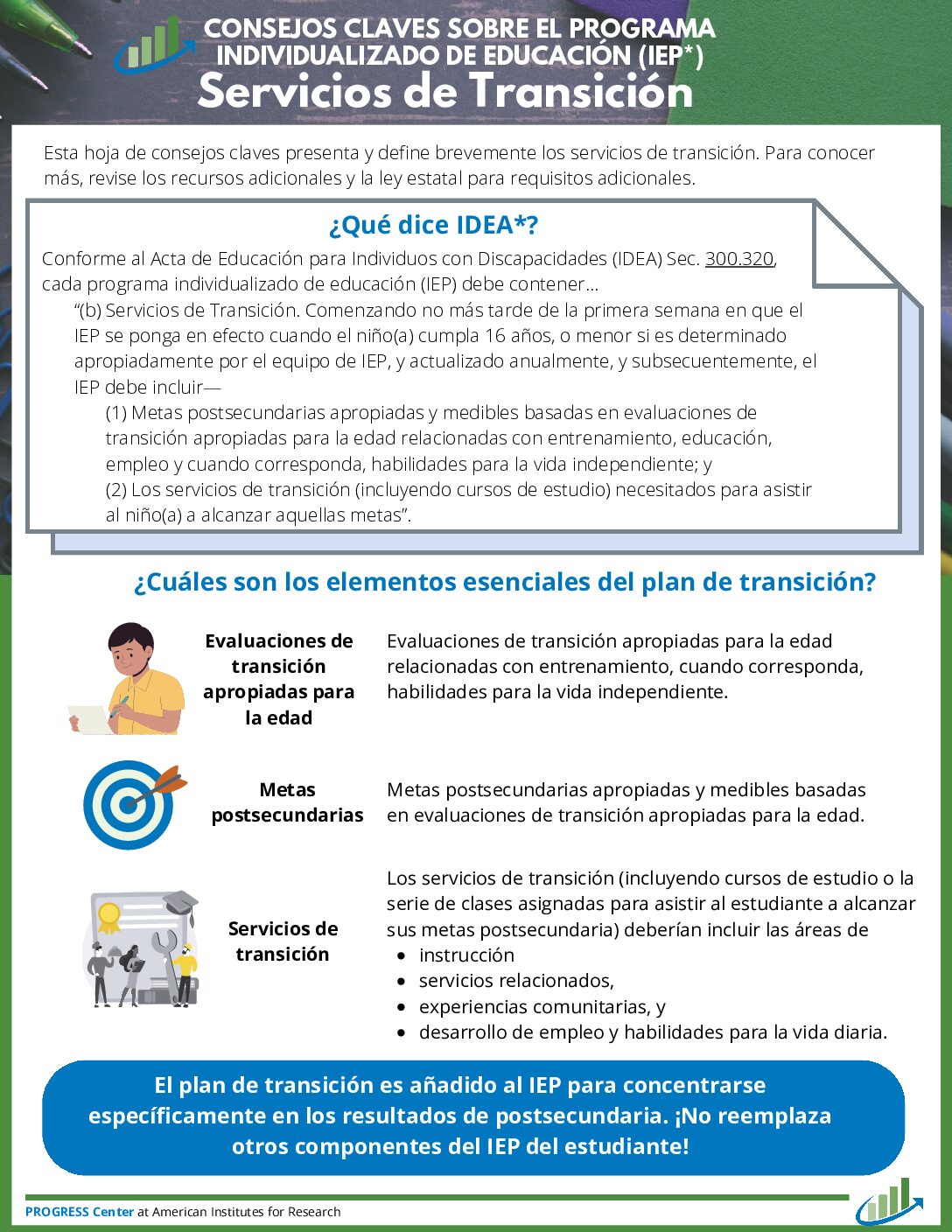
Servicios de Transición (Transition Services Spanish Version)
Categories: IEP, Spanish, Special Education, Transition to Adulthood, Transitions
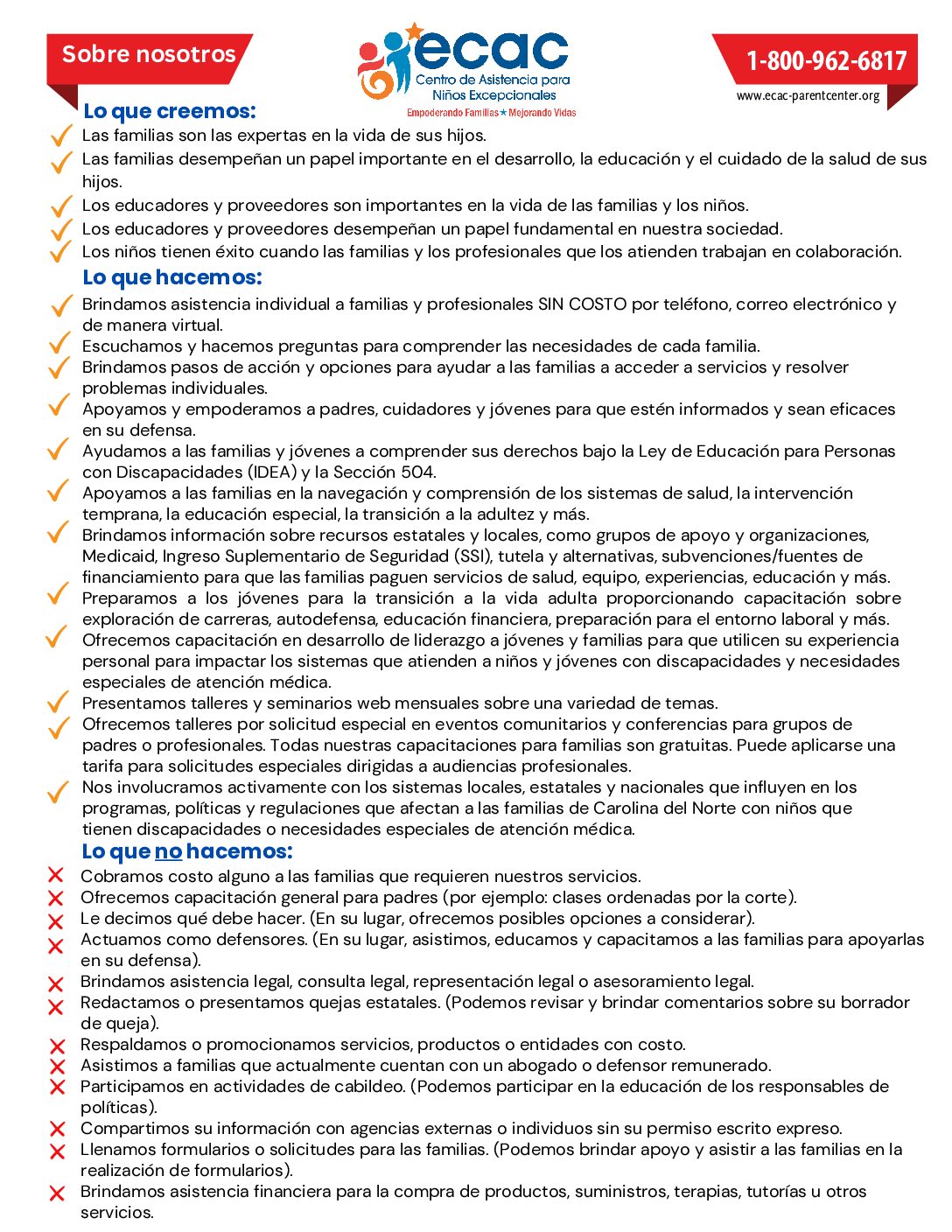
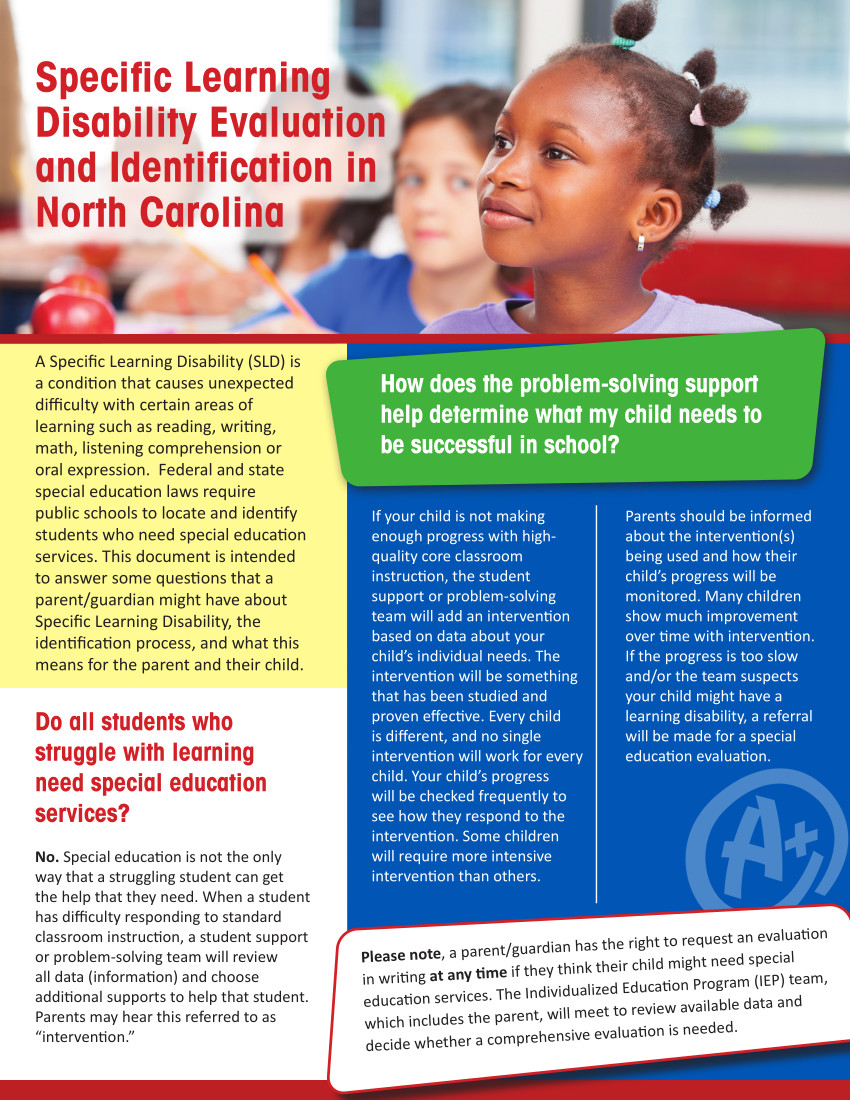
Specific Learning Disability Evaluation and Identification in North Carolina Fact Sheet
This document is intended to answer some questions that a parent/guardian might have about Specific Learning Disability, the identification process, and what this means for the parent and their child.
Categories: IDEA, IEP, Learning Disability, Special Education
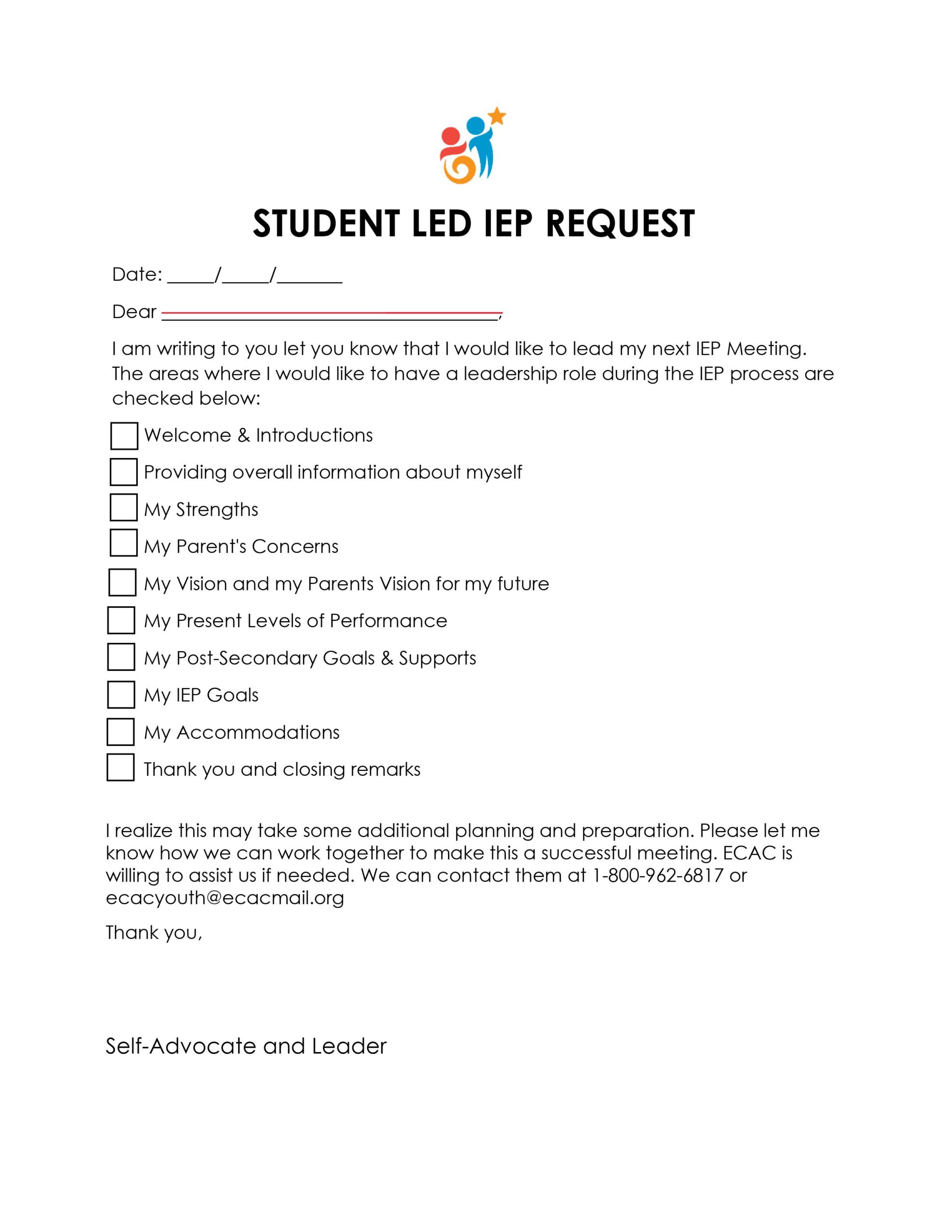
Student Led IEP Request
This fillable document helps students with disabilities request a leadership role in their next IEP meeting and to specify which parts of the IEP meeting they would like to lead.
Categories: Communication, IEP, Special Education, Transition-age Youth
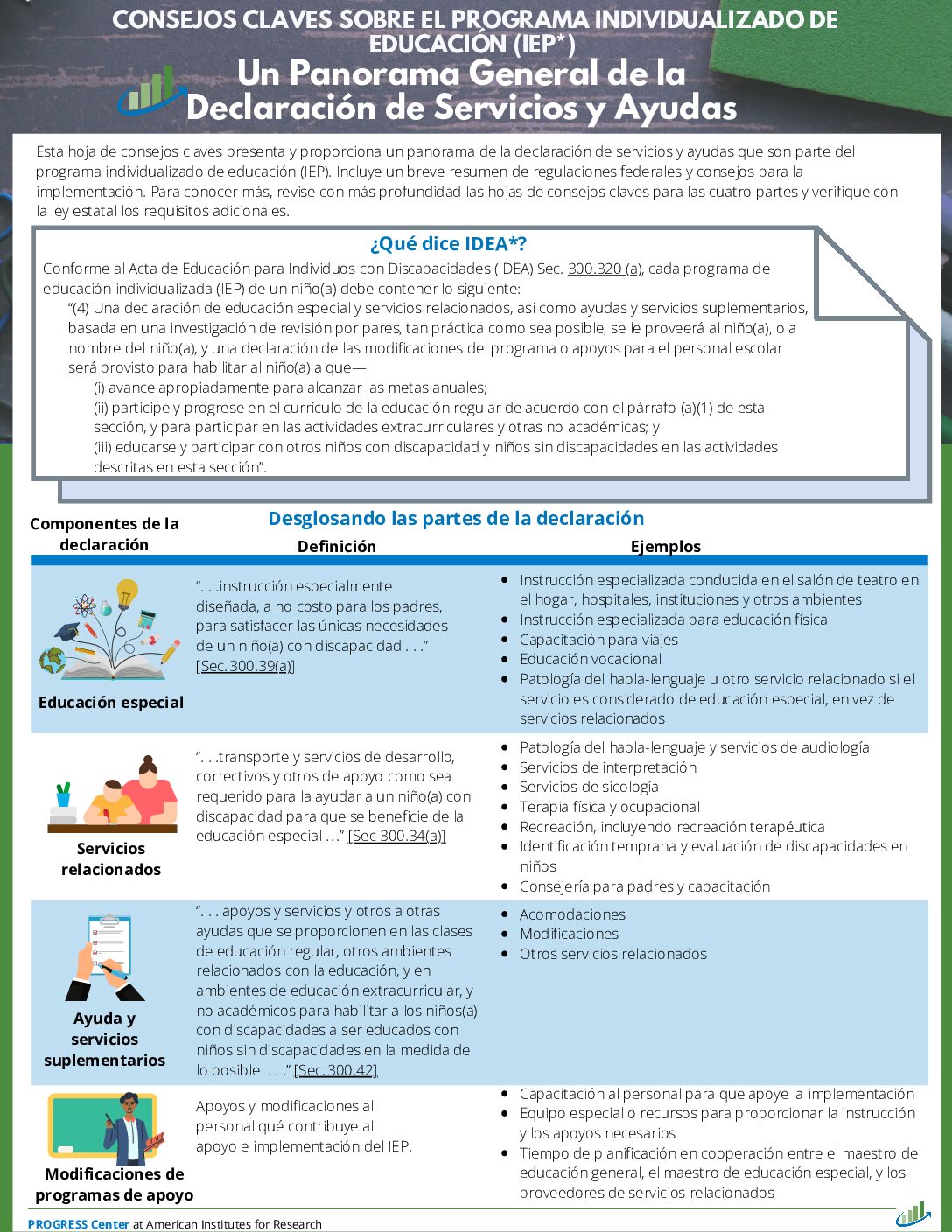
Un Panorama General de la Declaración de Servicios y Ayudas (Statement of Services and Aids Spanish Version)
Categories: IEP, Spanish, Special Education
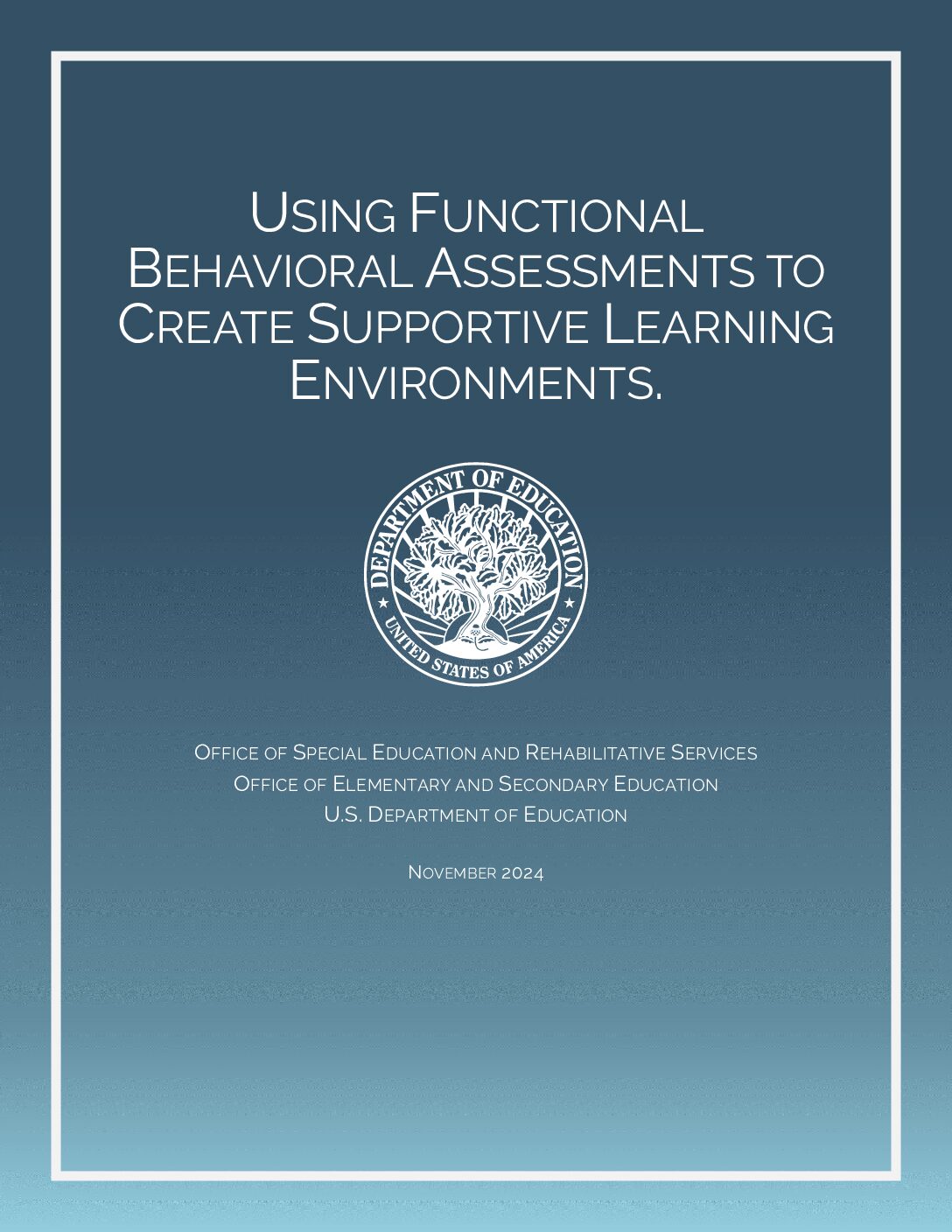
Using Functional Behavioral Assessments to Create Supportive Learning Environments
From the U.S. Department of Education - Using Functional Behavioral Assessments to Create Supportive Learning Environments, guidance to help schools and early childhood programs better support students’ behavioral needs. This guidance focuses on evidence-based practices to support students, with or without disabilities, whose behavior interferes with learning, and is part of the Department’s effort to reduce exclusionary discipline.
Categories: Behavior, Special Education
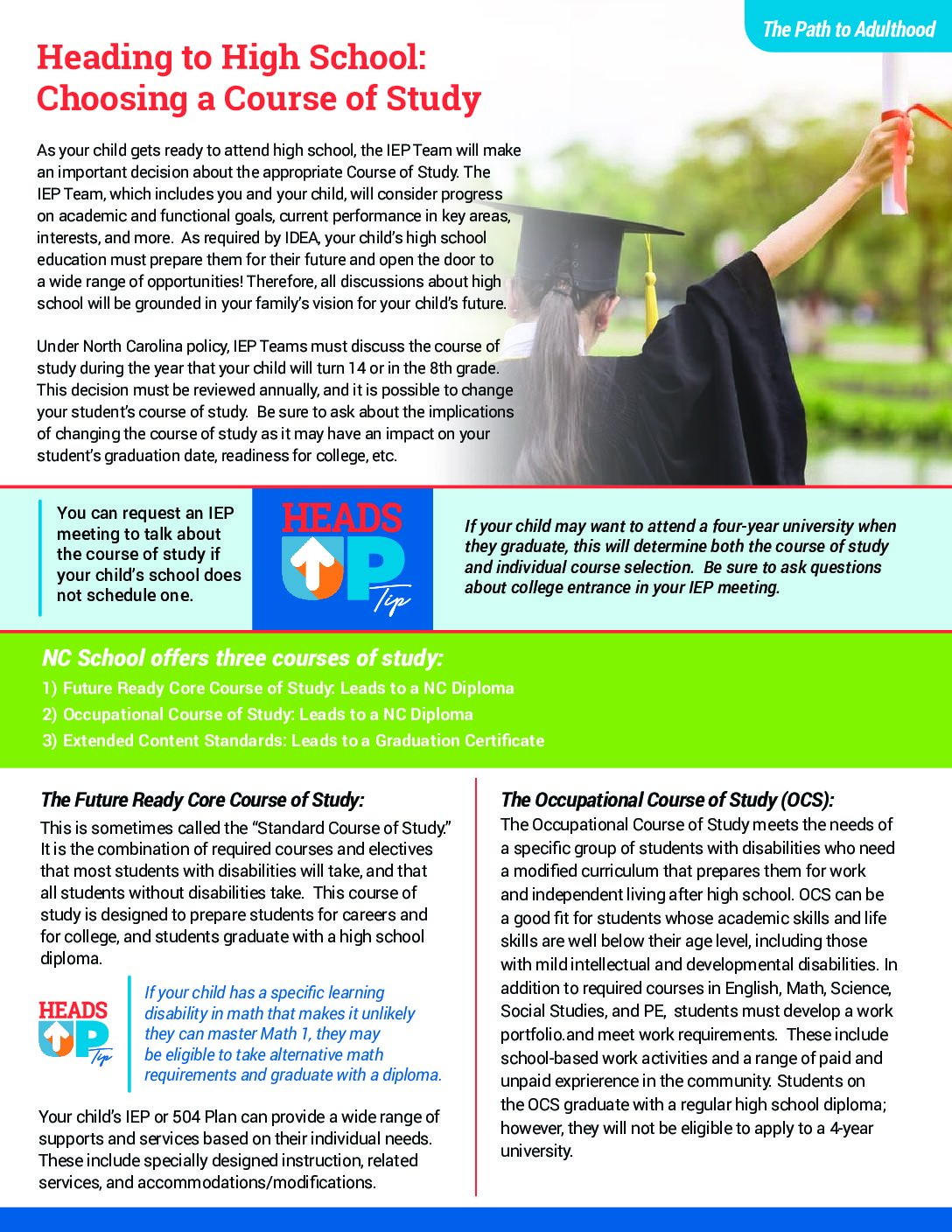
WAZE to Adulthood - Heading to High School: Choosing a Course of Study
Learn about choosing a high school course of study!
Categories: IEP, Special Education, Transition to Adulthood, Transition-age Youth
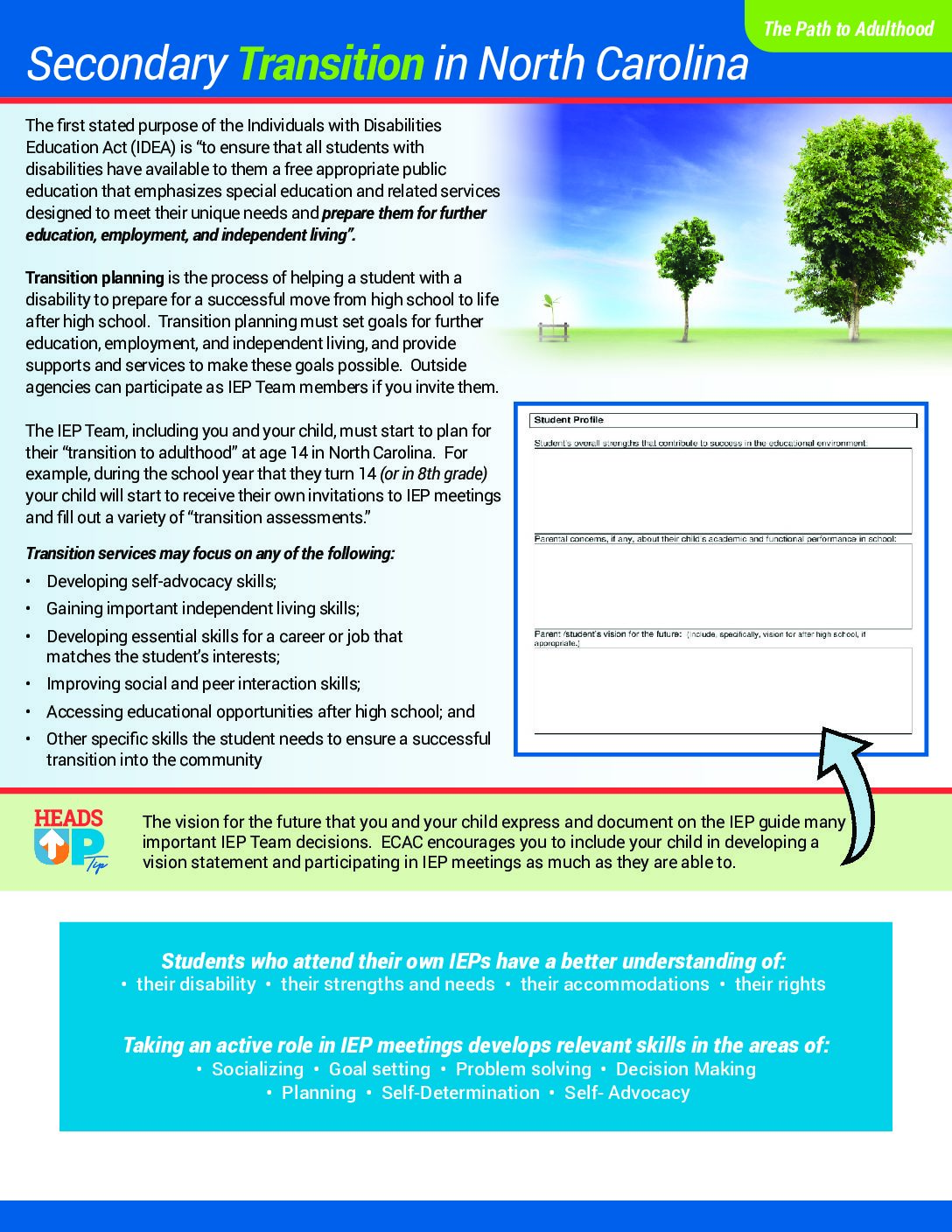
WAZE to Adulthood: Secondary Transition in North Carolina
Learn about transition planning and services in North Carolina!
Categories: IEP, Special Education, Transition to Adulthood, Transition-age Youth
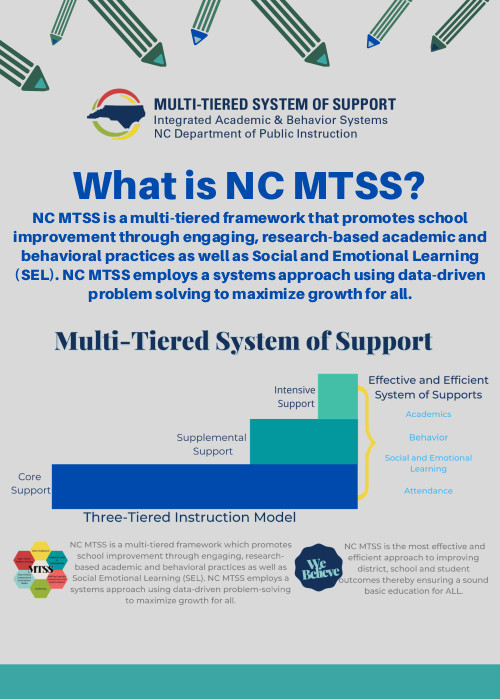
What is NC MTSS?
NC MTSS is a multi-tiered framework that promotes school improvement through engaging, research-based academic and behavioral practices as well as Social and Emotional Learning(SEL). NC MTSS employs a systems approach using data-driven problem solving to maximize growth for all.
Categories: Learning Disability, MTSS, Special Education
